The Ordo Templi Orientis Phenomenon
An Apeirogon
by Peter–Robert Koenig
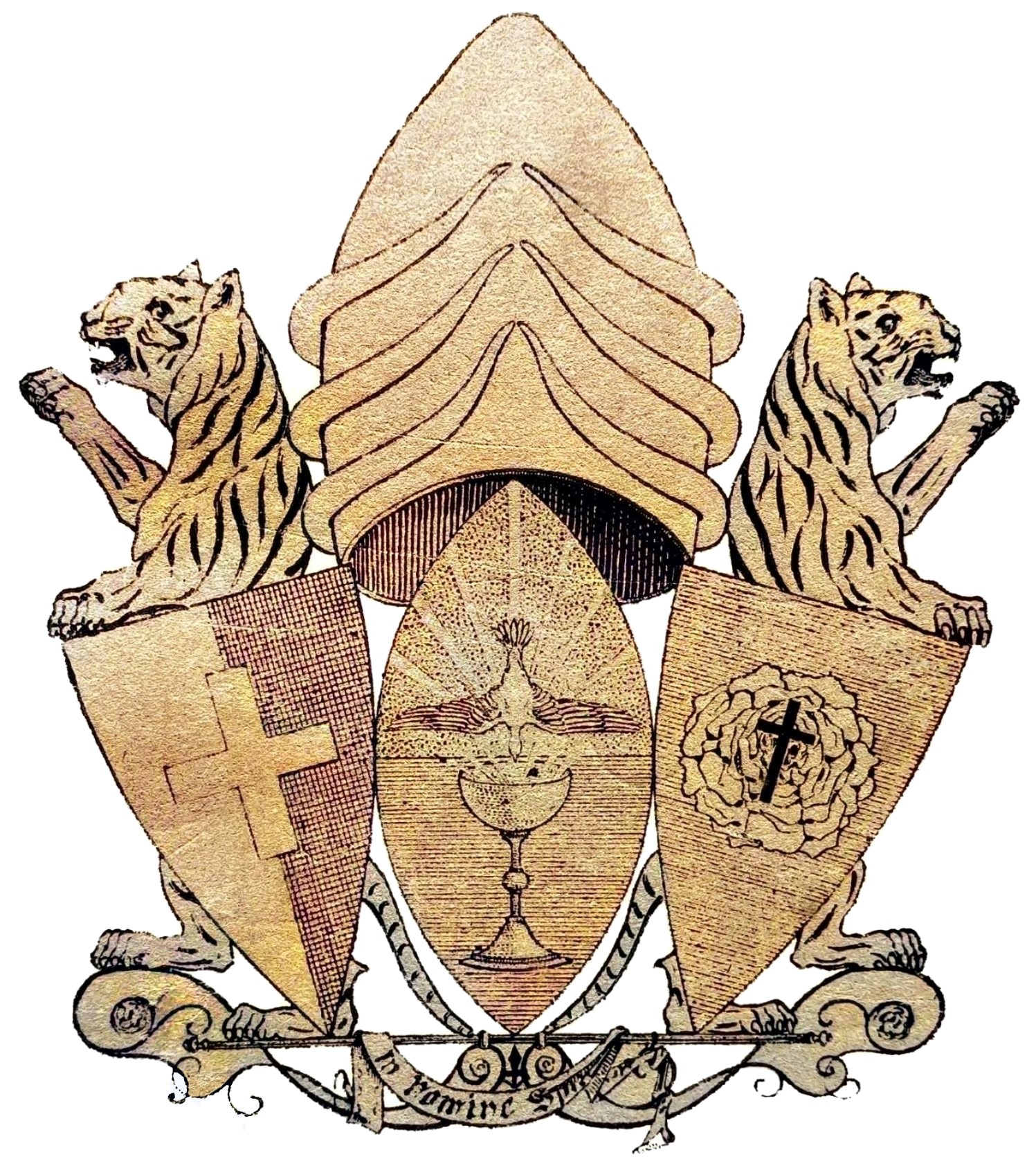
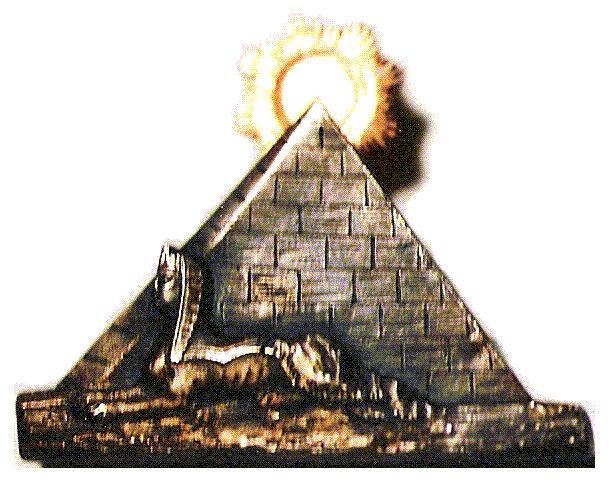
The Ordo Templi Orientis PhenomenonAn Apeirogon
|
|---|
Research FocusThis project investigates the psycho–sociology of the modern secret society Ordo Templi Orientis (O.T.O.) through comprehensive fieldwork, focusing on the behavior of its participants as well as their magical practices and rituals. Occultism is scrutinized with an occasionally wry lens, revealing its often ossified rituals, power struggles, and cultural codifications as a dynamic interplay between theatrical mysticism and commercial opportunism. Rather than introducing esotericism as a topic in itself, this study documents and discusses the conduct and belief systems of the involved parties. Often, the texts presented here resemble a collection of historical vignettes and anecdotes, occasionally marked by an uncritical reliance on highly subjective sources and broad–brush portrayals of key figures — a blend of provocation, self–mythologization, and theatricality. Sometimes, the contributions include illustrations and graphics serving to foster a critical distance and provoke reflection, with some of these images explicitly labeled as ‘AI-generated image.’ The phenomenon’s labyrinthine character reveals itself not only in the complexity of the inquiry but also in its modes of display — bound as books, staged as articles, and, inevitably, perpetuated on this website. This front page is complemented by the ever–expanding Latest Updates section. Esoteric practices are juxtaposed with broader societal phenomena, highlighting themes of alienation, exclusion, and the convergence of popular culture, science, and spirituality. Occultism emerges as a postmodern performance: a stage for identity crises and a mirror reflecting humanity’s obsession with extremes, from the grotesque to the sublime. As a reflection of the fragmented nature of the subject, the research foregrounds the inconsistency and subjectivity of its sources. Folkloric elements — often dismissed as mere tittle–tattle — are treated as integral to psycho–sociology and history, exposing the banal within the elite and the avant-garde within the ordinary. In doing so, it highlights the recurring tension between meticulous inquiry and the reductive sensationalism of tabloid journalism. All available puzzle pieces have been assembled, except for those constrained by legal criteria. 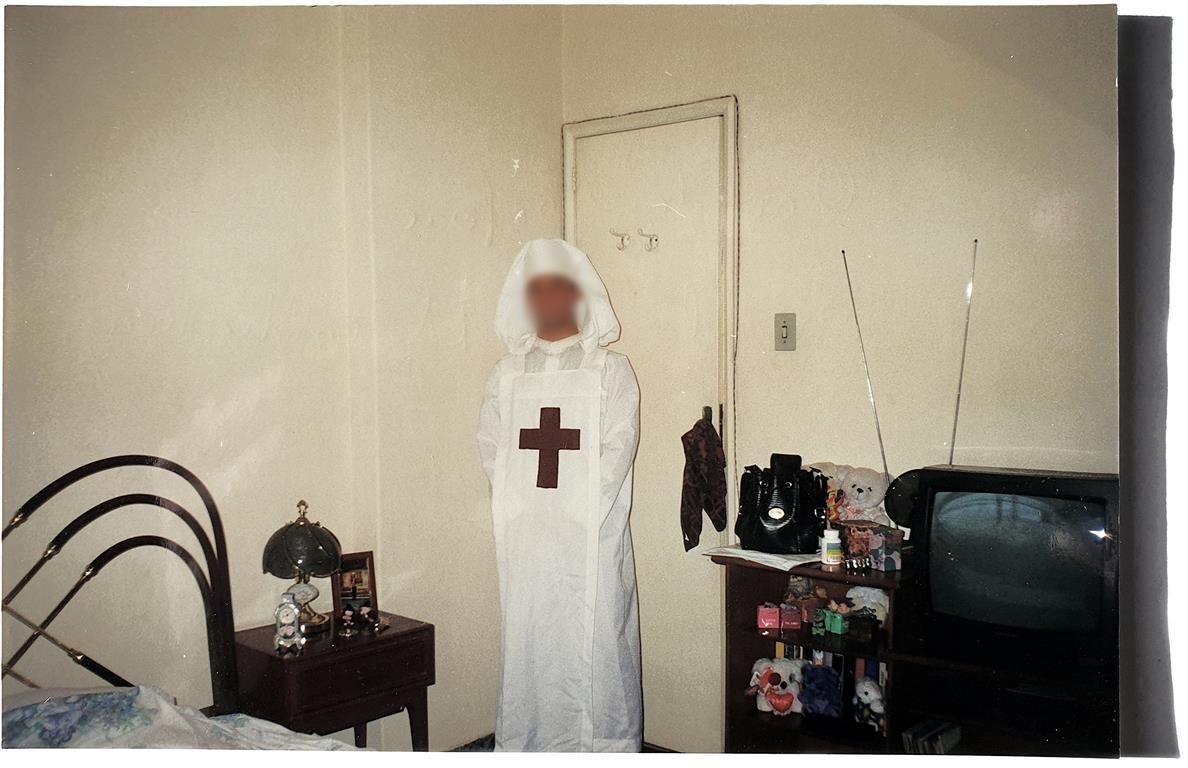
Cultural appropriationWestern Orientalism effectively began with the French translation of the "Thousand and One Nights" at the start of the 18th century. Soon anything even vaguely Oriental seemed to exude a magical, sensual appeal — an appeal closely tied to the romanticized notion of an unspoiled, exotic nature in distant lands. Nearly all Orientalist works contained erotic elements — often explicit — stemming from a widespread belief that in the Orient mores (and thus morals) were more relaxed than in Europe. Orientalism can be understood as a mode of thought that has been globalized since the 19th century, shaping not only perceptions of the Orient but also self–interpretations within it. Following Napoleon's campaign in Egypt and Syria between 1798 and 1801, Europeans were gripped with Egyptomania, inspiring many to visit and document the country's cultural treasures firsthand. During the colonial 18th and 19th centuries, Western scholars engaged with the cultures of the Indian subcontinent. British Orientalists translated Hindu scriptures in an attempt to comprehend their complexities. The advent of the telegraph and steamships in the 19th century accelerated communication between India and the West, facilitating the globalization of Hindu knowledge as travelers, researchers, and officials disseminated their findings through reports and publications. Like the cultural voids Nietzsche identified in Western civilization, gaps in European culture were often filled with imported customs, arts, philosophies, religions, and sciences. Within their own universe, modern occultists function as wandering encyclopaedias. It is quite state–of–the–art for them to plunder Ali Baba's coffers. The outcome is a construct of Western–influenced Egyptology and Orientalism, infused with elements from the Kabbalah and often interwoven with fabricated details. It was in just such a context that an Oriental Templar Order, the O.T.O., was concocted in 1906 by Theodor Reuss. He fashioned it from the symbols, rituals, and nomenclature of both regular and irregular Freemasonry in Germany. Seeing members dressed in period attire was, and still is, not uncommon. The letters O.T.O. (or OTO) stand for Ordo Templi Orientis. Neither the abbreviation nor the full name is exclusive to any single group. Since the O.T.O.'s inception, numerous organizations have appropriated its name, abbreviations, and acronyms, adapting them to their own interpretations, tastes and liking. Several rival groups now use the name Ordo Templi Orientis or O.T.O., some tracing their origins to the original — that is, the first O.T.O. — while others do not. Among those claiming lineage, only a few can genuinely assert continuity from the original O.T.O. founded in 1906. Across all iterations of the Ordo Templi Orientis, the question of lineage remains paramount, driven by the belief that the appointed leader serves as the vessel for the Order’s magical potency. Furthermore, this leadership rôle often entails control over various copyrights and royalties — most notably those associated with the literary legacy of Aleister Crowley, a central figure in the history of the O.T.O. The structure of most O.T.O. branches, much like Freemasonry, is based on a hierarchical series of initiations or degrees. These typically encompass around ten degrees, with some variations, as well as a so–called secret degree. The essence / secrets of the Ordo Templi Orientis and its variations lie in the higher degrees; strictly speaking, only members of these degrees are considered part of the O.T.O. proper. English version: Synopsis of Degrees. Traduction française: Synopsis des Degrés. 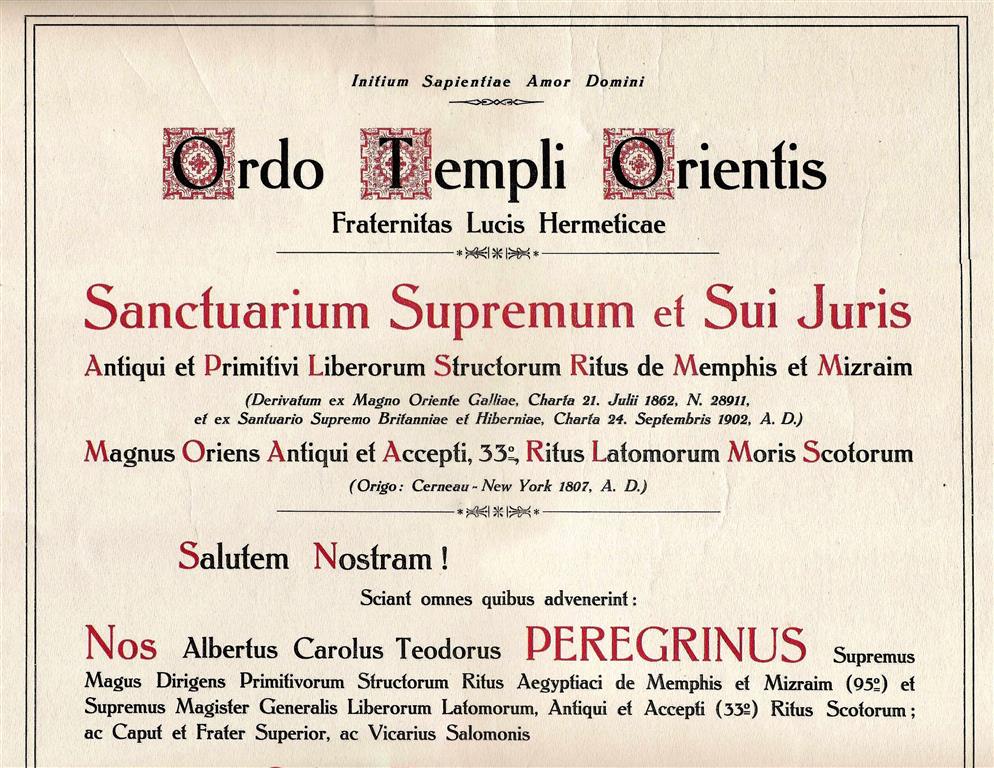
Religion As DecorationWhile the O.T.O.’s initiatory system resembles a Kafkaesque bureaucratic club game, it has a religious association as part of its framework: The Gnostic Catholic Church. In addition to tax advantages, religion supplies a marketable commodity that is always in demand: salvation. And it would seem that some O.T.O.–variations have strategically positioned themselves bulletproof in the context of the law in various jurisdictions. The technical term for a bishopric within the O.T.O. Phenomenon is Wandering Bishop or Episcopus Vagans. This designation is neither contingent upon character qualities, personal merit nor theological education or doctrinal authority. These bishops are neither elected by a canonical church nor ordained by a suffragan; they hold no historical episcopal see and are not consecrated through any recognized canonical procedure. A real bishop is not the successor of a single apostle; rather, the synod or college of bishops in toto collectively inherits the apostolic lineage. Consequently, no Wandering Bishop can claim legitimate apostolic succession. The Holy Ghost, it would appear, abstains from participating in these consecrations. 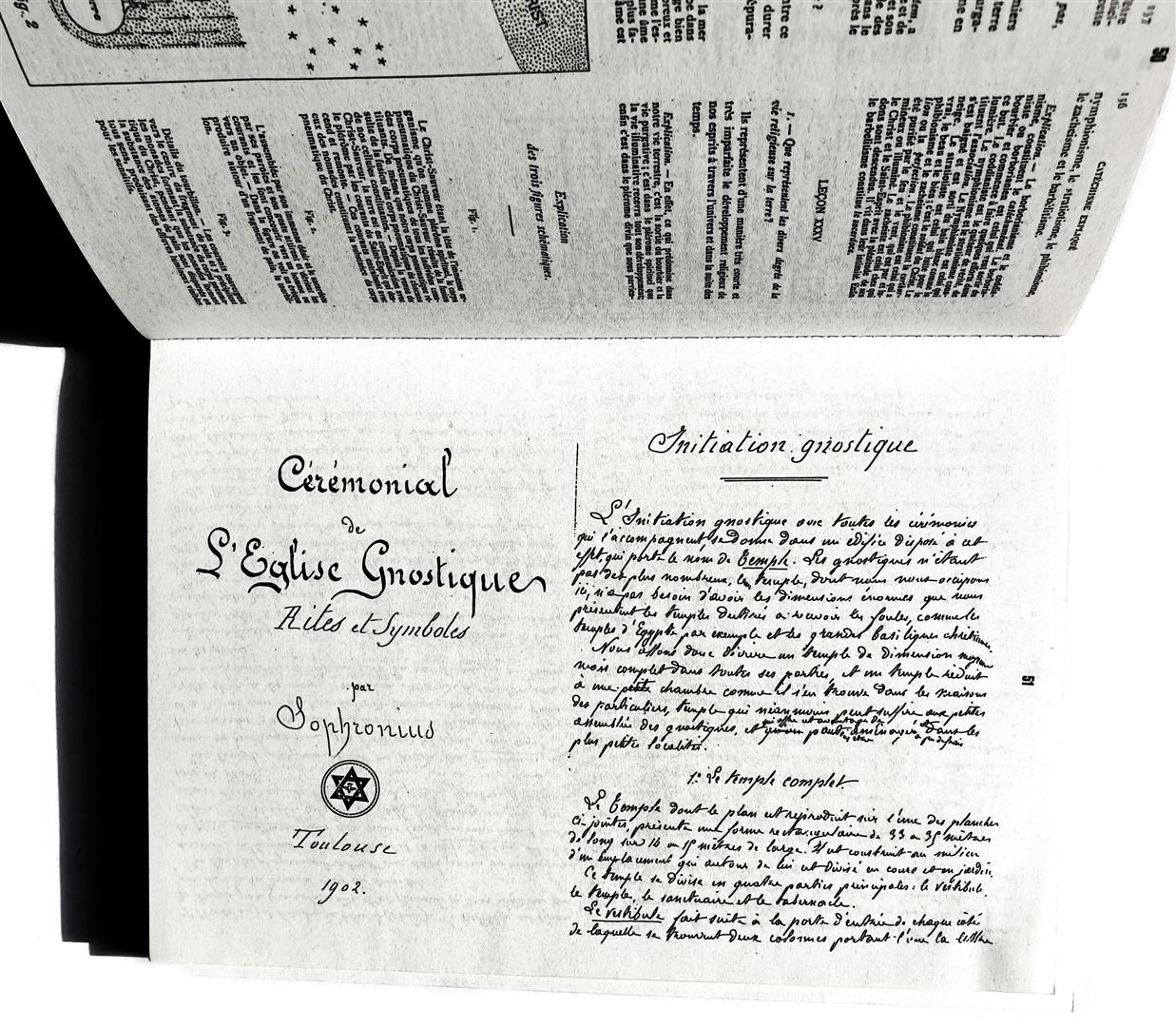
[See: 'Ecclesia Gnostica Catholica'] Their instrumentum consecrationis holds no apostolic legitimacy. Nevertheless, Wandering Bishops are devoted collectors of papers and diplomas, harboring the hope that at least one of their recorded consecrations has somehow taken. A more detailed examination of the practices and adherents of Gnosticism will follow in the subsequent sections addressing the Gnostic Churches. 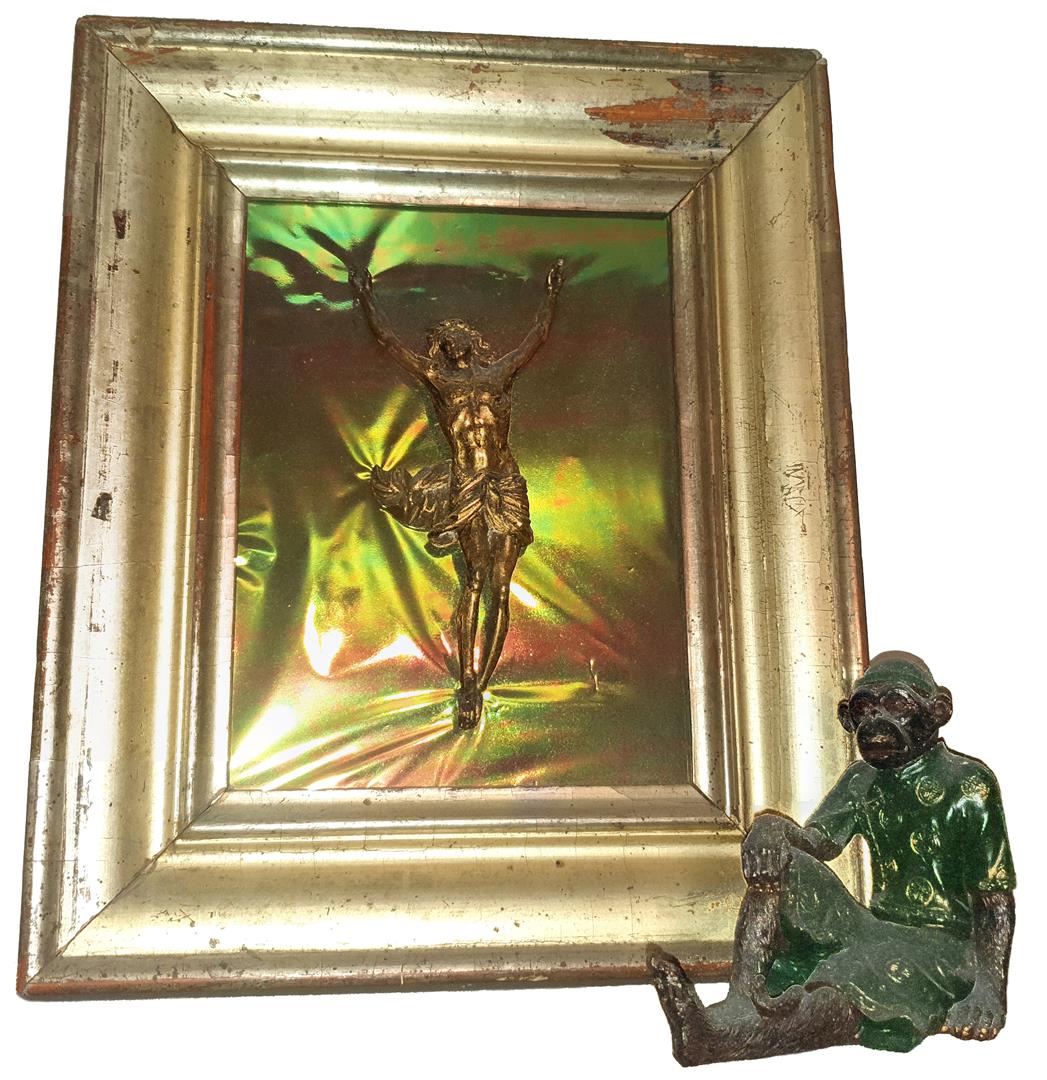
|
Discussions on the Nature of the O.T.O. PhenomenonCritical theories and cultural reflectionsThere are many critical theories, but I don't adhere to any single one — because, in the end, they all have their uses. I don't approach texts, ideas, or people as if they were patients. Rationality, after all, is highly subjective. Or, as Paul Karl Feyerabend, the Austrian philosopher of science, put it: Anything goes. The suitability of methods for thinking about occultism and esotericism is often judged by their results — though what counts as a result is another question entirely. As long as the insights remain discursive, innovative, and stimulating, even the most informal or unconventional approaches are not just permissible but necessary. Theories don’t drive evidence, nor should they. Analysis, then, is less about arriving at conclusions than about sustaining a dialogue between subject and researcher — one that can only ever yield provisional insights. Wayward ideas, however, can and should be viewed from wayward perspectives. Reading Paul–Michel Foucault, Roland Barthes, Jacques Derrida, Félix Guattari, and Gilles Deleuze, or venturing into the works of Georges Bataille, Antonin Artaud, Terence Sellers, Jean Barraqué, Hermann Broch, Alain Robbe–Grillet, Maurice Blanchot, and Comte de Lautréamont (Isidore Ducasse) will not harm you. Have you tried Jacques–Marie Émile Lacan? The Technology of Sex
[AI–generated image] SpermatophagyCertainly, spermo–gnosis and sex–magic tend to invite rhetoric that veers towards sensationalism and may sound alarmist, not to mention titillating. I have diligently strived to steer clear of these potential pitfalls. Nevertheless, it is essential to declare from the outset that the subject requires candor, and I have not hesitated to provide it. Sexuality emerges as a pivotal force in Gnostic traditions, oscillating between ascetic restraint and libertine indulgence, with both approaches channeling the divine pneuma to transcend earthly confines. Theodor Reuss arguably laid a sort of organized foundation (that is, a para–Masonic Order) for integrating sexuality and spirituality, introducing esoteric practices that would later be further radicalized. Aleister Crowley, who proclaimed that the mission of his sex–magical organization, the O.T.O., was "to restore Christianity to its real status as a solar–phallic religion," embedded sexual rituals within a framework of mystical transformation. These practices emphasized the concept of sperm as a carrier of the Logos, underscoring the gendered dimensions of salvation and its presumed divine potential. Rituals often reflected the enduring tension between ascetic and libertine orientations, embodying a dynamic interplay between restraint and indulgence in the pursuit of spiritual transcendence. Spermo–Gnostics and the Ordo Templi Orientis — Introduction to the Ascetic and Libertine Gnostics, or The Erotization of Misery.
Clément de Saint–Marcq: The Eucharist, 1906. "The Eucharist" explores the historical, theological, and esoteric dimensions of Christian faith, particularly its central sacrament. Saint–Marcq argues that religious knowledge, while framed as sacred tradition, often contains hidden meanings accessible only to initiates. He links Christianity’s origins to broader mystical traditions, controversially associating the Eucharist with ancient theophagic practices. Its transformation from an esoteric mystery into the public ritual of the Catholic Mass, he contends, represents an institutional cover–up of original sacred truths. He critiques transubstantiation as an untenable dogma, suggesting that the Church’s suppression of deeper meanings has contributed to its decline. Saint–Marcq’s discussion aligns with esoteric interpretations later echoed by Theodor Reuss, particularly regarding the religious aspect of the O.T.O. Reuss asserted that "The Eucharist" concealed the ultimate initiatory secret: the ingestion of seminal fluid was believed to facilitate the internal manifestation of Christ within the individual. This doctrine positioned spiritual regeneration and divine communion as independent of traditional procreative rôles, negating the necessity of women in this mystical framework. The engagement of the Neo–Gnostics with their favorite topic came through the romanticized lens of 19th and early 20th–century esotericism, which often reinterpreted Gnostic ideas rather than adhering to historical accuracy and scientific analysis. In some places, such an approach is even explicitly rejected. The text below extends the previous research on Spermo–Gnosis and the O.T.O., examining the sex–magical and Gnostic practices shaped by Arnoldo Krumm–Heller and Ernst Christian Heinrich Peithmann, with reference to foundational texts such as the Pistis Sophia. Central to these doctrines is the symbolic rôle of sexual secretions as metaphysical substances, with semen often regarded as a vessel of divine energy, while femininity is marginalized. Peithmann's Gnostic Catechism elaborates on these principles, advocating ascetic practices — most notably the avoidance of ejaculation — as a means of spiritual redemption, in contrast to the libertine interpretations found in Theodor Reuss’ "mandatory reading for O.T.O.–Members". Similarly, Krumm–Heller promotes a Christian–ascetic Gnosis, rejecting Crowleyan excess in favor of spiritual discipline. Peithmann’s Gnosticism articulates a radical rejection of the material world, depicting nature as an illusory force that entraps the soul in cycles of reincarnation and corporeal servitude. His theology centers on asceticism, particularly sexual abstinence, conceived as a direct challenge to the demiurge’s dominion, while simultaneously advancing a spiritualized notion of sexual energy transmutation. Though informed by classical Gnostic sources, Peithmann constructs an independent cosmogony, integrating elements of early Christian heresies with mystical techniques resembling Hatha Yoga. His critique of the O.T.O. as “without value” reflects his opposition to its libertine sexual doctrines, instead advocating a strictly ascetic path. Despite his condemnation of procreation, he paradoxically acknowledges the necessity of male–female polarity in spiritual redemption. His reliance on earlier Gnostic systems, particularly French neo–Gnosticism, underscores his doctrinal synthesis, yet his ambiguous stance on libertine rites leaves open the question of whether he merely reports on or tacitly endorses such practices. Ultimately, Peithmann’s worldview is characterized by radical dualism, esoteric Christianity, and an emphasis on sexual energy as the key to spiritual liberation. By contrast, Chevalier Le Clément de Saint–Marcq's "L’Eucharistie" exemplifies a libertine perspective, interpreting the consumption of sperm as a sacramental act in which semen embodies the divine Logos. The Pistis Sophia, a foundational text for Krumm–Heller, underscores spiritual ascent through the reconciliation of dualities, distinguishing his moderate, integrative approach from Crowley’s extremes. In the end, both Krumm–Heller and Peithmann advocate a Gnostic practice grounded in balance and asceticism, setting their work apart from the libertine interpretations found in the teachings of Reuss and Crowley.
The Secrets of the O.T.O.–groups. Some Gnostic and magical ideas often spiral into ritualistic excess, fixating on bodily fluids and euphemized sexual choreography. While some O.T.O.–inspired groups devolve into personal fetishes cloaked as universal truths, others within this esoteric sphere offer entirely different interpretations of these themes. In this light, both fascination and absurdity become visible: occultism reveals its gravitational pull toward sexual symbolism until even the most private excretions are exalted as sacraments. The risk is always that scandal overshadows substance, with extravagant claims resting on diaries and speculation rather than established practice. The account unfolds with a wealth of detail, close engagement with sources, and a critical tone that exposes the uneasy tension between lofty doctrine, eccentric practice, and modern reinterpretation. What emerges is a picture of occultism gravitating with irresistible force toward sexual symbolism, until the sacralization of bodily fluids appears less like an esoteric key than a fixation in search of cosmic justification. The result is a curious reduction of the grand mystical edifice into a monomania of fluids — semen exalted as elixir, menstrual blood recast as sacrament, Eucharistic cakes conjured from a kitchen of dubious alchemy. Other dimensions of esoteric philosophy are pushed to the margins, overshadowed by this peculiar obsession. Modern gestures toward historical nuance, shifting notions of gender, or symbolic reinterpretation enter only as side notes, scarcely enough to counterbalance the sticky weight of tradition. What remains is less a balanced history than an act of deliberate deconstruction: a cabinet of curiosities — part revelation, part fetish, part fiction — where myth, ritual, and grotesque performance stand side by side, fascinating and tinged throughout with unintended spectacle. Modern perspectives on identity and transgenderism further complicate these doctrines: when the sacralized phallus itself becomes negotiable, entire systems built on its cosmic indispensability risk collapsing into a theatre of improvisation, where revelation must suddenly share the stage with gender fluidity, and the once–stable mysteries look more like eccentric dress rehearsals for a play no one agreed to script. Aleister Crowley's 'Gnostic Mass' includes a Cake of Light which incorporates the Logos and is prepared using certain ingredients including bodily secretions. This Cake is not intended for transubstantiation but to contain a deity called the Childe, specifically an aspect of Horus, the Egyptian God of the Sky. The cake is transmuted by digestion, not through transubstantiation, making it a sex–magical medium for the participant's will. Consumption or bodily contact with the host is necessary for transformation, unifying the host with its consumer, unlike the Roman Catholic host, which changes its invisible essence without changing appearance or chemical qualities. 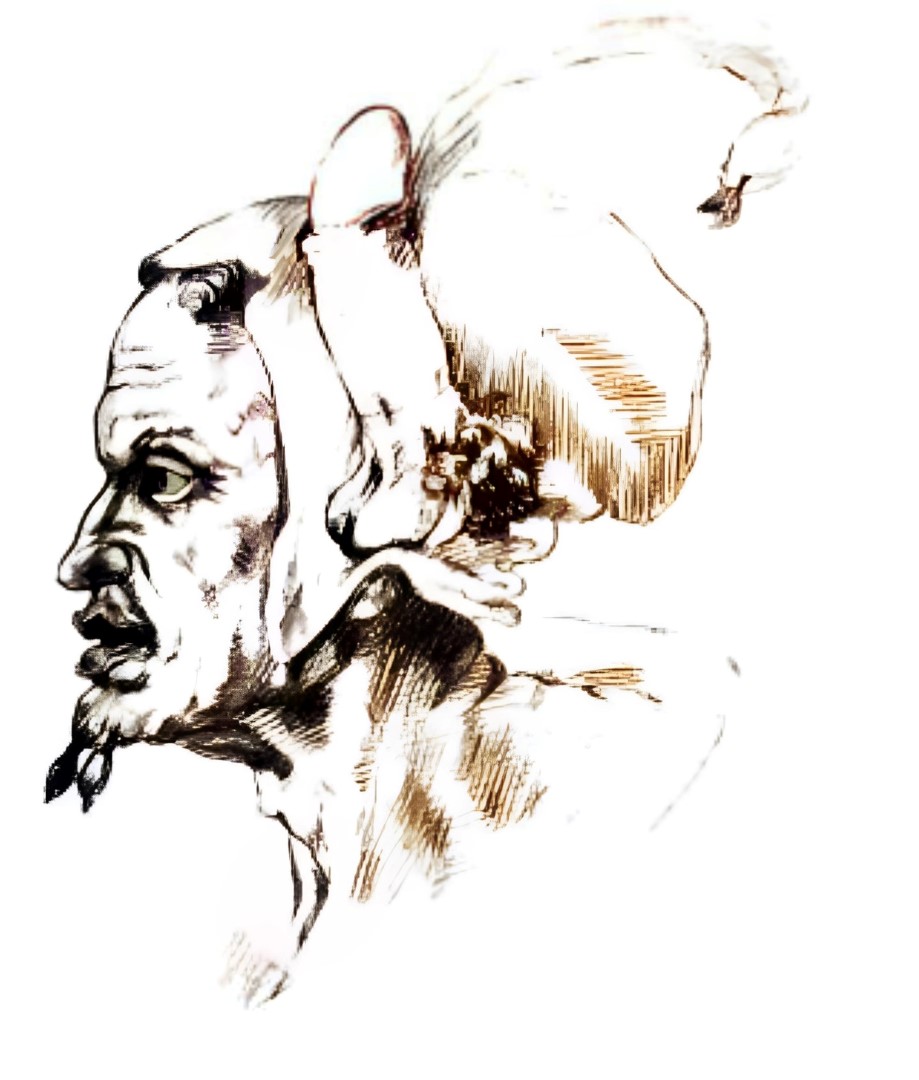
In the 1970s, the occult community embraced a heightened level of sexuality involving a variety of partners. This not only created but also reinforced the stereotype about occultists that persists to this day, shaping how some individuals define occultism. During that era, many embarked on a social experiment of extended proportions, likening it to a form of religion and using sex as its raw material. A significant emphasis was placed on individuals' autonomy, encouraging the freedom to engage in whatever they desired. The expression of sexuality underwent a transformative shift from being carried out furtively to becoming a celebratory manifestation, embodying the newly liberated attitudes towards occultism. The moment sex became available to everyone at a mouse–click, the power of discourse (to borrow Foucault's term) of those who constructed a truth–producing apparatus around sexuality, also crumbled. Further discussion on the practices and adherents of Gnosticism will follow in the later sections addressing the Gnostic Churches. For now, however, the focus will shift to broader reflections on the general nature of key figures within the O.T.O. and their historical foundations. These protagonists will then be explored in detail in the subsequent sections. 
Psychosocial and cultural study of the O.T.O.The McDonaldisation of Occulture. The present article, dating back to 1997 (and partly written in Ronda, Spain, in the same house where Rainer Maria Rilke once stayed), investigates the utilization of calculability and quantifiability as evaluative criteria by secret societies such as the O.T.O. Specifically, I examine the degree to which the American O.T.O. has adopted a supermarket–style approach characterized by McDonaldization in its organizational structure and practices. Furthermore, this concept is contextualized within the burgeoning realm of the internet, elucidating the potential implications of these developments on the nature and function of secret societies in contemporary society.
Aura of the O.T.O. Phenomenon. 2000. The modern O.T.O. is portrayed as a conversation piece — an object of intrigue rather than influence — whose relevance is maintained through spectacle rather than substance. The essay deconstructs the organization’s claims to esoteric authority, revealing a pattern of myth–making, censorship, and ritualized control that insulates it from external critique while rendering it increasingly irrelevant in broader cultural and intellectual contexts.
Halo of Flies. This article, originally published in Richard Metzger's "Book of Lies" (2003), characterizes the 'Caliphate' O.T.O., as a commercialized occult organization cloaked in spiritual pretenses and rigid conformity. It portrays Thelema, Crowley’s doctrine, as a derivative, pseudo–rational framework that prioritizes manipulation and consumerism over genuine inquiry or transformative philosophy. The group’s hierarchical structure fosters a Borg–consciousness, enforcing dogmatic loyalty to Crowley and suppressing individuality through bureaucratic rituals likened to Kafkaesque systems of control. The 'Caliphate’s' commercialization of Crowley's legacy, through royalties and copyright enforcement, underscores its economic motivations beneath a façade of esoteric teachings. Ultimately, this O.T.O. is depicted as a performative and commodified "McOccultism", sustaining relevance through spectacle rather than substance. Phantoms of the Paradise (2005). The Ordo Templi Orientis originated as a pseudo–Masonic organization in 1906 under Theodor Reuss and was later reshaped by Aleister Crowley to propagate his Thelemic philosophy. Crowley’s association with the order led to tensions with Reuss, culminating in Crowley declaring himself the Outer Head of the Order (O.H.O.) in 1921. Following Reuss's death in 1923, disputes over leadership fragmented the organization, with multiple claimants, including Grady Louis McMurtry, staking claims to legitimacy. McMurtry’s faction, later called the 'Caliphate', rebranded itself as the official (modern) O.T.O. and consolidated power through legal victories over Crowley’s copyrights, transforming into a financially–driven entity centered on publication rights. Despite its claims of orthodoxy, the 'Caliphate' faced criticisms for commercializing occult teachings and incorporating Christian–inspired rituals, creating a hybrid structure far removed from Crowley’s original esotericism. Ultimately, the modern O.T.O. reflects a fractured legacy, balancing occult traditions, legal battles, and commercial ambitions while sparking debates about authenticity and spiritual continuity. Anonymous 2021: Burning Down The House. The article is based on anonymous sources from within the modern O.T.O. It highlights systemic failures, including hierarchical power imbalances, mishandling of abuse allegations, and resistance to inclusivity reforms, revealing the Order's struggle to modernize its esoteric traditions while maintaining authority. The text scrutinizes leadership practices, particularly those of the current leader, William Breeze, depicting him as consolidating power through modifications to oaths and the exclusion of rival lineages, thus transforming the Order into a system of personal rule. Furthermore, it connects the O.T.O.’s political entanglements — especially James Wasserman’s alignment with far–right movements during Trump’s first stint as president — to internal rifts and public criticism, deepening its identity crisis. Ultimately, this article portrays the O.T.O. as a relic of outdated occultism, whose attempts at modernization have instead alienated members, eroded legitimacy, and left it teetering between irrelevance and infamy. Playgame of an O.T.O.–Fatamorgana 2011. The article explores the controversial membership of the O.T.O., through academic research and statistics. It discusses the renovation of the statistics, noting that little is known about the entire membership. It also touches on the rôle of AIDS within the organization, as well as the presence of AIDS–denialists as members of the Cabinet of the 'Caliphate'. Additionally, the article examines the suicide rate among members and explores the process for gaining entry into the Sovereign Sanctuary of the Gnosis, the O.T.O.'s innermost circle. It also discusses censorship and the media's coverage of the O.T.O., as well as the issue of name–dropping within the organization.

Fetish, Self–Induction, Stigma and Rôleplay. 2011. The O.T.O. has a controversial history, and it has been linked to several allegations of misconduct. Individuals who participate in O.T.O. rituals or practices may, therefore, face potential risks stemming from the organization's history or reputation. It is worth noting, however, that this article does not concentrate specifically on negative effects. Rather, it provides an analysis of the use of fetishism, self–induction, stigma, and rôleplay in the context of O.T.O. rituals and practices.
Gaps in the Script of Esotericism: Hypocrisy and Hypercrisis — Oscar Wilde: Ambition is the last resort of failure. 2012. Religious affiliation has influenced academic research throughout history, with numerous scholars shaping their work to align with or legitimize their personal beliefs. Examples include Carl Schmitt ("Political Theology", 1922), who linked sovereignty to theological concepts; Immanuel Velikovsky ("Worlds in Collision", 1950), who sought to reconcile biblical events with scientific theories; and Georges Lemaître (1927), whose "Big Bang Theory" was sometimes framed in relation to Christian creation narratives. In esoteric studies, researchers are often either sympathizers or critics of the movement they study, leading to biases in both directions. A common methodological issue is the selective omission of inconvenient facts, allowing scholars to construct a favorable narrative by curating sources. Academics who are also members of the O.T.O. have a clear incentive to present the organization in a positive light. Such scholars often adopt an academic stance that frames the O.T.O. as a "Western mystery tradition" or "spiritual system" rather than an obscure occult order. Scientific neutrality in such contexts is frequently an illusion, as authors tend to downplay or reinterpret critical aspects when writing about their own religious affiliations. Controversial topics such as ritual sexual practices, authoritarian structures, or Crowley’s problematic history — including racism, drug addiction, and allegations of abuse — are often ignored or dismissed as "misunderstandings". The ultimate goal is to integrate the O.T.O. into the academic study of religion, lending it credibility and mainstream legitimacy, making these scholars function more as an "academic PR division" than as neutral investigators. In the realm of academia, scholars, preoccupied with their interpretations of archived knowledge, form insular communities. Occultists disguise themselves as scholars, and vice versa. Laypersons, adept at employing langue de bois rhetoric, gravitate towards their preferred online platforms. A culture of self–affirmation prevails, accompanied by a chorus of indignant condemnation directed at others. 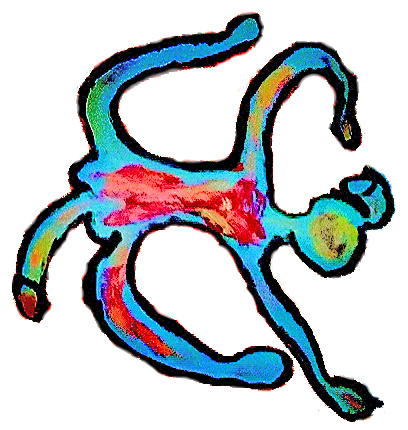
The Creative Power. 2017. The text explores the mystical and alchemical creation of artificial life, contrasting the Jewish Kabbalistic Golem with the alchemical Homunculus, particularly through the perspectives of medieval Jewish scholars, Paracelsus, and later occultists. The Golem, rooted in the Sepher Yetzirah, is linked to divine creation, requiring ecstatic states to animate it, whereas the Homunculus, per Paracelsus, is a product of alchemical putrefaction and astrological timing. The concept evolved in European occultism, with Goethe’s Faust and later figures like Crowley incorporating it into magical and sexual rites, blending it with esoteric doctrines of reincarnation and divine usurpation. The theme also pervades literature, from Mary Shelley’s Frankenstein to early 20th–century occult fiction, reflecting anxieties over artificial life and divine power. The Saturnian lodges and occult orders reinterpret the concept in egregoric terms, seeing artificial beings as magical constructs fed by collective energy, aligning with notions of divine self–creation. The O.T.O. and similar orders emphasize the sexual–mystical transmission of power, attempting to embody magical potency in individuals or astral beings, often mirroring psychological structures of authority and dependency. Ultimately, the study characterizes these esoteric practices as psychological constructs shaped by unresolved paternal projections, highlighting the intersection of magic, power, and identity within Western esotericism. Keywords: Paracelsus, Ordo Templi Orientis, Baphomet, Egregor, Fraternitas Saturni, Theodor Reuss, Hanns Heinz Ewers.
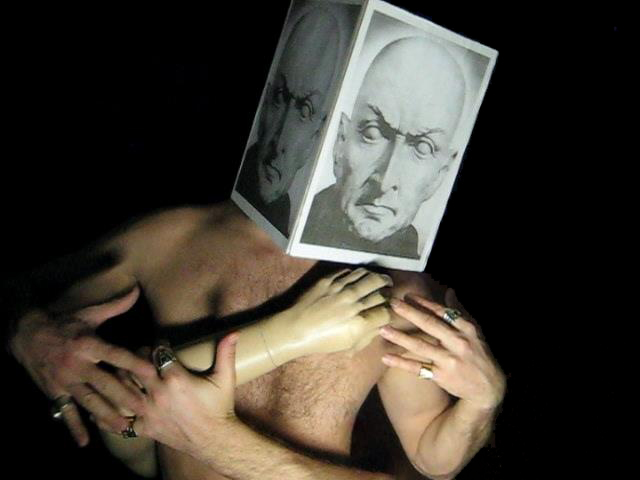
Aleister Crowley created a kind of a parallel world, with new values based on the injunctions of religion etc, called Thelema, in which he played the central rôle of a Prophet. Ecstatic Creation of Culture. The main ideas of this lecture, dated 1996, are the examination of Aleister Crowley's magical religion, the phenomenon of euphoric trance–images, the use of Cabbala as a verbal bridge between different realities, and the discussion of occultists associated with occult orders and free occultists.
Claas Hoffmann: Hoffmann's text examines the connection between Crowley’s "Book of the Law", Lady Frieda Harris’ tarot paintings, and Projective Synthetic Geometry, tracing Harris' exposure to this mathematical system through her interactions with Anthroposophical thinkers. He situates Crowley’s tarot project within the esoteric and artistic context of early 20th–century Britain, emphasizing how Harris’ geometric choices reflect an alternative spatial understanding linked to Rudolf Steiner’s spiritual science. By exploring concepts such as polarity, infinity, and sun–space, Hoffmann draws parallels between esoteric geometry and the metaphysical doctrines embedded in Crowley’s work, suggesting that Harris’ tarot illustrations function as both visual expressions of The Book of the Law and practical demonstrations of Projective Geometry. His analysis also highlights the ideological tensions between Thelema and Anthroposophy, particularly through Olive Whicher’s dismissal of Crowley’s teachings, reinforcing the divide between these competing esoteric traditions. Ultimately, Hoffmann’s study frames the Harris–Crowley collaboration as a unique convergence of occultism, modern art, and mathematical mysticism, with Harris as a key figure navigating these intersecting influences.
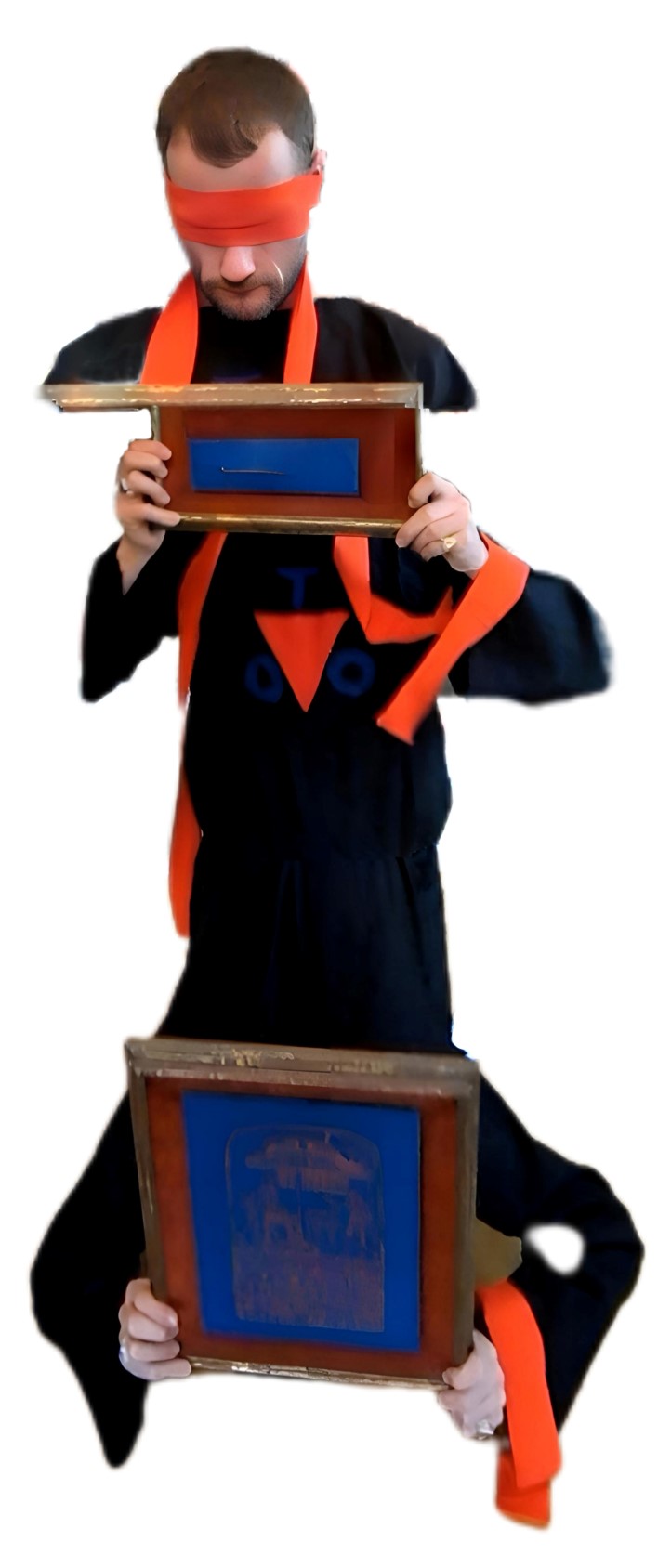
Regarding Crowley's antidemocratic, racist and misanthropic writings, followers point out: "The reason [...] aspects of Thelema are omitted [in public discussion] indicates the actual problem with presenting Thelema as a religion and attempting to get Thelema sanctioned by the government or approved by the public: Thelema is ultimately in contrast to and transgressive of normative society. Thelema rejects the morals and values of normative society and acts to transgress and violate these norms. From the inclusion of intoxicants in ritual, to the positive view of sexuality, which frequently is seen as promoting promiscuity, to the pro–authoritarian and Nietzschian aspects of Thelema, normative society has much to reject in Thelema and conversely, Thelema encourages its adherents to reject most aspects of normative society." ['Caliphate' O.T.O.'s "Journal of Thelemic Studies", 1;2, 2008, page 40] Nicht alle Zweige des O.T.O. haben Crowleys Thelema übernommen. "Der Grund, warum [...] Aspekte von Thelema ausgelassen werden, zeigt das eigentliche Problem dabei, Thelema als Religion darzustellen und eine staatliche Anerkennung oder öffentliche Akzeptanz anzustreben: Thelema steht letztlich im Gegensatz zur normativen Gesellschaft und überschreitet deren Grenzen. Thelema weist die Moral und Werte der normativen Gesellschaft zurück und zielt darauf ab, diese Normen zu überschreiten und zu verletzen. Von der Einbeziehung berauschender Substanzen in Ritualen über die positive Auffassung von Sexualität, die oft als Förderung von Promiskuität wahrgenommen wird, bis hin zu den pro–autoritären und nietzscheanischen Aspekten von Thelema — die normative Gesellschaft findet vieles daran abzulehnen. Umgekehrt ermutigt Thelema seine Anhänger dazu, die meisten Aspekte der normativen Gesellschaft zurückzuweisen." ["Journal of Thelemic Studies", 1;2, 2008, Seite 40, übersetzt] Concernant les écrits antidémocratiques, racistes et misanthropes de Crowley, ses disciples soulignent : « la raison [que quelques] aspects de Thelema sont omis [dans la discussion publique] indique le problème réel avec la présentation de Thelema comme une religion et essayant d'obtenir pour Thelema une sanction du gouvernement ou approuvé par le public : Thelema est finalement en revanche transgressive de la société normative. Thelema rejette la morale et les valeurs de la société normative et agit pour transgresser et violer ces normes. De l'inclusion des substances intoxicantes dans les rituels, à la perception positive de la sexualité, souvent considérée comme favorisant la promiscuité, le proautoritaire et l’aspect Nietzschéenne de Thelema, la société normative a beaucoup rejeter en Thelema et inversement, Thelema encourage ses adhérents à rejeter la plupart des aspects de la société normative. » [Journal of Thelemic Studies, 1;2, 2008, page 40, traduit]. In merito agli scritti antidemocratici, razzisti e misantropici di Aleister Crowley, i suoi seguaci precisano: «La ragione per cui [...] certi aspetti della filosofia thelemica sono omessi [nei pubblici contesti] indica l’effettiva difficoltà di presentare Thelema come una religione e al contempo ottenere una legittimazione dallo stato o la pubblica approvazione: invero Thelema trasgredisce e si contrappone alle norme sociali. Thelema rifiuta la morale e i valori della società normata e agisce per trasgredire e violare queste norme. Per l’uso di ‘sostanze’ nei rituali, per la magnificazione della sessualità, spesso fraintesa come spinta alla promiscuità, per gli aspetti pro–autoritari e nietzscheani, la società normata ha molto da respingere in Thelema e, allo stesso modo, Thelema incoraggia i suoi accoliti a respingere la maggior parte degli aspetti della società normata.» “Journal of Thelemic Studies”, 1; 2, 2008, p. 40. Em relação aos escritos antidemocráticos, racistas e misantrópicos: "A razão […] de certos aspectos de Thelema serem omitidos [de discussões públicas] indica o real problema em apresentá–la como uma religião e tentar fazer com que seja aceita por governos ou aprovada publicamente: Thelema está, no final das contas, em contraste com a sociedade preceptiva além de transgredi–la. Thelema rejeita a moral e os valores dela e age para transgredir e violar tais normas. Desde a inclusão de intoxicantes em rituais, passando pelo ponto de vista positivo em relação a sexualidade — que com freqüência é visto como incentivo à promiscuidade — aos aspectos pró–autoritários e Nietzscheneanos de Thelema, a sociedade preceptiva tem muito para rejeitar em Thelema e, reciprocamente, Thelema encoraja os seus simpatizantes a rejeitar muitos aspectos dessa sociedade." "Journal of Thelemic Studies", 1;2, 2008, pag. 40. 
Das Milieu des Templer Reichs — Die Sklaven Sollen Dienen. The argument presented in this discussion suggests that Aleister Crowley may be considered a political opportunist, who sought to build relationships with anyone, anywhere, in order to advance his personal interests, including the operation of his parareligion, Thelema. As he faced repeated failures in his political and utopian pursuits, Crowley increasingly emphasized his status as the founder of a religion, attracting followers from all walks of life. Therefore, it is beneficial to recognize the diverse range of people interested in this topic. This article from 2006 will focus on notable individuals and organizations in this milieu, such as the Ordo Novi Templi, Fraternitas Saturni, and key figures such as Lanz von Liebenfels, Mathilde Ludendorff, Karl Germer, Christian Bouchet, Paolo Fogagnolo, and James Wasserman. The discussion will explore the political leanings of these groups and their members, as well as their attitudes towards anti–Semitism and religious intolerance. Additionally, the analysis will address the question of whether a consistent political direction can be identified within the O.T.O. Finally, the concepts of Ariosophy and paranoia will also be explored and illustrated with examples.
Proto–Fascist Elements in the O.T.O. In 2000, P.R. Koenig, Jeroen Hoogeweij, KALIL, and Bryony Murds debated whether the modern O.T.O. struggles to balance mystique and modernity, elitism and inclusivity, dogma and inquiry. PRK and JH expose its authoritarian underpinnings, intellectual fragility, and reliance on theatrical rituals, while KALIL offers a romanticized counterpoint of individual empowerment. Murds’ editorial commentary sharpens the analysis, drawing parallels with Orwell, Ayn Rand, and religious fundamentalism to underscore Thelema’s paradoxical mix of libertarian rhetoric and hierarchical control. Texts by Marco Pasi:
Rudolf von Sebottendorff: Der Talisman des Rosenkreuzers. With a preface by Albrecht Goetz von Olenhusen. The Thule Society, often mythologized for its alleged ties to Adolf Hitler, has no credible evidence linking him directly to its activities. Sebottendorff’s claims of involvement with irregular Masonic orders, particularly the Memphis–Misraim Rite in Turkey, remain unproven but add to his self–crafted mystique. Alleged connections to occult groups like the O.T.O. in Switzerland or Ascona are similarly speculative, fueling conspiratorial narratives. Ultimately, Sebottendorff and Thule occupy a shadowy space between history and myth, where fact and legend blur to create enduring fascination. 
Articles on the History of the Ordo Templi OrientisHistorical Figures and OrganizationsWhether treated as object or subject, the very term O.T.O. is itself neither fixed nor coherent. The O.T.O. is not a compact, bounded set of categories, but consists of different individuals and more or less loose groupings, which often meet and part (or converge and diverge) with each other — and all at the same time. Any historical account, any arrangement of these individual parts is perforce provisional, subject to rules of thumb and remains experimental in nature. 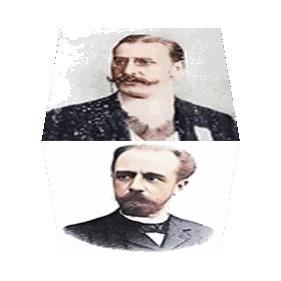
Fragmentation and rivalry within the O.T.O. groupsThe history of the Ordo Templi Orientis, along with its variations, is marked by a considerable degree of complexity, with various claims to apostolic succession, mutual accusations, and expulsions. In this context, it is not surprising that there are significant overlaps and interconnections between different factions within the organization and its variations. Background
Conflicts over leadership and legitimacy have played a defining rôle in the evolution of the O.T.O., particularly following the death of Theodor Reuss in 1923. Notably, Carl Kellner, often credited with its foundation, was never a member, and Aleister Crowley, despite his prominence, was expelled by Reuss in 1921. A succession of National Grand Masters (X°) oversaw various jurisdictions, though their legitimacy varied, and competing claims to the position of Outer Head of the Order (OHO) emerged after Crowley’s death in 1947. Some figures, such as Karl Germer, explicitly rejected the title of OHO, while others, including Kenneth Grant and Hermann Joseph Metzger, sought recognition despite contested legitimacy. Legal disputes, particularly involving the so–called 'Caliphate' O.T.O., have shaped modern perceptions of the Order, with rulings both for and against various factions, particularly regarding copyrights and trademarks. The Order’s internal structure and power dynamics have been subject to scrutiny, with claims of manipulation, censorship, and legal maneuvering playing a rôle in its post–Crowley development. Various documents and court cases highlight the Order’s contested lineage, internal schisms, and ongoing struggles for authority, particularly in the late 20th and early 21st centuries. National Grandmasters and OHOs of the O.T.O. 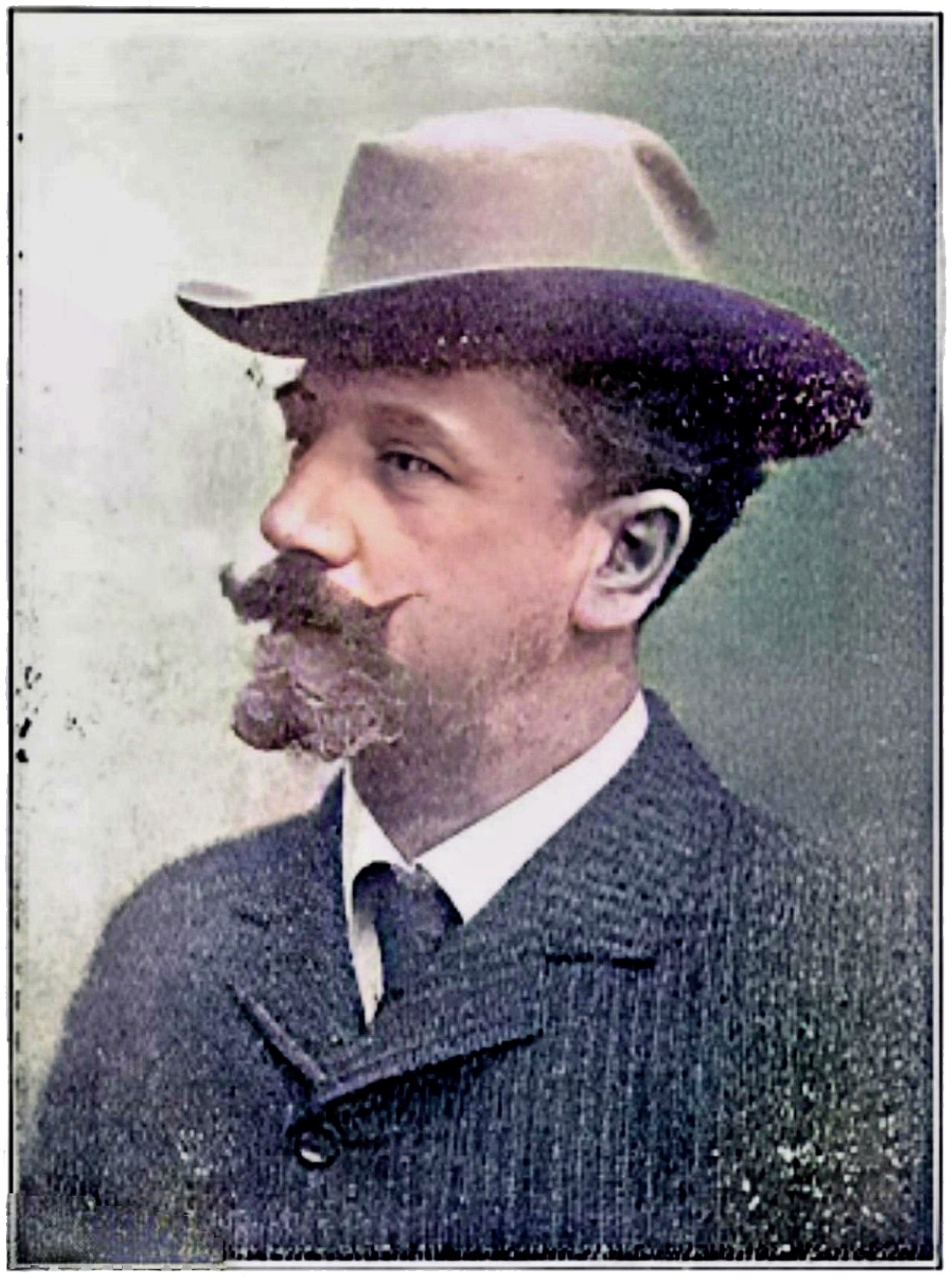
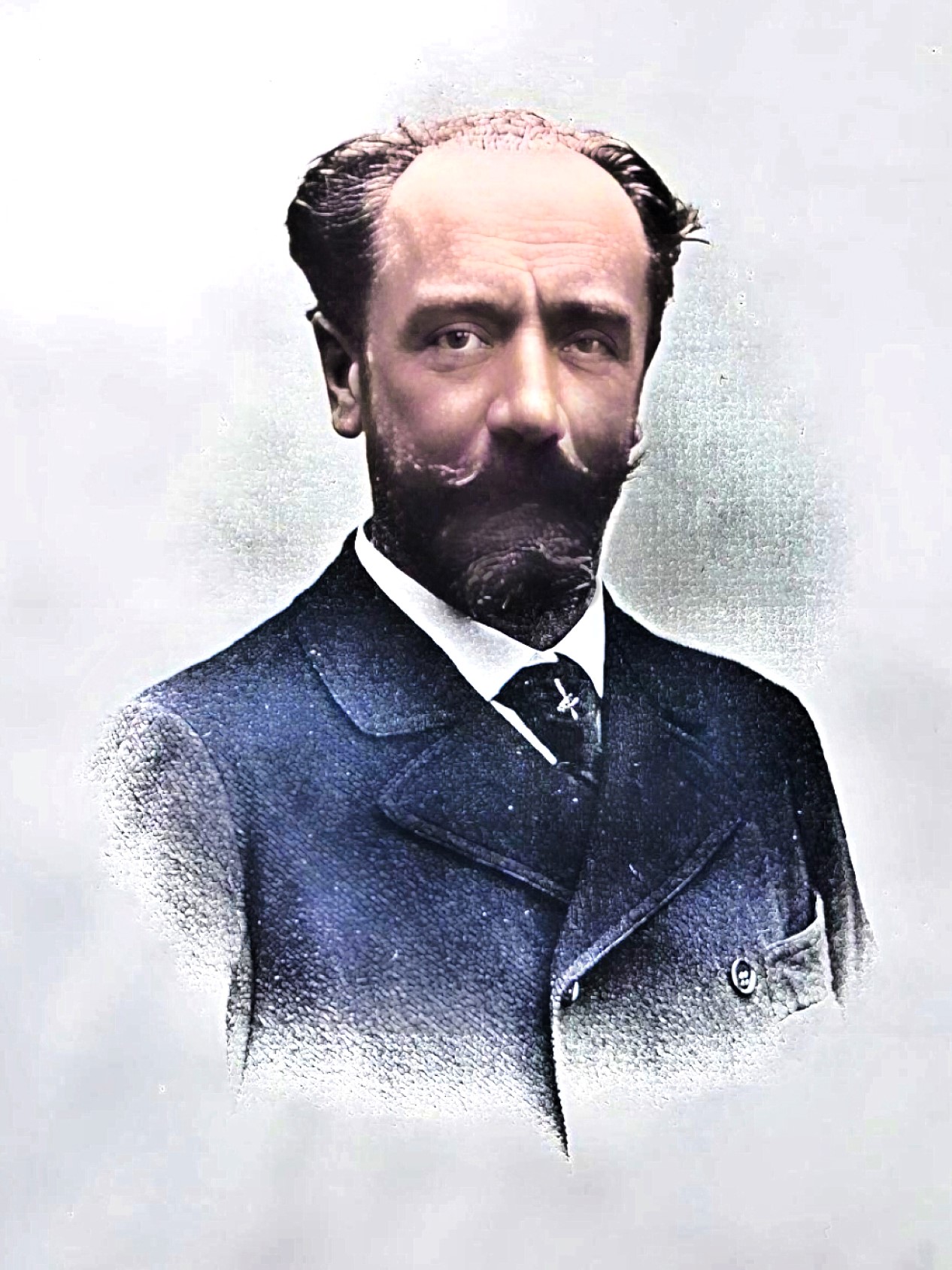
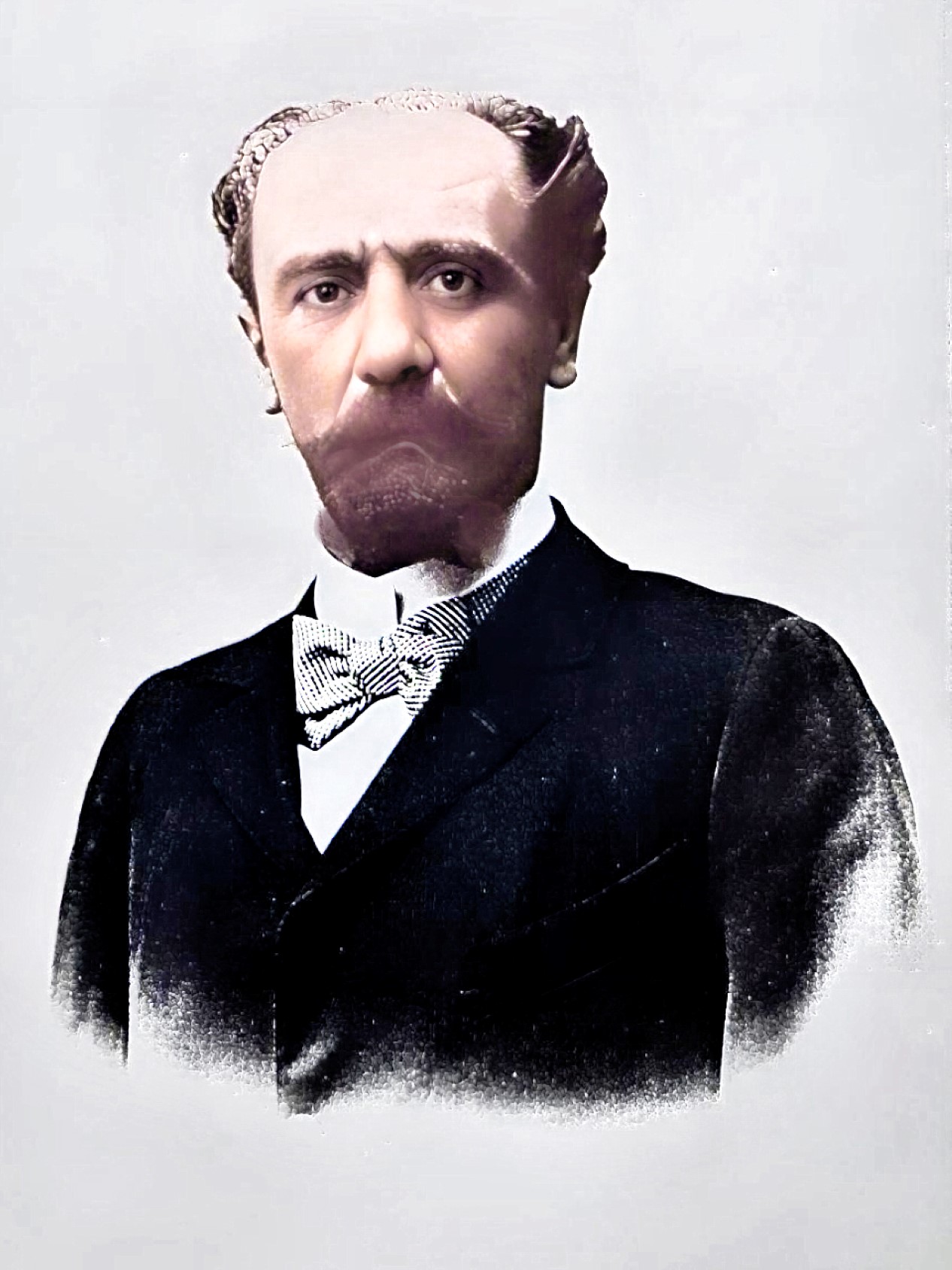
[Colored with AI] 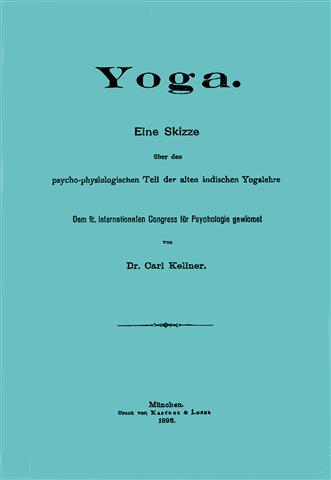
Details about Carl Kellner: Never a member of any O.T.O. Josef Dvorak’s text below examines Carl Kellner as a complex individual who connected the realms of science, industry, and mysticism. While Kellner’s industrial innovations advanced material progress, they also had significant environmental and ethical consequences. His interest in mysticism reflects a broader cultural desire for spiritual meaning in a world becoming increasingly dominated by machinery and technology. Dvorak portrays Kellner as a representative of his time’s conflicts and contradictions: a trailblazer balancing the forces of creation and destruction, practical science and mysticism, and the physical and the spiritual.
Short biography of Franz Hartmann. The pre–O.T.O. period was marked by fluid affiliations, ideological divergences, and personal rivalries. Theosophy provided a fertile ground for the exchange of ideas, but its splintering into factions mirrored the broader instability within the occult community. The interplay between figures like Hartmann, Kellner, and Reuss highlights the challenges of synthesizing diverse traditions and the difficulty of maintaining cohesive leadership in esoteric organizations. Hartmann's contributions, though overshadowed by his estrangement from Reuss and posthumous misrepresentations, were significant in shaping the intellectual and spiritual foundations of modern Western esotericism. His connections to Theosophy, Memphis–Misraim, and prominent intellectuals demonstrate his pivotal, if contentious, rôle in the evolution of occult thought. Joanny Bricaud: Notes Historique sur le Rite Ancien et Primitiv de Memphis–Misraim. The document provides a historical account of the Ancient and Primitive Rite of Memphis–Misraim, an esoteric para–Masonic tradition originating in 18th–century France and evolving through numerous schisms, reforms, and international expansions. Regular Freemasonry’s dismissal of Memphis–Misraim as irregular highlights tensions between orthodoxy and heterodoxy within fraternal organizations. Compiled primarily from Bricaud's writings, the narrative spans the mid–19th to early 20th centuries, highlighting key figures, dates, and events tied to the development of Memphis–Misraim, the O.T.O., and the Gnostic Catholic Church. The narrative reveals a complex interweaving of continuity and disruption. 
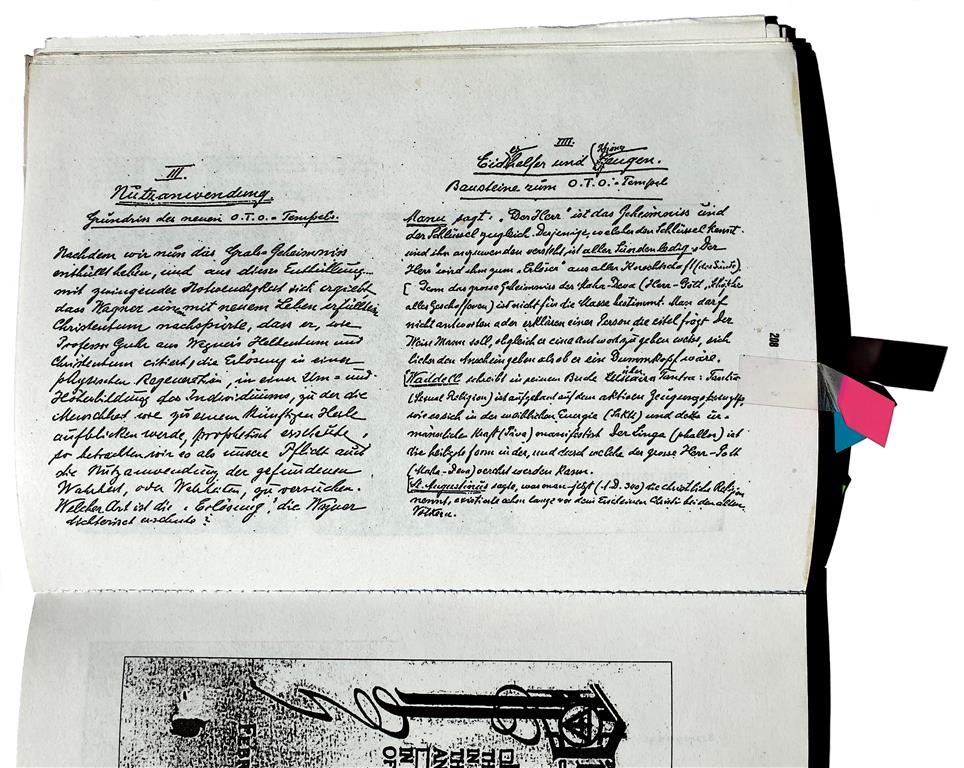
[From: 'Der Grosse Theodor Reuss Reader'] Theodor Reuss and Carl Kellner: Sort–of Biographies. The corpus of sources on Kellner, Reuss, and the O.T.O. presents a mosaic of perspectives, ranging from scholarly neutrality to sensationalism and propaganda. While primary documents such as charters and 'Oriflamme' writings provide direct insight, they are self–serving and require critical evaluation. Secondary accounts, particularly those rooted in Nazi–era propaganda or occult sensationalism, offer distorted narratives that reflect broader cultural and political anxieties. The sources must be approached with caution, cross–referencing reliable biographical accounts and documented charters against more dubious narratives. While the sanitized excerpts from antisemitic publications avoid explicit hate speech, their broader ideological context cannot be ignored. As such, they underscore the importance of situating these narratives within the complex interplay of esotericism, modernity, and political ideology. — Secondary Sources: Biographical Sketches — Sensationalist Narratives — Antisemitic and Politicized Narratives — Esoteric and Masonic Writings — Retrospective Interpretations
A.P. Eberhardt: Von den Winkellogen Deutschlands [O.T.O., Illuminati, Memphis–Misraim, etc.]
A letter from Francis X King to John Symonds about Theodor Reuss. Reuss, a German journalist and singer, joined the Socialist League in 1885, serving on its executive committee alongside Edward and Eleanor Marx–Aveling. On May 7, 1886, he was expelled amid accusations of spying for the Prussian Secret Police. Known for his coarse demeanor, Reuss frequently irritated his colleagues; Eleanor Marx–Aveling once wrote a scathing letter condemning his vulgar behavior after a League fundraising concert. Theodor Reuss' O.T.O. rituals © with an introduction. Reuss mastered the art of presenting himself as the central axis of a paper empire, whose majuscule–laden titles sound more like operatic scenery than the sober minutes of a lodge meeting. His charters and warrants read as if penned by a sovereign intent on constructing a personal panorama of petty principalities, in which occult consecrations and constitutional phraseology coexist in fraternal harmony. Beneath the respectable, theosophical veneer of his teaching, however, lies a carefully coded sexual magic, recognisable as such only to the initiated — a double–entry bookkeeping of esotericism that renders him socially presentable and at the same time subversive. Questions of succession he resolved not by clear testament (he appointed his wife Pauline Reuss as custodian), but by fostering a competition of warrants, which after his death produced a veritable panopticon of competing “legitimate” heirs. His network of relations with Encausse, Yarker, Hartmann, and Tränker was less a matter of doctrinal coherence than of mutual certification — a stock exchange of titles in the service of reciprocal legitimation. The rituals themselves form a patchwork of Freemasonry, Martinism, Gnosis, and neo–Templar romance, composed in a style at once solemn and bureaucratic, and happily recycled when occasion allowed. This performative polyphony was less an expression of systematic doctrine than a means of stabilising a fragile network through the repetition of familiar forms. To read Reuss’s texts is thus not merely to peruse a collection of rituals, but to enter a stage on which authority, ambiguity, and solemn display are woven together with deliberate artifice. 
Aleister Crowley's life, a paradoxical blend of opulence and chaos, is an odyssey through the annals of Western esotericism, marked by ambition, scandal, and an insatiable thirst for notoriety. Crowley, much like his contemporary Theodor Reuss, excelled in theatrically intertwining spirituality with its financial exploitation — a talent that underpinned much of his notoriety and his idolatrous appeal.
Aleister Crowley's O.T.O. rituals may appear deceptively simple at first glance, yet they follow a clearly discernible dramaturgy: they unfold like a precisely choreographed stage play, moving from poetically chivalric symbolism to an almost clinical directness. What begins veiled in the gestures of courtly allegory eventually culminates in a sober set of instructions for preparing an “Elixir” from bodily fluids — a transition that, one suspects, held particular appeal for those occult romantics who found insufficient “spice” in other secret societies. One high–degree text offers a curious blend of kitchen recipe and metaphysical dogma: “The Elixir… is to be preserved from contact with any material which might contaminate its purity” — a sentence that could just as well appear in a jam–making manual. For those in search of a little taboo–breaking, there is the crucifixion of a frog. And here and there, a touch of anti–Semitism is worked in. In one “secret” instruction of the O.T.O., Crowley perpetuates a well–known anti–Semitic blood libel: he describes Jews as slaughtering the children of non–Jews for their Passover meals, in order to consume or use the blood for talismanic or sacramental purposes. His language betrays no trace of irony, presenting the claim as serious instruction: “Consider this.” From Crowley’s standpoint, anyone irritated by such accusations (and similar calumnies) is merely “monstrous and extravagant,” displaying nothing more than a “defect.” In other words, the fault, in his view, can never lie with the prophet Crowley, but must always reside in the reader’s own perception and judgment. |
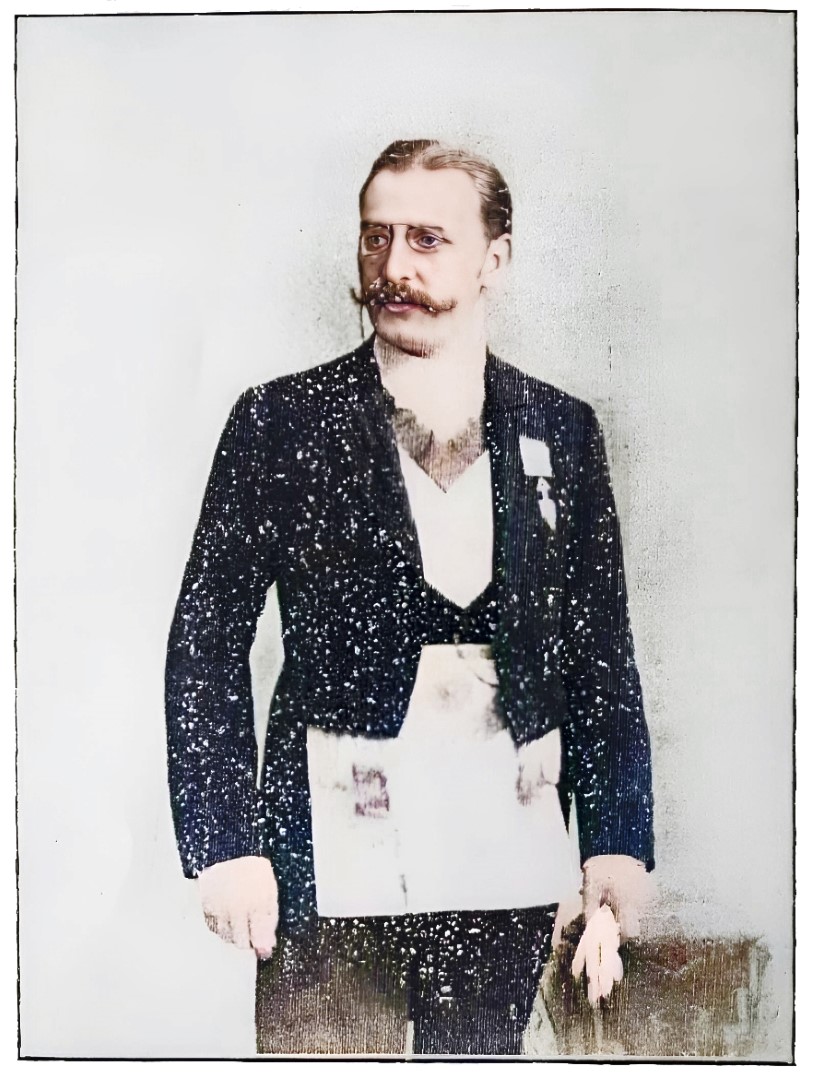
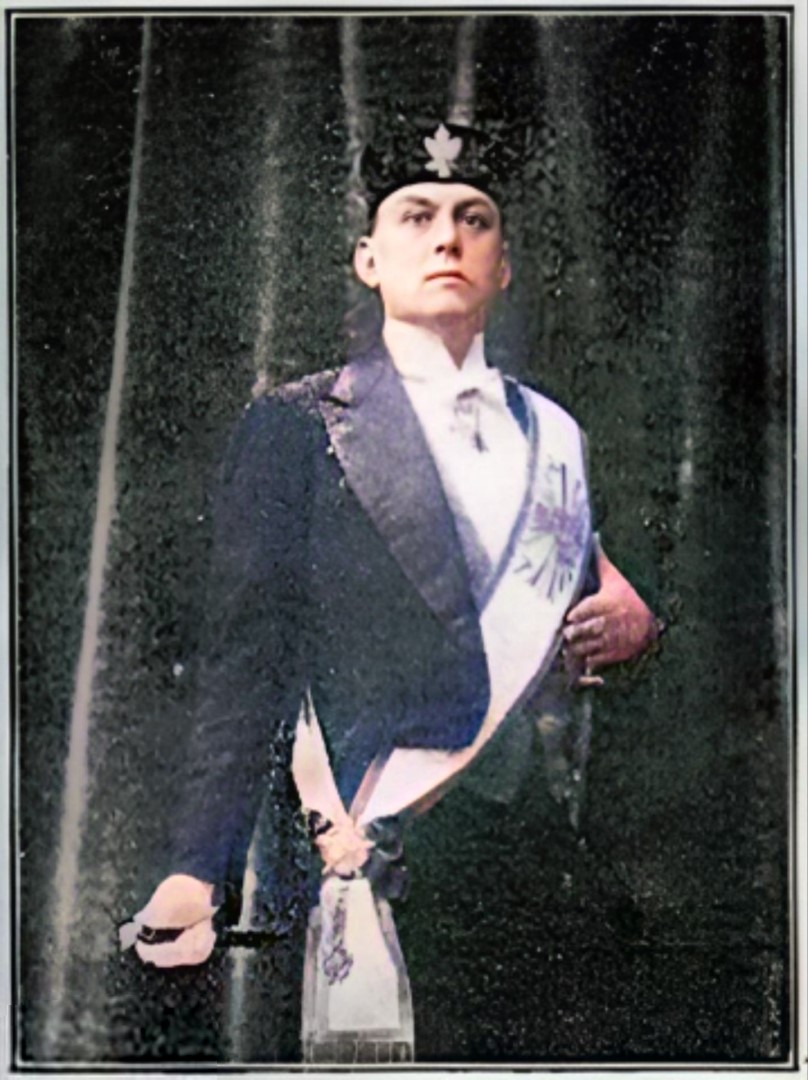
|
|
This 1998 interview dissects the O.T.O. as a chaotic blend of mysticism, opportunism, and theatrical absurdity. Emerging from Freemasonic traditions, the O.T.O. commodified spiritual legitimacy, with figures like Theodor Reuss selling charters and degrees, thus creating a labyrinth of pseudo–Masonic orders. Reuss’s eclectic mysticism culminated in Aleister Crowley, who refashioned his O.T.O. into a quasi–monarchical theater of self–glorification, draped in Thelemic doctrines and punctuated by rituals involving bodily fluids. 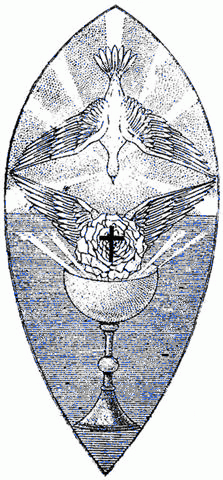
The pre–O.T.O. period under Theodor Reuss fused esotericism, opportunism, and a flair for mystic showmanship. Reuss drew inspiration from the Asiatic Brothers of the Rosy Cross, founded in 1781 by Hans Heinrich von Ecker und Eckhoffen, who claimed ties to the Seven Churches of Asia, blending Qabalistic and Gnostic elements into a pay–to–ascend system. Much like Ecker, Reuss attracted wealthy followers while facing accusations of financial exploitation, which he deflected with theatrical aplomb. His 1917 O.T.O. Constitution codified a hodgepodge of Craft Masonry, Rosicrucianism, and Illuminati symbolism, with rituals inspired by the 1866 "Der Signatstern" exposé of the Asiatic Brothers. Reuss modernized these rites by introducing a High Priestess, a nod to shifting gender sensibilities wrapped in a theatrical mystic veneer. Behind the mysticism lay a savvy marketer: Reuss admitted to Crowley that terms like “Hermetic Brotherhood of Light” were mere tactical rebrands. Reuss ultimately epitomized the spirit of late 19th’s–century occultism: a tireless architect of mystic systems, where spirituality and financial enterprise lived in uneasy but fruitful harmony. |
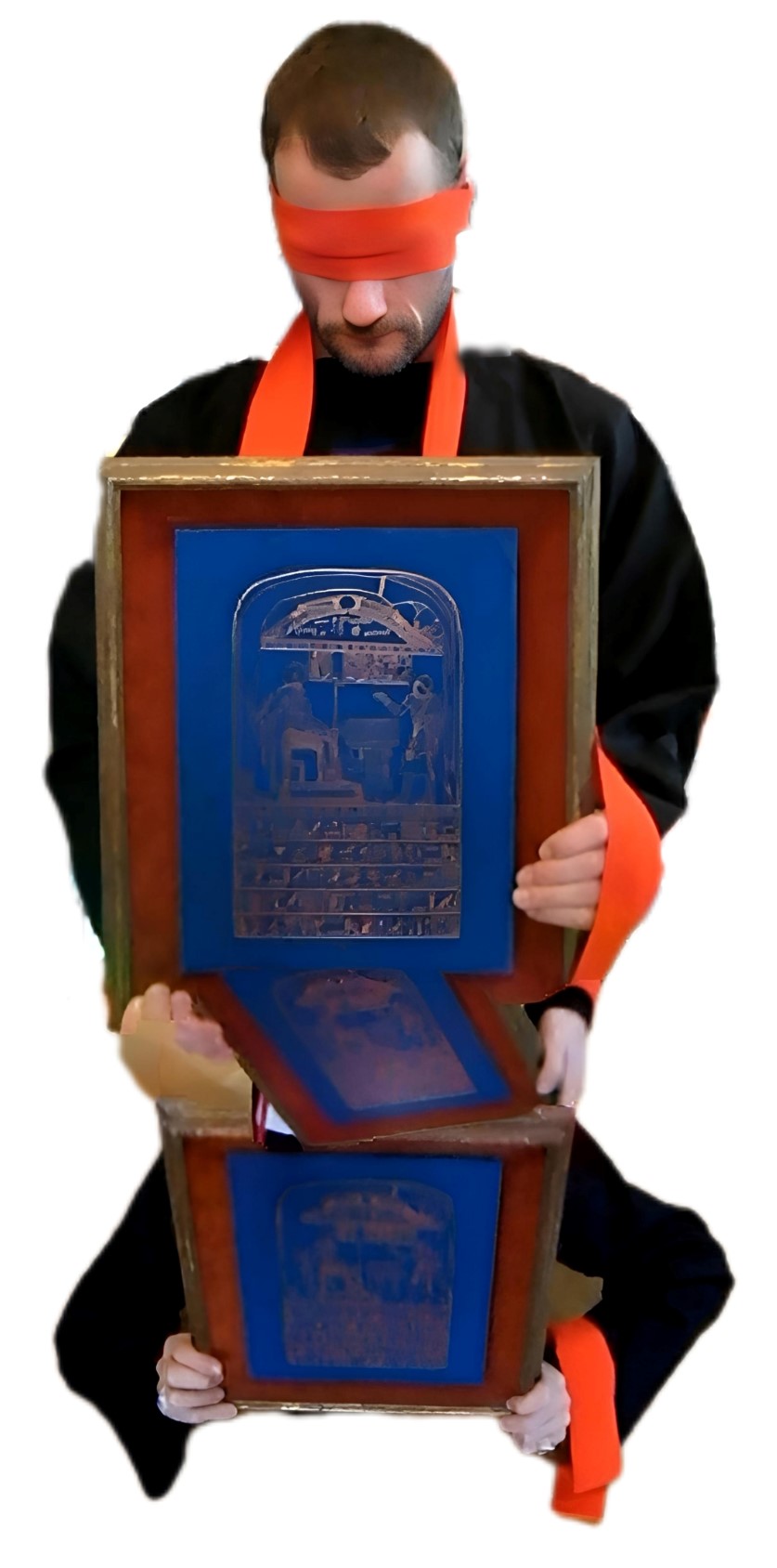
|
Rafal T. Prinke:
Czesław Czyński, a Polish occultist, played a significant rôle in European esoteric circles, practicing mesmerism, hypnotism, and affiliating with multiple occult orders, including the O.T.O. under Theodor Reuss. His biography is difficult to reconstruct due to contradictory accounts, but his career mirrors figures like Cagliostro, marked by aristocratic patronage, scandal, and claims of supernatural abilities such as bilocation and clairvoyance. After a highly publicized trial for bigamy in Berlin, Czyński integrated into the French occult revival, working alongside Dr. Gérald Encausse (Papus) and obtaining initiations in several esoteric traditions, including the Martinist Order, where he later became a leading figure in Russia and Poland. His affiliation with the O.T.O. is particularly notable, as he held the VII° degree — one of the sexual magic degrees — suggesting his rôle in transmitting and modifying O.T.O. teachings, potentially blending them with Martinist practices. Under his leadership, the Polish Martinist Order incorporated controversial elements, including alleged Satanic rites and sexual magic, leading to opposition from within the order and an eventual schism. Expelled from the Martinists in 1926, he founded the Order of the White Orient, but by 1931, Polish authorities had cracked down on occult activity, dissolving Martinist lodges amid accusations of black masses and ritual orgies. Czyński’s career illustrates the fluid intersection of occultism, aristocracy, and scandal in early 20th–century Europe, highlighting how figures like Reuss, Papus, and their initiates blurred the lines between esoteric study and personal ambition.
Zbigniew Lagosz: NA OBRZEZACH RELIGII I FILOZOFII CZESLAW CZYNSKI. The article "Na obrzeżach religii i filozofii" explores the historical tension between religious dogma and scientific rationalism, emphasizing the destabilization of traditional cosmologies due to modern scientific discoveries. This intellectual uncertainty led to a renewed interest in esoteric and occult traditions, which positioned themselves as alternatives to both religion and rationalism. Czesław Czyński, a Polish occultist active between the 19th and 20th centuries, exemplifies this shift, blending mystical traditions with contemporary philosophical and scientific currents. His involvement with the Martinist Order and later the Ordo Templi Orientis reflects a broader trend of syncretism in occult thought, where esotericism sought legitimacy through scientific and psychological discourse. The article also situates Czyński within the milieu of figures like Aleister Crowley, suggesting potential ideological or practical intersections, though definitive connections remain speculative. Ultimately, the study portrays Czyński as an enigmatic figure whose influence, while significant within Polish occultism, failed to reach the international prominence of his contemporaries. 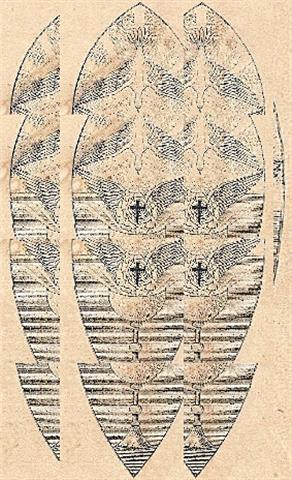
Chronologically, we are approaching the death of Theodor Reuss in 1923. Yet, since the O.T.O. phenomenon moves in a vortex of interlocking currents and overlapping trajectories — topics at once seeming to converge and just as quickly to drift apart — it should be noted in advance that in 1936 Hans Rudolf Hilfiker claimed that John Yarker’s charter had endorsed him as Reuss’s successor. Hilfiker declared the O.T.O. defunct upon Reuss's death and regarded it as non–existent. He revived the Memphis–Misraim Rite under the leadership of Constant Chevillon, maintaining a deliberate distance from Crowley. With Chevillon’s collaboration, and with the assistance of Reuben Swinburne Clymer, he sought to unite Rosicrucian orders. Chevillon consecrated Arnoldo Krumm–Heller in 1939, but was murdered by the Gestapo in 1944. Let us for the moment concern ourselves with Hilfiker, who during Reuss’s lifetime was to play a significant rôle in the German–speaking O.T.O. The matter of Reuss’s death will be addressed in the following chapter but one, after examining Rudolf Steiner’s relationship with Reuss. Consider the O.T.O. non existent.
The Monte Verità community was founded in 1900 by Ida Hofmann and Henri Oedenkoven. By 1916, Theodor Reuss established the Verità Mistica Lodge of his O.T.O., making Hofmann and Oedenkoven members and blending Freemasonry with sexual magic and esoteric practices, although his actions were widely regarded as opportunistic and divisive. Significant figures such as dancer Rudolf Laban and Hans Rudolf Hilfiker played dual rôles in fostering both artistic and ritualistic expressions within the community. Women like Hofmann and Clara Linke were pivotal in organizing the community, even as tensions over gender rôles and financial transparency persisted. The lodge's activities intertwined with broader Masonic traditions, drawing criticism and sparking internal conflicts that culminated in schisms by 1918. Laban and others shifted their focus to dance and theater, severing ties with Reuss, whose financial dealings and personal scandals further undermined his credibility. Despite Reuss's ambitious plans, including a proposed international Masonic congress in Zurich, his influence waned. The Monte Verità community subsequently evolved into a broader cultural hub, securing its legacy as a significant locus of early modernist experimentation.
Letter from Engelhard Pargaetzi to Hans Rudolf Hilfiker, April 4, 1920: Quarrel in Theodor Reuss' Swiss O.T.O. lodge. Declaration that the relations between the Grand Orient and Theodor Reuss were definitely past history. 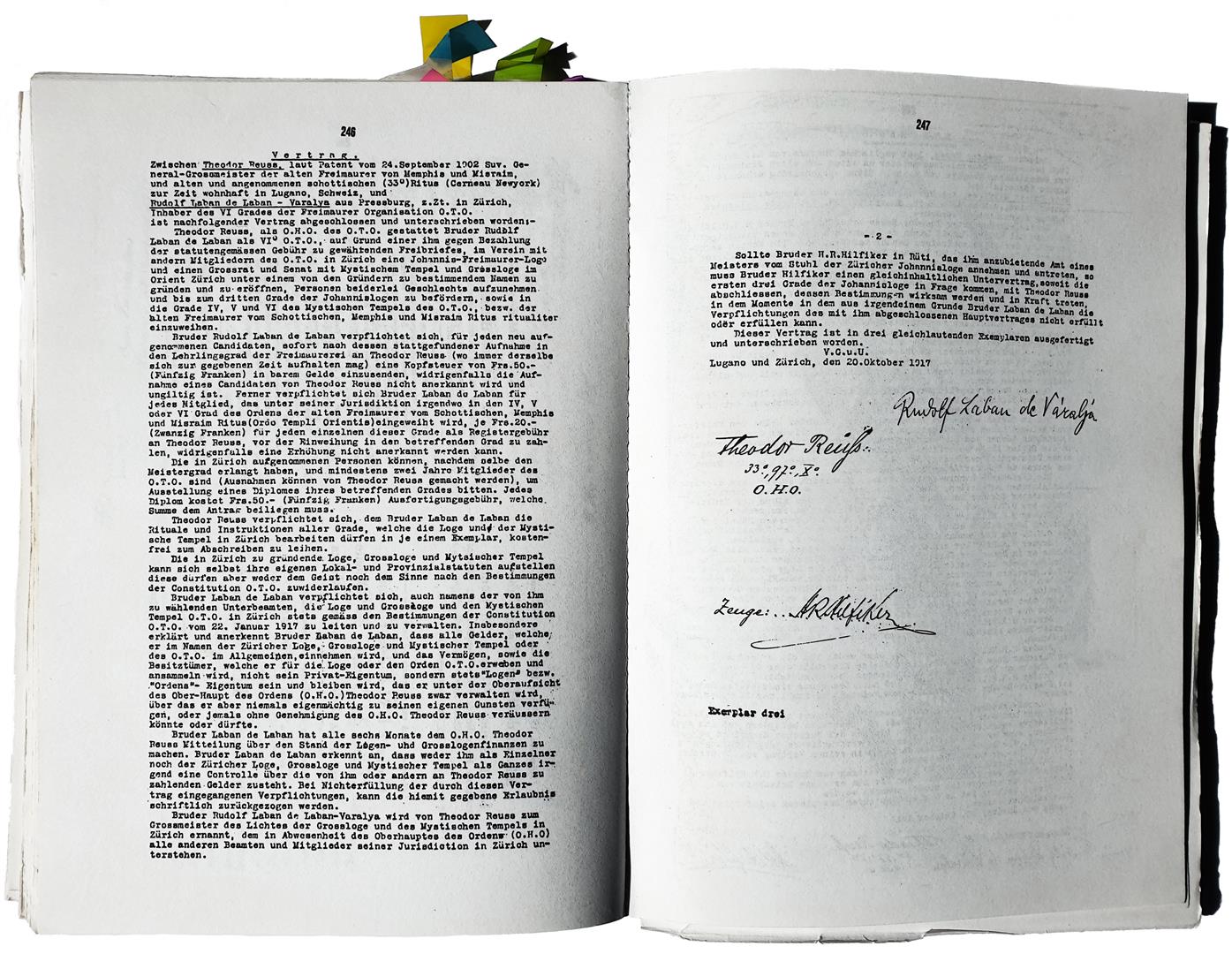
1917 Vertrag / Contract Theodor Reuss — Laban de Laban [From: "Der Grosse Theodor Reuss Reader"] [Gallery of some documents relating to Theodor Reuss.] 
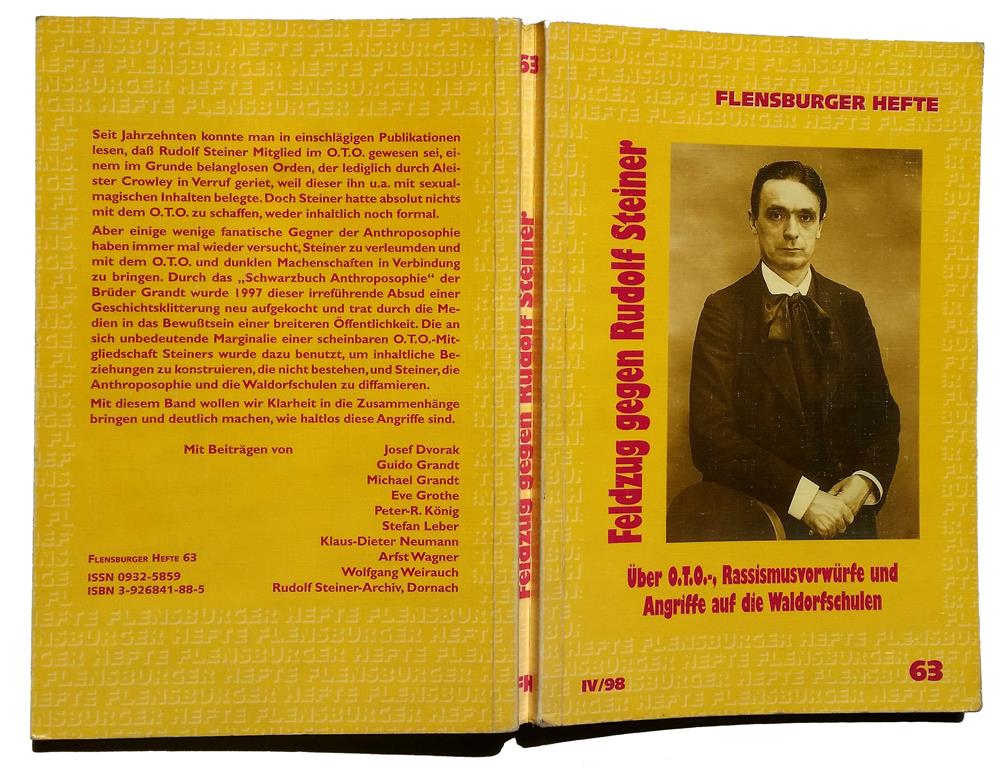
[From: "Feldzug gegen Rudolf Steiner", Flensburger Hefte 63 IV/98, Flensburg 1998] Rudolf Steiner: Not a member of the O.T.O. After decades of incomplete media reports and propaganda efforts by biased parties regarding Rudolf Steiner's alleged membership in Theodor Reuss' German lodge of the Ordo Templi Orientis, the archive of Rudolf Steiner's probate has finally opened its vault. This has given historians the necessary evidence to put the matter to rest. There is no evidence to suggest that Rudolf Steiner ever accepted anything from Theodor Reuss, except for his permission to use the term "Misraim". Additionally, there is no documentation that proves Steiner was ever a member of the Ordo Templi Orientis.
Online facsimile documents regarding Reuss and Steiner. Two letters from Theodor Reuss concerning Franz Hartmann / Rudolf Steiner. "Gestatten, Under–Cover Agent Peter–R. König" — Ein Interview für die 'Flensburger Hefte' zum Thema "Feldzug gegen Rudolf Steiner". In an interview with Wolfgang Weirauch, König critiques the "Schwarzbuch Anthroposophie" by the Grandt brothers, a polemical work aimed at discrediting Rudolf Steiner. He characterizes their approach as a rhetorical strategy designed more to attract media attention than to ensure factual accuracy. He further underscores their reliance on selectively curated sources to substantiate their claims. Ultimately, König interprets their methods as a form of sensationalist “victimhood journalism”, in which personal attacks and misinformation take precedence over scholarly integrity. Succession, Legacy, and Sacral Usurpation after Theodor Reuss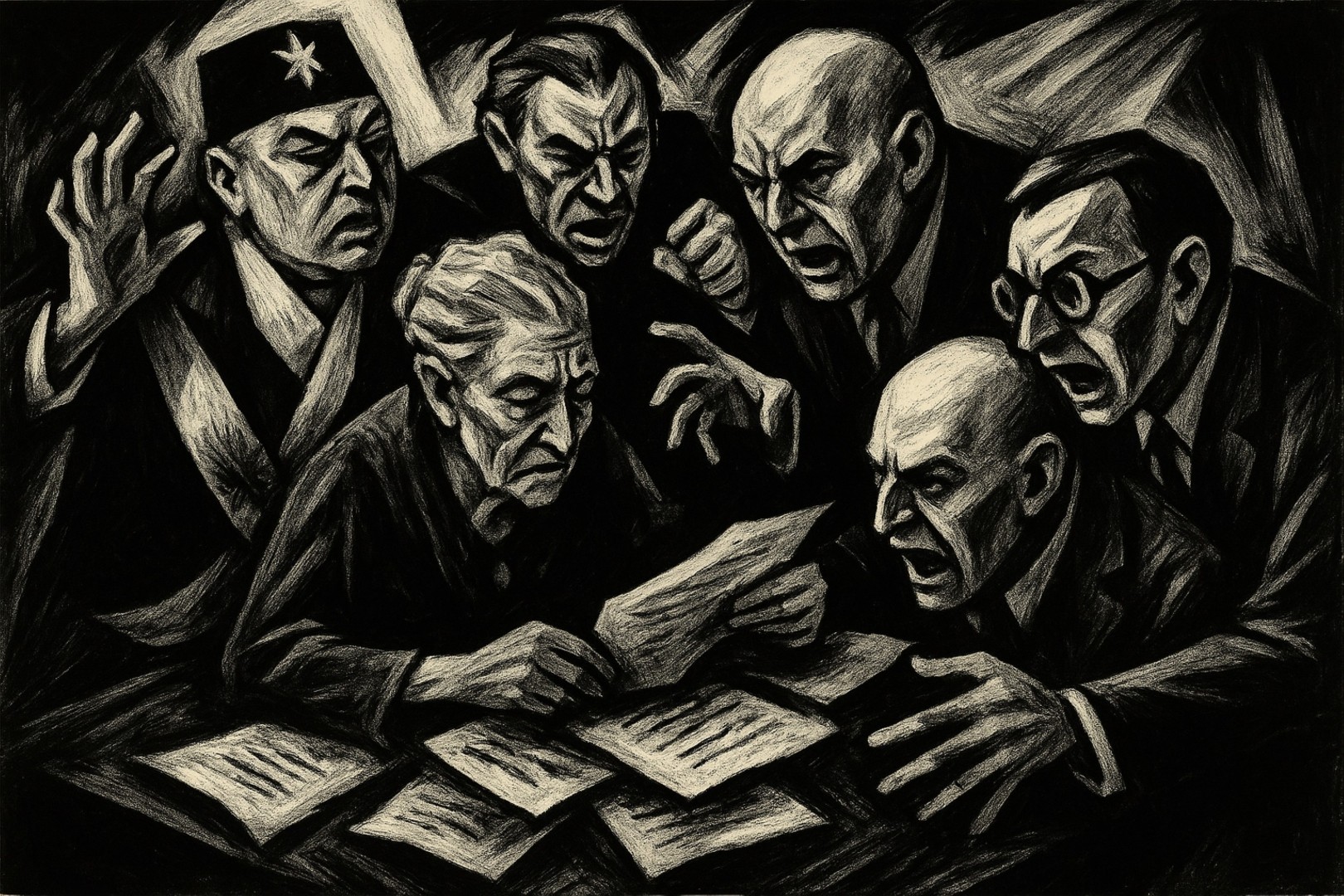
[AI-generated Image] When Theodor Reuss died in October 1923, he left behind not merely an esoteric organization without a clear rule of succession, but also a symbolically charged estate whose disposition would shape the development of the Ordo Templi Orientis for decades. The ensuing struggle for power was conducted not on a juridical plane, but on sacral, political, and rhetorical terrain. As Heinrich Tränker, Charles Stansfeld Jones, and Aleister Crowley each articulated his claim to succession, questions of ownership, legitimacy, and spiritual authority became inextricably entangled. What begins here is an ideological and structural rupture in which the question “Who is the O.H.O.?” signifies far more than a matter of personnel — it becomes a question about the very nature of esoteric authority itself. The Sealed Shrine Dramatis Personae:
The New Rosycrucians
Spencer Lewis and the O.T.O. which is a chapter of my 'Der O.T.O. Phänomen RELOAD'. The history of the O.T.O. and the Antiquus Mysticus Ordo Rosae Crucis (A.M.O.R.C.) is a saga of ambition, opportunism, and fragile alliances. Theodor Reuss, perpetually in need of funds, offered Spencer Lewis inflated titles and a tenuous connection to Rosicrucianism in exchange for financial backing. Lewis, eager for legitimacy, saw in Reuss’s O.T.O. a useful façade but quickly distanced himself when Reuss’s demands grew excessive. Aleister Crowley, claiming leadership of the O.T.O., attempted to co–opt A.M.O.R.C. in 1935 through legal threats and bizarre schemes, only to be rebuffed. Reuss died in poverty, Crowley spiraled into financial ruin, and Lewis consolidated his position through clever marketing and alliances like FUDOSI. Behind their lofty claims of spiritual authority lies a tale of forged documents, contested charters, and bitter rivalries. A.M.O.R.C.: Controverse Autour d'un Document — Harvey Spencer Lewis et l'O.T.O. Robert Vanloo: Vanloo's study examines the debated origins of the Ancient and Mystical Order Rosae Crucis (A.M.O.R.C.), questioning whether it was influenced by the Ordo Templi Orientis (O.T.O.). The controversy stems from a document held at the New York Public Library, which includes a handwritten "O.T.O." annotation, suggesting early ties between Harvey Spencer Lewis (A.M.O.R.C.'s founder) and the O.T.O. before his official 1921 charter from Theodor Reuss. A.M.O.R.C. denies the annotation's authenticity, asserting that the original lacks such a reference. Vanloo challenges this claim, arguing that the signature of A.M.O.R.C.'s early secretary, Thor Kiimalehto, matches the handwriting of the "O.T.O." addition, making forgery unlikely. The study further explores Lewis's evolving claims of Rosicrucian authority, shifting from alleged European initiations to affiliations with figures like Reuss and Heinrich Tränker. Crowley's correspondence with Lewis in 1918 and 1935 suggests that Lewis sought recognition from O.T.O. but distanced himself publicly. Vanloo concludes that while A.M.O.R.C. incorporated elements from O.T.O., it is ultimately Lewis’s creation, blending multiple esoteric influences. The study highlights how Lewis strategically sought affiliations to bolster legitimacy, raising broader questions about authenticity in modern esoteric organizations.
A.M.O.R.C.'s letter. H. Spencer Lewis and Theodor Reuss.
Additional context can be found in this gallery. 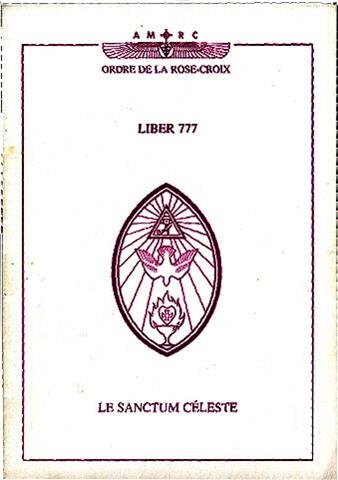
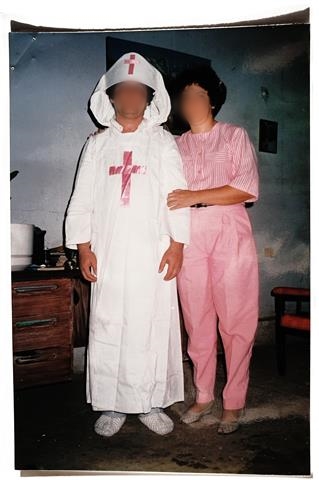
Conqueror of the Grail. Arnoldo Krumm–Heller was a complex and multifaceted figure whose influence in Latin America surpassed Aleister Crowley’s in the Anglophone world, despite Crowley’s greater posthumous fame. The text highlights Krumm–Heller’s commitment to gnosticism, homoeopathy, and political engagement, portraying him as a vitalist who rejected materialism in favor of a spiritual worldview shaped by indigenous traditions. Yet this professed disdain for materialism sits uneasily with his considerable wealth: in Mexico, he amassed land, petroleum stocks, a mortgage–free tenement with 21 apartments, and a villa in Mixcoac. His identification with Mexico over Germany reflects his ideological and national loyalties, though his admiration for Hitlerianism remains an uncomfortable undercurrent. The essay discusses Crowley’s libertinism and hierarchical O.T.O. structure, contrasting it with Krumm–Heller’s more pragmatic and socially engaged esotericism, particularly regarding sexuality and spiritual discipline. Yet his gnostic vision carries a latent authoritarianism, notably in his claim that gnostic teachings could mold individuals into quasi–fascist leaders. While his legacy persists in Latin American esoteric circles, his gender essentialism and patriarchal views, especially on sexual control and women’s rôles, cast him as a product of his time rather than a revolutionary thinker.
Baphomet and Rosycross. Before 1912, Krumm-Heller was already deeply embedded in esotericism: a Theosophist (since 1897) and Martinist, present at Gérard Encausse's (Papus) Paris experiments in 1906; from 1908 commissioned by Theodor Reuss with high Memphis–Misraim grades and authority for Mexico/Chile/Peru/Bolivia, under which — within Papus’s jurisdiction — he founded temples. In parallel he established a gnostic succession via E. C. H. Peithmann with his own Gnostic Church (including a rose-burning healing rite), published in the 1910 Humboldt Festschrift, and maintained ties with figures such as Franz Hartmann and the Freemason Jesús Medina — by 1912 a well-networked, ritually and organisationally hyperactive occultist. Around 1912, Krumm-Heller stood at the heart of revolutionary Mexico while continuing his esoteric publishing. Politically, he moved through the uprisings against José de la Cruz Porfirio Díaz Mori — the authoritarian long-time strongman who pursued “order and progress” via centralised power, oligarchic alliances, and foreign capital, and who fought against democratic opposition, free elections, and popular movements — and alongside Francisco I. Madero, the liberal-revolutionary champion of Sufragio efectivo, no reelección (effective suffrage, no re-election), who fought for democracy and the rule of law and against Díaz’s autocracy and repression. In this setting Krumm-Heller worked between field hospitals and the front, was pursued by opponents, and was ultimately imprisoned in the military gaol of Santiago Tlaltelolco — episodes he himself dates to 1912 and 1916 and later summarised in Für Freiheit und Recht (1917). In the same year, No fornicarás. Instrucciones sólo para ocultistas appeared in Mexico with Librería de la Viuda de Ch. Bouret — a slim, programmatic booklet securely attested for 1912, with an inscribed copy held in Madero’s library. → Arnoldo Krumm-Heller's No Fornicarás. Doctrinally, he adapted Peithmann’s hard gnostic idiom into a measured practice: a pre-Thelemic, gnostic-ascetic programme of continence, retention/Karezza and sublimation — “arousal yes, discharge no” — to conserve the “light-seed/Logos” and raise the seminal current to the brain/pineal gland; less a catalogue of virtues than a user’s manual of transmutation, and explicitly distinct from Aleister Crowley’s later libertine-operational sacramentalisation of sex. Only later, in 1930, did Krumm-Heller meet Crowley (and Karl Germer) in Berlin, by which time his Mexican-formed profile and printed programme were long in place; he was consecrated a gnostic bishop in 1939. He died on 19 May 1949 at 11:30 a.m. at his home in Marburg an der Lahn (Hesse, American Zone), bearing the style Dr Dr med. honoris causa. He left his third wife (apparently married in 1945), Maria Luisa Elisabeth Frieda Julie von Diringshofen of the Potsdam nobility, and his children: Hiram Aguirre (from his first marriage, in Concepción, Chile) and, by Carlotta, Guadalupe, Cuauhtémoc, Sieglinde, and the economist Parsival.
Dance the Adolf Hitler. Also featured are outtakes from Basil Thomson’s Queer People — Curious Visitor and a specially commissioned contribution by John Gaster, “Krumm–Heller in England.” 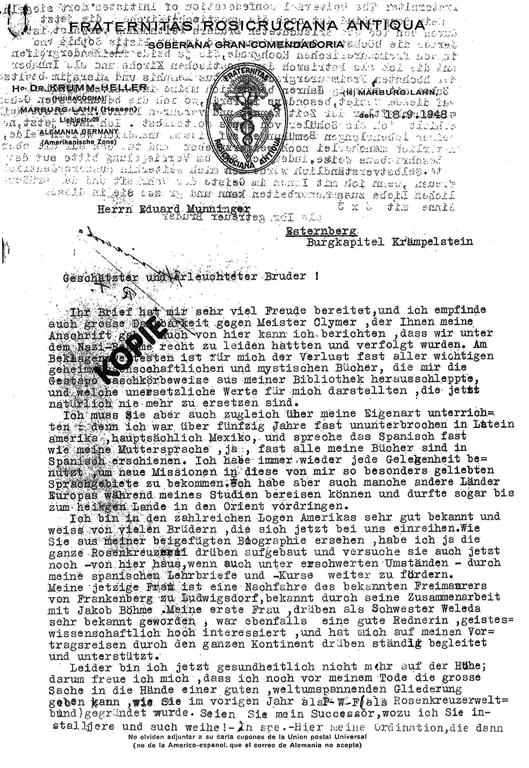
Eduard Munninger: Roses in Austria. Munninger was a key figure in the Austrian Rosicrucian movement, shaping it through his order, Antiquus Arcanus Ordo Rosae Rubeae et Aureae Crucis (A.A.O.R.R.A.C.), while also transforming Burg Krämpelstein into a center for artists and esotericists. His ambiguous political position during the Nazi era led to government investigations, but he was later rehabilitated by the denazification commission. After World War II, he sought to unite various Rosicrucian factions, exchanged writings with international esoteric figures such as Reuben Swinburne Clymer, and attempted to establish a “Spiritual Culture Union”. Despite his organizational ambitions, his order remained fragmented, plagued by internal disputes and rivalries with groups like A.M.O.R.C., which hindered its long–term success. A public conflict with the tabloid press resulted in a high–profile lawsuit against Bild–Zeitung, but his influence declined after his death in 1965, with his son Thomas continuing the order for a few more years. Later attempts to revive the A.A.O.R.R.A.C. failed due to internal power struggles, financial difficulties, and the overall decline of the Rosicrucian movement in Austria. The appointment of Munninger as the successor to Krumm–Heller is a particularly noteworthy event in the history of these organizations. A gallery of protagonists and documents. Of Booksellers And Other Grand Masters of the O.T.O. This article contains detailed biographies of Heinrich Traenker, Karl Germer, Henri Birven, Spencer Lewis, C.H. Petersen, and Eduard Munninger, who were all influential figures in the O.T.O. Additionally, it explores their relationships with the organization under the leadership of Reuss, Crowley, and H.J. Metzger. Furthermore, the article provides Henri Birven's "Obituary on Karl Germer", which sheds light on Crowley's visit to Berlin in 1930. 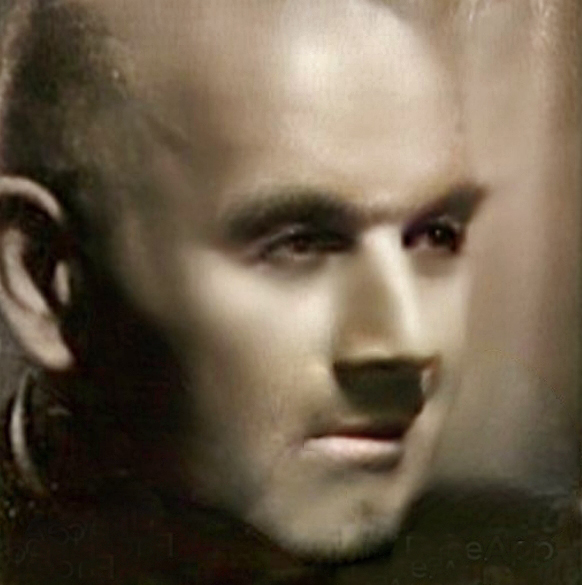
Heinrich Tränker was a vibrant figure in the tumultuous world of early 20th–century German esotericism. As a Leipzig bookseller, he navigated financial collapse, founded the Pansophic movement, and collaborated with numerous occultists, including Theodor Reuss and Aleister Crowley, albeit with deep skepticism regarding their methodologies. In 1921, as the German Grand Master of Reuss' O.T.O., Tränker established Pansophia, an organization dedicated to publishing significant Rosicrucian texts and early writings of Crowley. The term "Pansophia" had previously been used by Reuss and Krumm–Heller in their letterheads and stamps, reflecting its resonance within broader esoteric circles. Despite his disdain for the O.T.O., which he criticized as structurally flawed, Tränker embraced leadership rôles, adopting noms de guerre such as Henkelkreuzmann [Ankh Man], Recnartus, Greif or Garuda. Following Reuss' death in 1923, the remaining Tenth Degree members, including Tränker and the American Grand Master C.R.J. Stansfeld Jones, were tasked with electing a new Outer Head of the Order (OHO). At the ill–fated Weida Conference of 1925, they initially endorsed Aleister Crowley as a "World Saviour", only to swiftly retract their support. Pansophia disbanded after Traenker's death in 1956.
|
Fraternitas Saturni
Albin Grau first gained public recognition in 1922 through his work as production designer for the silent film Nosferatu — Eine Symphonie des Grauens. In addition to his contributions to UFA (Universum Film AG), he was active within the esoteric milieu of the Weimar Republic. In 1921, Heinrich Tränker founded the Pansophical Lodge. Albin Grau was appointed Chair Master (Meister vom Stuhl) of the Berlin Orient, and Eugen Grosche served as the lodge secretary. In 1925, a meeting took place in Germany between Aleister Crowley, Heinrich Tränker, and Karl Germer. Grau became entangled in the resulting conflicts and soon distanced himself from both Tränker and Crowley. In retrospect, he would characterize his association with Crowley as a mistake. This schism resulted in the fragmentation of the broader Pansophic network: Tränker’s O.T.O./Pansophia survived only in diminished form, while a new publishing initiative, Thelema-Gesellschaft in Leipzig, coalesced around Martha Küntzel and Karl Germer. From the Berlin working group of the Pansophic movement, the Fraternitas Saturni ultimately emerged under the leadership of Eugen Grosche. Grau was central to the intellectual and symbolic design of the new order/lodge. The Fraternitas Saturni refers to itself as a “lodge” rather than an “order” because it stages itself as a working, quasi–Masonic circle rather than as a hierarchical structure of obedience in the style of a chivalric or religious order. Calling itself a lodge signals ritual work directed toward individual consciousness and saturnian self–development; it frames activity as inward, technical, initiatory practice. Eugen Grosche: Bericht über die Konferenz im Jahre 1926 in Thüringen / Weida: Crowley's disastrous visit to the homes of Heinrich Tränker and Karl Germer.
Closure of the "Pansophic Lodge", 1928. Constitution of the "Secret Lodge Fraternitas Saturni", 1928. Grau features prominently in the inaugural issue of the lodge periodical of the Fraternitas Saturni. His writings and diagrammatic contributions serve as a foundational element of the order’s symbolic identity. The Fraternitas Saturni did not present itself as a continuation of prior systems, but rather as an autonomous construct with a distinct cosmological and ritual framework. History & ProtagonistenIn Nomine Demiurgi Nosferati.
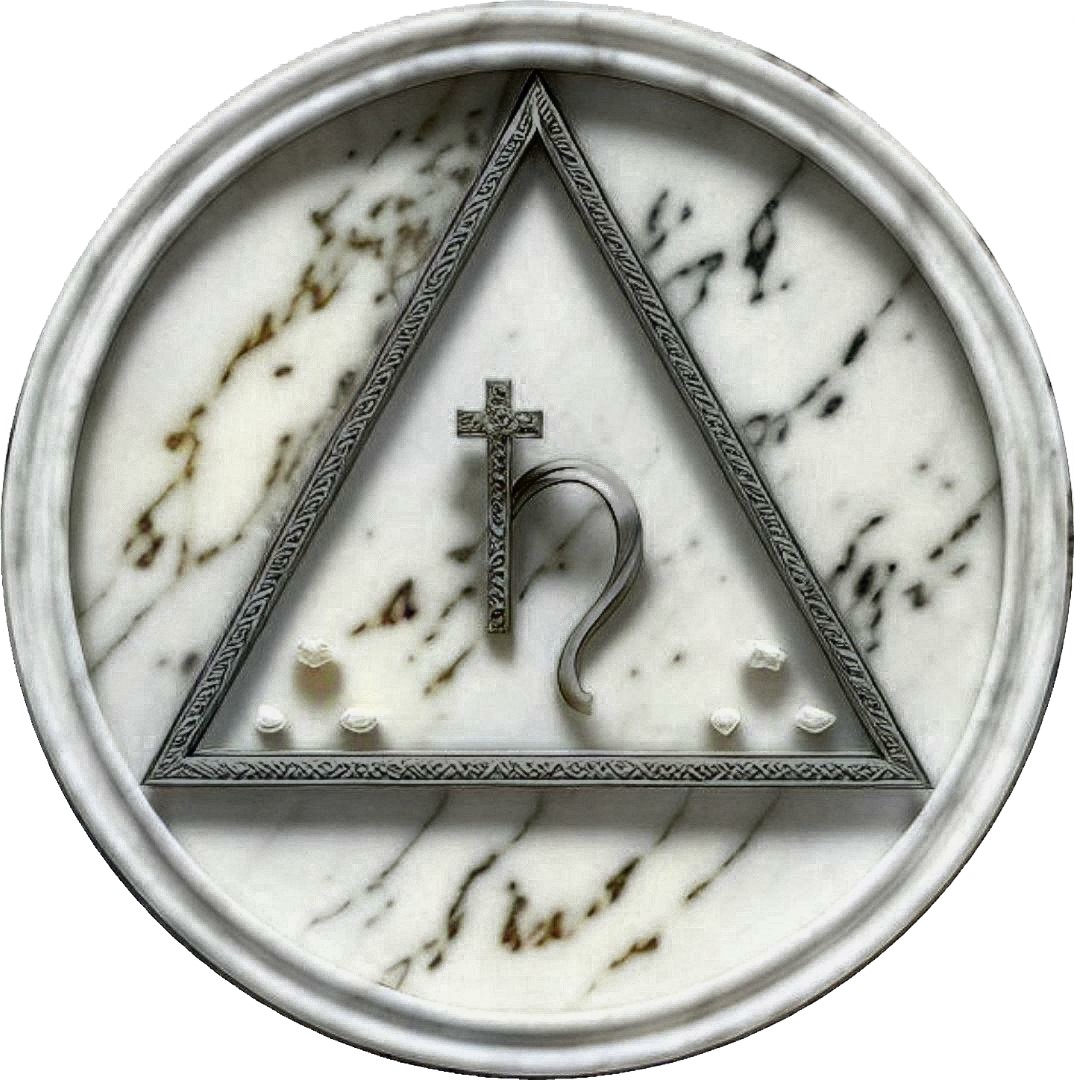
In my analyses, the term Saturn–Gnosis serves as an analytical concept to describe the esoteric doctrine of the Fraternitas Saturni, particularly as expressed in the "Blätter für angewandte okkulte Lebenskunst" (1950–1963). Though absent from the sources of this period, the term derives from the five–volume lodge journal published between 1928 and 1929 and is used here in an expanded sense. It encapsulates key elements: the metaphysical centrality of Saturn as a symbol of the transcendent boundary, of trial, necessity, and self–reflective will; and a corresponding model of knowledge grounded in radical self-recognition, personal accountability, and occult self–realization. The hyphenated spelling signals that the term denotes more than metaphor — it refers to a structurally embedded system that mimics esoteric gnosis, not in its traditional redemptive form, but as a framework of symbolic authority and ritual legitimation. During this period, the Fraternitas Saturni developed a symbolically dense, individualistic system of esoteric discourse centred on Saturnian iconography and metaphysics. At its core lies a tacit but deliberate ritual framework, shaped less by metaphysical speculation than by the consistent deployment of symbolic language, mythic imagery, and performative repetition. Saturn–Gnosis thus functions not as a classical gnostic system, but as a constructed apparatus of meaning — a ritual–semiotic mechanism legitimising hierarchy and sustaining esoteric identity. The term “gnosis” here describes the strategic invocation of epistemic depth and transcendent authority within a structure governed by ritual formalism and self–affirmation. It constitutes a de facto gnostic mode of thought, absent a formalized doctrine or coherent cosmology. Rather than conveying esoteric profundity, Saturn–Gnosis operates as a mechanism of symbolic self–construction — a narrative device rooted in retroactive projection, myth–making, and the assertion of symbolic control. Since the 1990s, esoteric literature on the Fraternitas Saturni has increasingly claimed that its central initiatory principle lies in the doctrine of “Fire and Ice.” This reading, however, stems more from retrospective reinterpretation by later members — seeking alignment with contemporary symbolic expectations — than from any grounded analysis of early Grosche–era texts. Former members and Grand Masters consistently report no encounter with such a doctrine in either lodge practice or theoretical instruction. Upon closer examination, references to “Fire and Ice” in Grosche’s writings emerge as primarily stylistic constructs — a semantic surplus lacking operative substance. The motif serves mood–setting and literary functions within the framework of Saturnian self–conception. Spiritual development is framed as a dialectic between destructive force (fire) and preserving form (ice), yet in practice, fire is subordinated to a controlled, authoritarian model of the self. The writings of the Fraternitas Saturni oscillate between lofty spiritual rhetoric and concrete magical technique. “Fire and Ice” thus fails to operate as a consistent or methodologically grounded model of knowledge and instead functions as mythopoetic ornamentation. The theme’s narrative elevation arose from a particular moment in the lodge’s reception history: in the 1990s, younger members began using it as a tool of self–stylization, presenting themselves as guardians of exclusive esoteric insight. Subsequently, the theme was echoed by academic voices — partly through personal proximity, partly through uncritical adoption — and diffused into scholarly literature with little scrutiny. The resulting semantic inflation owes less to historical substance than to a complex interplay of esoteric–semiotic prestige economy, international reception dynamics, and the usual dose of academic herd behavior. 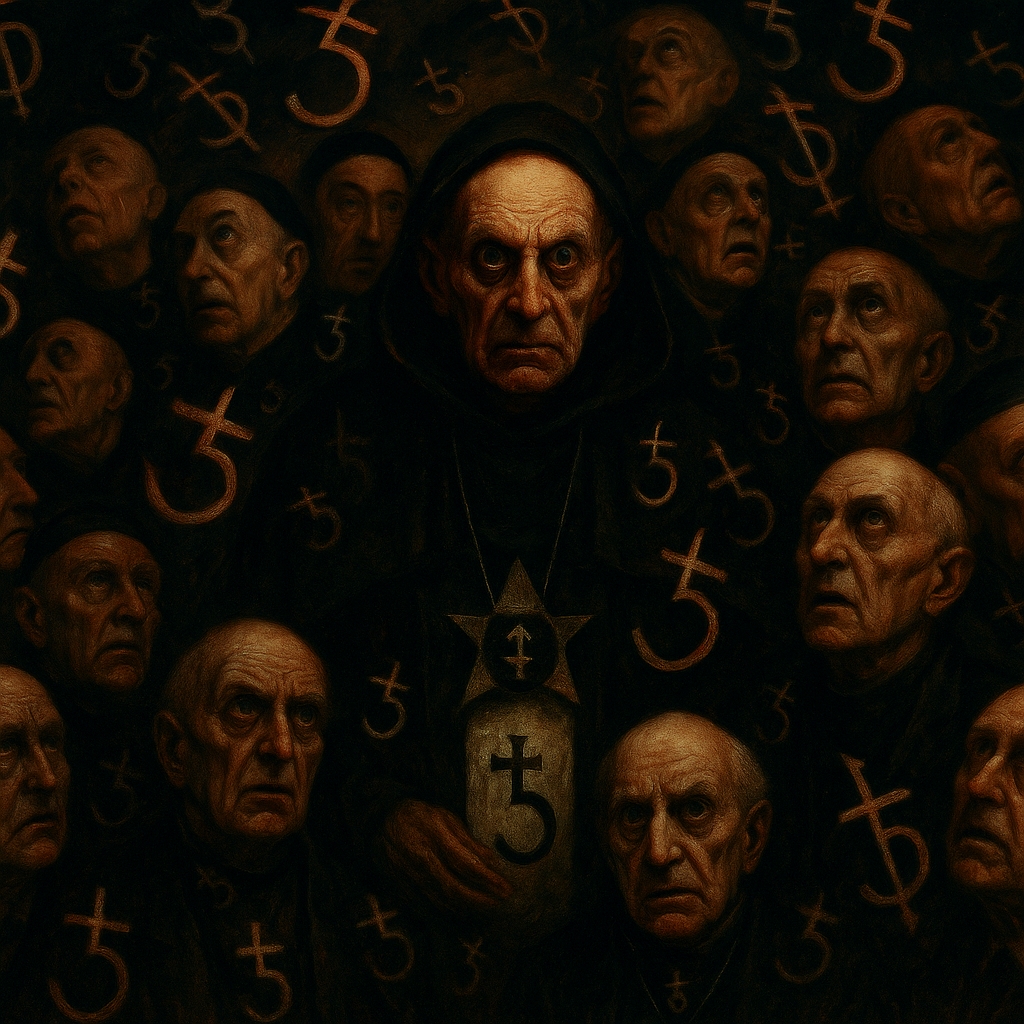
[AI–generated Image] Modern HistoryThe perception of the Fraternitas Saturni is primarily shaped by the focus on its protagonists. In addition to its founder Eugen Grosche (Gregor A. Gregorius), the Grand Masters Guido Wolther (Daniel), Walter Jantschik (Jananda), Johannes Maikowski (Immanuel), and a few others, it is also Johannes Göggelmann (Saturnius) who contributes significantly to the lodge’s public image. That the F.S. came into the crosshairs of the tabloid media roughly 25 years after World War II is largely due to a written report by Johannes Göggelmann, in which he claimed to have ritually killed a cat in the woods on January 8, 1955. Public interest in esotericism and occultism in the tabloid press surged from 1970 onward, as journalists such as Horst Knaut and scholars like Adolf Hemberger began citing Göggelmann — thereby introducing Saturnian lore to a wider, non–esoteric readership. Meanwhile, the esoteric and occult field underwent considerable shifts. Para–religious groups such as the O.T.O. and F.S. emerged from the ethnological margins of Western civilization into a kind of mainstream visibility — drawing the ire of politically and religiously motivated critics in the German–speaking world, who denounced them as ‘youth religions’. The death of Eugen Grosche in 1964 triggered a number of schismatic aftershocks, resulting in several groups — often eager to lay claim to the same or suspiciously similar–sounding names — each presenting itself as the legitimate heir to the Fraternitas Saturni. Contemporary Saturnian lodges differ markedly from their mid–century predecessors. Modern members — and many outside observers — display a notable hunger for stimulation and spectacle. This has led to both generational turnover and a certain thinning of the ranks, as attention spans for historical texts have dwindled. Nonetheless, none of the present–day F.S. or O.T.O. groups have managed to emancipate themselves from the ritualistic affectations of the early 1920s. They continue to adhere to the same pompous stylistic repertoire and rely on a similarly vague jargon — an apparent sine qua non of the occult mode. 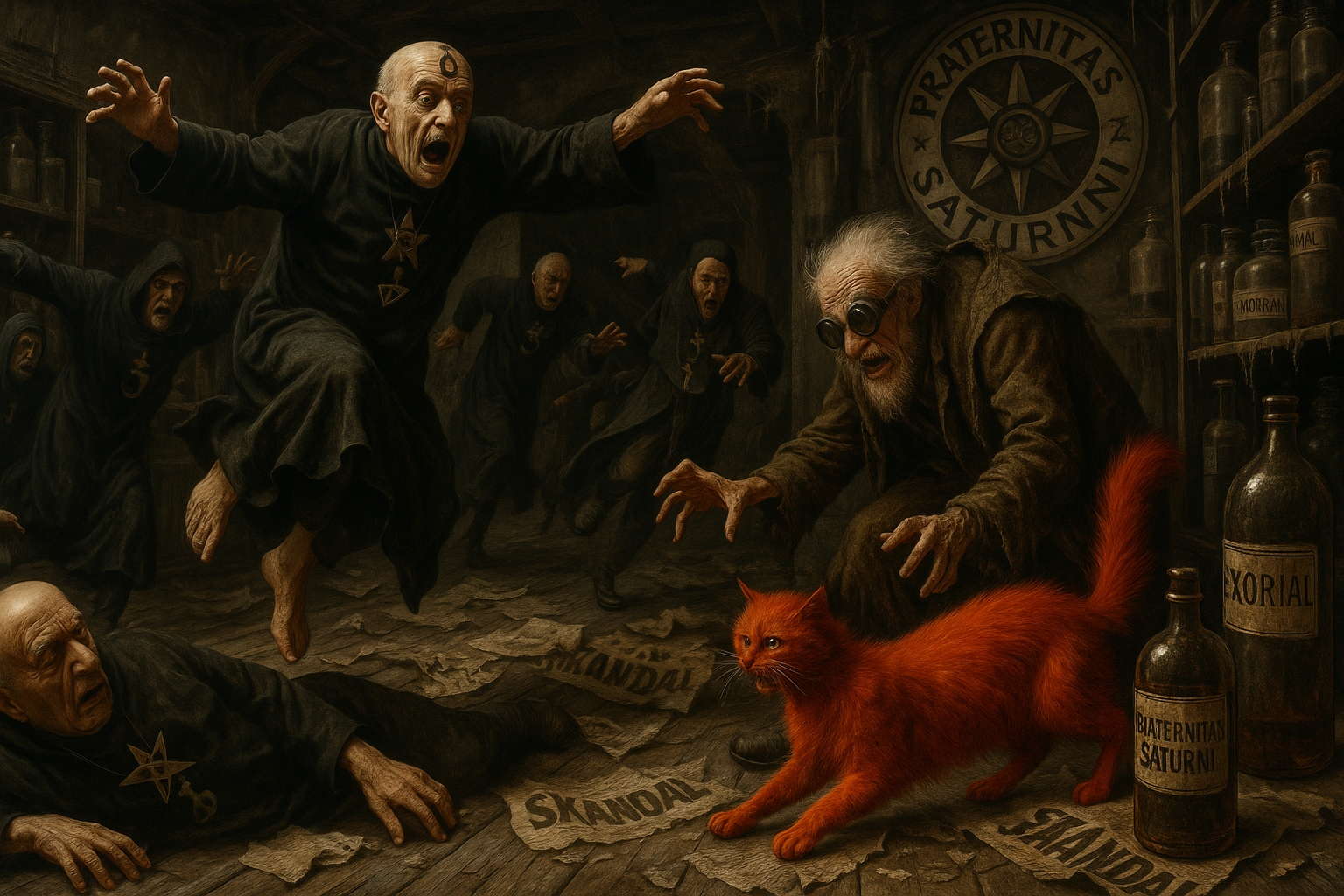
[AI–generated Image] Interne Konflikte und SymbolpolitikSkandalisierung, Mythos und Dekonstruktion des Johannes Göggelmann (Saturnius) in der Fraternitas Saturni. Im Fokus steht die interne wie mediale Skandalisierung Johannes Göggelmanns durch sowohl externe als auch logeninterne Akteure des esoterischen Feldes – namentlich Horst Knaut, Adolf Hemberger und Friedrich–Wilhelm Haack. Göggelmann erscheint dabei als randständige, zugleich jedoch paradigmatische Figur innerhalb der Fraternitas Saturni: ein marginalisierter Außenseiter, dessen Briefe, Zeichnungen und ikonographischen Notate zwar in diversen Nachlässen kursieren, jedoch weder systematisch aufgearbeitet noch eindeutig in den kanonischen Bestand der Loge integriert worden sind. Als Ursprung dieser Rezeption fungieren insbesondere die pseudowissenschaftlich aufgeladenen Veröffentlichungen Adolf Hembergers. Die darin enthaltenen, häufig entstellenden Zuschreibungen erfahren rasch Anschluss in konservativen Presseorganen, wo sie zur medienwirksamen Konstruktion eines Narrativs vom „okkulten Wahnsinn“ stilisiert werden. Die daraufhin einsetzende Medienspirale entzieht sich jeglicher kritischen Kontrolle und kulminiert in den eskalierenden Skandalisierungsdiskursen der Sensationspublizistik der 1980er Jahre. In deren Sog geraten auch andere Akteure der esoterischen Szene – etwa Walter Jantschik und Guido Wolther – und werden in ein assoziatives Netz aus Skandalrhetorik, Satanismusimaginarien und innerlogistischer Machtpolitik eingespannt. Die Biographien und Rollen von Johannes Maikowski, Horst Kropp und Dieter Heikaus illustrieren exemplarisch die instabilen Konstellationen zwischen charismatischer Selbstinszenierung, ritueller Autorität und medial vermittelter Resonanz innerhalb eines zunehmend fragmentierten und ideologisch übercodierten okkulten Milieus. Die vorliegende Analyse unternimmt daher den Versuch, Göggelmanns schriftliche und bildliche Äußerungen von der sie überlagernden Skandalisierungssemantik zu lösen und sie stattdessen als Ausdruck einer subjektiv motivierten, symbolisch überdeterminierten Form der Selbstsuche und transgressiven Sinnproduktion zu rekontextualisieren. Ein Text von Johannes Goeggelmann über die Saturnische Gnosis. Ulla von Bernus (1913–1998). Als selbsternannte „Satanspriesterin“ mit anthroposophischem Hintergrund, medialem Spektakel und juristischen Kontroversen avancierte Bernus zur umstrittenen Figur der westdeutschen Okkultszene. Außerdem mit von der Partie: Jürgen Gisselmann, Dieter Heikaus, Horst Kropp, Walter Krappatsch, Hermann Joseph Metzger – sowie ein irritierter prä–Alien Hansruedi Giger. Bruchlinien und Machtstrategien in der späten Fraternitas Saturni. Der stark bebilderte Text bietet eine dichte, quellengestützte Analyse der inneren Spannungsfelder der Fraternitas Saturni im Zeitraum von etwa 1958 bis 1970. Auf Grundlage zahlreicher Zeitzeugenberichte – insbesondere von Johannes Maikowski – wird detailliert rekonstruiert, wie es in der Spätphase der Leitung durch Eugen Grosche (Gregorius) zu einem offenen Machtkonflikt kam, dessen Nachwirkungen die Struktur des Ordens tiefgreifend veränderten.
Example: Horst Kropp, a student of Johannes Göggelmann, explored rituals involving erotic sensations despite facing significant challenges, including severe visual impairment and illiteracy. Correspondence from the 1960s reveals his efforts to summon the entity Exorial when he collaborated with Göggelmann and Walter Jantschik on various experiments but grew frustrated with the lack of support from peers such as Guido Wolther, even as substances like mescaline were introduced to enhance the rituals' efficacy. 
[AI–generated image based on text excerpts related to Horst Kropp.] Guido Wolther's sexmagical drawings. Wolther was a pivotal yet contentious figure in the Fraternitas Saturni, serving as Grand Master in the late 1960s. His tenure, though influential, was fraught with interpersonal conflicts, health issues, and the contentious establishment of suborders. By 1969, personal and financial crises led to his resignation and a sharp decline in his standing within the order. In the wake of the scandals surrounding him, all sexual connotations were excised from official rituals and any association with the GOTOS bust. His dramatic rituals and controversial art embodied the order’s darker, transgressive aspirations. „Nahema! Nahema! Uuu! Ole-Ona-Uüä-Uuu! Aie, Aonie, Lilith, Lilith! Lilith! Oron chite haloja aroen latistén. Ka eron maggo holler ka nono ka hel. Maguth ka craim he! Yaro… Sat! Elohim! Marazoth!! Hoo…!! Hu!!!“ Hallo ! Hier spricht die Skorpionfrau! – Guido und Miriam Wolther inszenieren die optische Ästhetik der Trivialunterhaltung der frühen 1960er-Jahre so auffällig, dass Edgar-Wallace-Filme, Science-Fiction- und Gruselheftchen wie Vorlage und Bedienungsanleitung zugleich wirken. Wolthers sogenannte „Pluto-Evokation“ ist ein Ritual aus Chemie, Popkultur-Bildwelten und interner Logenpolitik. Der Text verfolgt, wie sich Ehekrise, gesundheitlicher Zerfall, die Instrumentalisierung von Miriam als Medium, Mikropolitik in der Loge und das Wegorganisieren von Kritik zu einem Herrschaftsdesign verschränken, das auf Kontrolle von Deutung, Archiv und "Erfahrung" zielt. Eingebettet ist dies in ökonomische Abhängigkeiten und nicht aufgearbeitete NS-Biografien innerhalb der F.S., die – trotz Grosches antifaschistischer Haltung – aus finanziellen und machtpolitischen Gründen geduldet werden. Collection of texts by Walter Jantschik. Jantschik attempted to resolve the financial irregularities caused by Wolther but quickly grew disillusioned, resigning from his position just six months after assuming office in 1969. In 1970, F.S. member Günther Diefenthal shot and killed Jantschik's brother–in–law with a small–caliber rifle at Jantschik's residence. The ensuing criminal trial brought the Fraternitas Saturni into public awareness, stirred up by sensationalist tabloid journalism. Jantschik is a quintessential order–swinger, actively involved with some of the most curious orders for over half a century. His obsessive documentation and philosophical reflections have significantly enhanced the F.S.'s intellectual legacy. Die baphometische Doxologie – Walter Jantschiks Versuch, ein Weltmodell aus Diagrammen, Lichtcodes und Selbstreferenz zu errichten. Im Vergleich mit Johannes Maikowski – einem anderen Konstrukteur im esoterischen Orbit. Dokumente zur Baphometischen Doxologie von Walter Jantschik. 
Excerpt from a painting by Johannes Maikowski Johannes Maikowski (b. January 30, 1925) recounted his formative years in a noble, antifascist family, emphasizing his education at the Klosterschule Rossleben, later converted into an SS–Heimschule, which led to his expulsion due to incompatibility with Nazi ideologies. During World War II, he trained as a glider pilot and participated in military operations, witnessing the violence and absurdities of war, including forced enlistment and the transformation of his noble heritage under Nazi oppression. Fleeing persecution, he enlisted in the French Foreign Legion in 1945, serving in Indochina and sustaining severe injuries. After returning to Germany in 1950, he pursued his Abitur and dentistry studies in the DDR but was arrested and imprisoned in Rummelsburg due to his intention to defect to the West. Following his release and flight to West Germany in 1959, he underwent significant rehabilitation and worked as a scientific consultant in the pharmaceutical industry, achieving stability despite lasting health challenges. In 1965, Maikowski became Grand Master of the Fraternitas Saturni. Online mit, von und über Johannes Maikowski
Kontext:
Bücher zum Kontext:
Video–Interwiew. Maikowski a traduit plusieurs articles en français pour ce site web. 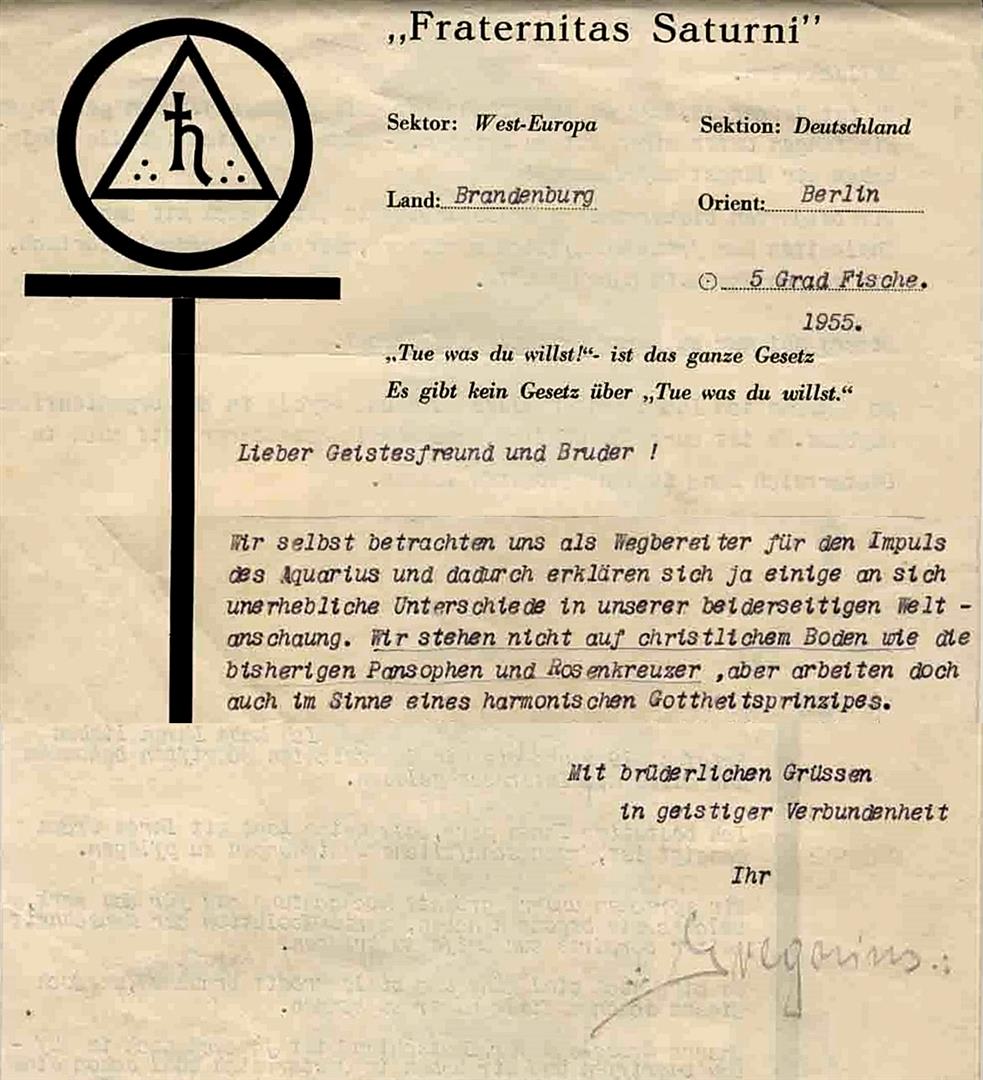
[Collage] 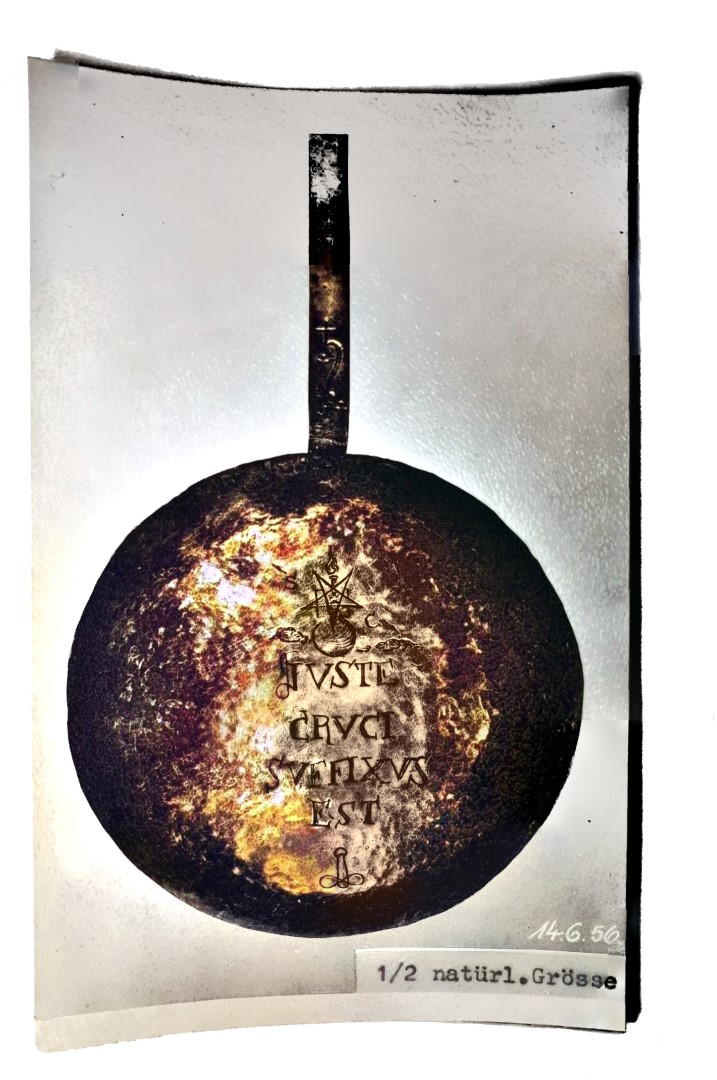
"juste cruci suffixus est" Censer of the Fraternitas Saturni [Colored with AI] Selbst- und Außenwahrnehmung im RückblickThe GOTOS Bust as a Symbolic Object between Profane Gift and Subsequent Egregore: A Paradigmatic Illustration of the Symbolic Politics of Self-Sacralization. The text explores the esoteric practices and beliefs of the Fraternitas Saturni, focusing on its use of imagery, ritual, and the concept of an egregor or group spirit. Adolf Hemberger links the GOTOS bust, representing the egregor of the Saturnian sphere, to the lodge's mystical framework, emphasizing its duality and transcendent nature. Ritual accounts, such as the creation of a Saturn Demon through mirror magic, underscore the lodge's focus on tangible manifestations of magical and astral energies. These experiments are portrayed as both transformative and perilous, with practitioners experiencing exhaustion and spiritual disturbances. Artistic and ritualistic depictions, including the infamous Exorial narrative, illustrate the lodge's integration of visual and narrative media to evoke, channel, and interact with metaphysical entities, bridging imagination and occult practice. Nosferatu's Baby — Too Hot To Handle. Keywords: Hostility Towards Women in Religion and Occultism, Nosferatu's Baby, People Out of Stone, Baphomet and the O.T.O., Knights of the Neurosy-Cross, Fraternitas Rosicruciana Antiqua, Gnosis in Appenzell, defect in the oedipal phase of the New Aeon. Saturn-Gnosis: a portrait of the real Fraternitas Saturni. The contrast between Crowley’s Thelemic principles, which champion individual spiritual transcendence, and the F.S.’s collectivist focus on sustaining a vampiric égrégore highlights a profound divergence in occult philosophies. The F.S.’s preoccupation with hierarchical degrees and the material embodiment of spiritual entities underscores the tension between esotericism as a path to personal enlightenment and its transformation into a mechanism of institutional control. Keywords: Homunculi and Crowleyan Practices, Jack Parsons and the ‘Moonchild’ Experiment, The Fraternitas Saturni and the Égrégore, Sex Magic and Ritualistic Hierarchies, Cultural and Mythological Underpinnings, The Occult as a System of Power, The Moonchild as Legacy and Burden.
Saturn's Art of Living and Loving. Keywords: Founders and Influence (Eugen Grosche, Johannes Göggelmann); Artistic and Occult Practices (Göggelmann, Guido Wolther); Organizational Dynamics (Walter Jantschik). F.S.'s themes of sexuality and darkness, rooted in its rituals and public perception, symbolize broader cultural and psychological tensions. Adolf Hemberger's prolific but methodologically flawed publications popularized F.S. lore but invited skepticism.
![Eugen Grosche [Gregor A. Gregorius] Fraternitas Saturni In Nomine Demiurgi Homunculi](https://www.parareligion.ch/2010/homunc/2.jpg)
Eugen Grosche [Gregor A. Gregorius] Photographiert von Johannes Maikowski Weitere Photos: Eugen Grosche |
More Key FiguresHermann Joseph Metzger, a Swiss baker and former communist, was initiated in the O.T.O. by Alice Sprengel in Davos, Switzerland in 1943. Due to his visa for German territories under Allied occupation, Metzger became a messenger for multiple organizations, including the Order of the Illuminati and various Thelemite groups in Europe. After the death of Grosche in 1964, Metzger attempted to take over the Fraternitas Saturni and saw himself as the "mother lodge" for all organizations following the Law of Thelema. Felix Lazerus Pinkus founded the section "Psychische Forschung" of the Swiss Cultural Society and, in 1945, also established a "Psychosophische Gesellschaft" with the aim to "communicate esoteric values and provide psychological help". In his esoteric group were notable figures such as Karl Brodbeck, Hans Rudolf Hilfiker, and many others. Soon, Pinkus' "Psychosophische Gesellschaft" evolved into the umbrella organization for H.J. Metzger's compilation of Orders. Metzger regarded Pinkus as his spiritual father and Grandmaster of the O.T.O. in Switzerland. Thelema in Appenzell ? This article offers brief biographies of the individuals who aided Hermann Joseph Metzger in establishing his collection of both Thelemic and non–Thelemic orders in the Canton Appenzell of Switzerland. The persons involved include Annemarie Aeschbach, Anita Elisabeth Borgert, and Rosalie Metzger–Strickler, who was Metzger's wife. The piece also includes interviews with Hansruedi Giger and Ulla von Bernus. Additionally, the work of this Thelemic group is highlighted, which, during the 1950s, was the only organization in the world to publish books by Aleister Crowley and to have a functioning lodge. However, their public activities eventually drew the attention of the tabloid press, leading to a significant scandal, and the group was forced to withdraw completely from public view. The Psychosophical Publishing Company. The terms "Psychosophic" or "Psychosophical" have their origins in a lecture delivered by Rudolf Steiner in 1910, entitled 'Anthroposophy — Psychosophy — Pneumatosophy'. Hermann Joseph Metzger adopted the term "Psychosophie" to describe various undertakings, including his publishing enterprise, as well as an umbrella term for his collection of orders. This article explores Metzger's associations with a number of notable figures, including Franz Bardon, Lanz Liebenfels, the Ordo Militiae Crucis Templi, Memphis Misraim, and the Argenteum Astrum. Additionally, the article delves into Metzger's views on Thelema. What is the A.·.A.·.? Is it an official organization in the mundane world? There have been attempts to control the Argenteum Astrum, and certain individuals claim links to it, such as in the continuum of all XI° variations. Can we identify independent lineages of the A.·. A.·.? Here is a lineage that is seldom mentioned: that of Charles Waldemar. He maintained correspondence with Metzger's group, featured in their publications, and appeared to serve primarily as an ornamental presence given that Friedrich Mellinger was their primary contact for matters concerning the A.·.A.·.. Waldemar was a Swiss author with interests spanning esoteric practices, and alternative health technologies. He engaged in occult correspondence, particularly regarding rare Aleister Crowley manuscripts, and presented himself as a high–ranking initiate of the A.·. A.·.. His work combined mystical, psychological, and practical self–improvement themes, reflected in his publications on erotic energy, self–confidence, and magic, as well as in his commercial ventures selling electro–acupuncture devices and other alternative health products. Despite the grand claims of literary endorsements from figures such as Thomas Mann and Hermann Hesse, Waldemar’s reputation appears entangled with a blend of genuine esoteric enthusiasm, entrepreneurial opportunism, and the self–mythologizing tendencies characteristic of alternative spiritual figures. 
The Ordo Militiae Crucis Templi experienced a turbulent turn in 1962 when Marcel Claude, an irregular hierophant of the Memphis–Misraim rite, proposed Metzger as a member. Metzger's induction caused uproar among prominent members, such as Baron E.B. Pflüger, who resigned in protest, citing Metzger’s financial dependence on his wife and lack of a stable home. The OMCT subsequently restructured itself in 1966, formally severing ties with Metzger. Despite his removal, Metzger persisted in claiming the title. By 1969, Metzger and his network transformed their ventures into eclectic spiritual enterprises, including hosting seminars at the “Abbey of Thelema” in Switzerland, merging esotericism with practical pursuits like ballet training. This bizarre saga encapsulates the O.T.O.’s oscillation between esoteric gravitas and mundane absurdity, ultimately blending high ritual with small–town tourism in Appenzellerland. 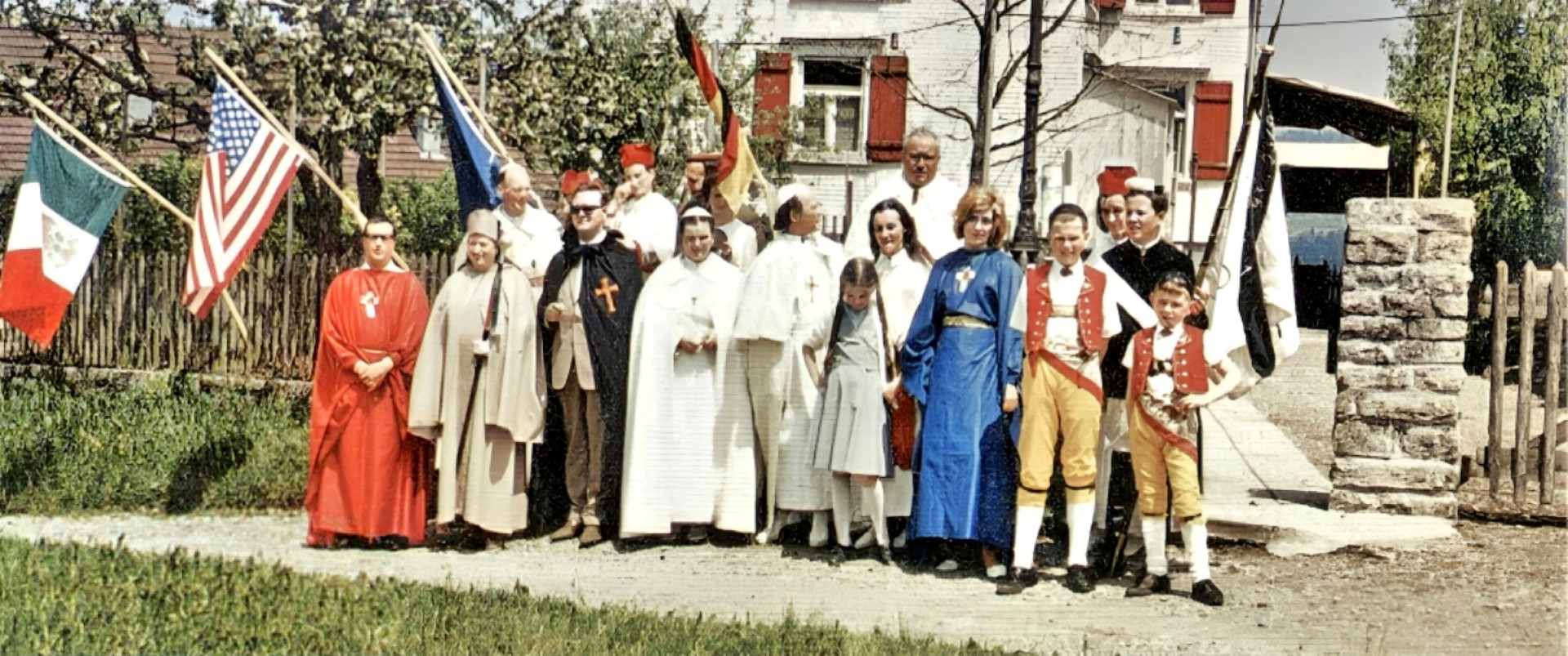
Karl Germer: Never the OHO of Crowley's O.T.O. Germer’s life was marked by his shifting allegiances, personal struggles, and complex relationship with Crowley’s legacy. A veteran of World War I, Germer’s later experiences with political persecution — including imprisonment by the Gestapo and internment in a Nazi concentration camp — shaped his worldview and his writings, such as "Protective Prisoner No. 303". His financial stability, largely secured through his marriage to Cora Eaton, allowed him to support Crowley, despite a complicated and, at times, contentious relationship with him. The FBI’s surveillance and reports on Germer, suggesting his Master Race sympathies, further complicate his historical position, revealing tensions between his personal beliefs and his rôle within esoteric circles. Although many sought him as a leader of Crowley’s O.T.O., Germer himself remained ambivalent, admitting that his real interest lay in the A∴A∴ rather than the O.T.O.’s organizational structure. His detachment from formal leadership alienated key members, leading to factionalism after Crowley’s death. Upon his death in 1962, Germer left no clear successor, which resulted in disputes over the future of the O.T.O., highlighting the inherent instability in the movement’s leadership. His legacy remains contested, not only as Crowley’s designated heir but as a figure whose personal contradictions continue to provoke debate among Thelemic scholars and practitioners. Karl Germer about himself. Germer’s autobiography recounts a life of persecution and survival during the mid–20th century. As a member of the Ordo Templi Orientis, he faced harassment from the Nazi regime and indifference from Allied authorities. Imprisoned in Nazi concentration camps like Esterwegen and later in French internment camps, he endured brutal conditions marked by starvation, disease, and neglect. His account highlights the moral and administrative failures of the French, whose inefficiency worsened the suffering of thousands of refugees. Despite obtaining a visa through his wife’s efforts, bureaucratic delays kept him trapped in inhumane conditions for months. Germer describes the camps as “hell”, emphasizing the systemic cruelty inflicted on detainees, many of whom were Jewish refugees willing to fight against the Nazis. His eventual release came only after significant diplomatic intervention. Documents and photographies re: Karl and Sascha Germer. The FBI files of Karl Johannes Germer reveal that many pages and entries contain repetitive information. But of particular interest is file 100–18329, dated November 2, 1942, which details allegations that Germer made statements regarding the concept of a Master Race. Some of Karl Germer's Personal Letters. Sascha Germer's Diary about Karl Germer's death. H.J. Metzger's Manifesto 1963 — With biographical notes on Karl Germer. The 1963 Sonderausgabe "Oriflamme" serves as both an obituary and a manifesto, marking the death of Germer and the transition of leadership within the O.T.O. The text exhibits hagiographic tendencies, portraying Germer as a martyr–like figure whose suffering and perseverance exemplified Thelemic ideals. Notably absent from this narrative, however, is the fact that the Swiss group had expressed interest in December 1950 in the virulent anti–Semite Lanz von Liebenfels (1874–1954), founder of the Ordo Novi Templi (ONT). Liebenfels, often described as the man who gave Hitler his ideas, was posthumously honored by Metzger, who, in his 1954 obituary, praised him as the "last Grand Master of the Templars" and a man of "unbending conviction and the highest virtue" — and in 1956 even published on his racial theory of "hereditary hygiene". Metzger’s hypocrisy was certainly not lost on the Jewish men and women in his circle — for example, Friedrich Mellinger — and would soon have consequences. The 1963 Sonderausgabe "Oriflamme" functions as a document of transition, sanctification, and consolidation — but also of opportunism — reflecting the Swiss O.T.O.’s ongoing efforts to maintain legitimacy and cohesion in the wake of a leadership change. Factually speaking, at this time, the Swiss O.T.O. was the only O.T.O. worldwide — with lodges, rituals, and all the bells and whistles. Legal dispute after Karl Germer's death. Following Germer’s death, Hermann Joseph Metzger demanded that Sascha Germer transfer all O.T.O. properties to Switzerland, asserting his claim as Germer’s successor. Sascha acknowledged Metzger’s rights but emphasized that Friedrich Mellinger was co–executor, though she had lost contact with him. When Mellinger was located, he denounced Metzger’s leadership as illegitimate, accusing him of self–appointment and violating Germer’s will. Despite Metzger’s legal efforts and claims based on Swiss O.T.O. practices, the ‘Caliphate’ faction later rejected his authority, citing Mellinger’s objections. Ultimately, legal experts deemed further action pointless, leaving Metzger’s claim unresolved.
Gnosis on Stage: Friedrich Mellinger. Mellinger played a nuanced rôle in the postwar leadership struggles within the O.T.O. Initially favored by Karl Germer as a key figure in European Thelemic circles, Mellinger’s intellectual rigor positioned him as a mediator in the contested succession of O.T.O. leadership. However, tensions emerged, particularly with Hermann Joseph Metzger, who sought recognition as Outer Head of the Order (O.H.O.) after Germer's death in 1962. While Mellinger translated Crowley’s works and supported Metzger’s initiatives to some extent, he distanced himself from Metzger’s self–proclaimed authority, criticizing what he saw as egotism and opportunism. Mellinger’s stance complicated the leadership debate, as he was named co–executor of O.T.O. matters in Germer’s will but refrained from fully endorsing Metzger. His critical perspective undermined Metzger’s claims while highlighting deeper divisions within the organization. Mellinger ultimately shifted focus to Theosophy, leaving the fragmented O.T.O. to grapple with its succession disputes. His rôle in these events underscores his intellectual independence and his discomfort with the factionalism that marked the post–Crowley era of the O.T.O.
Karl Germer's correspondence with Friedrich Mellinger about H.J. Metzger, Pinkus, Grosche and Traenker. 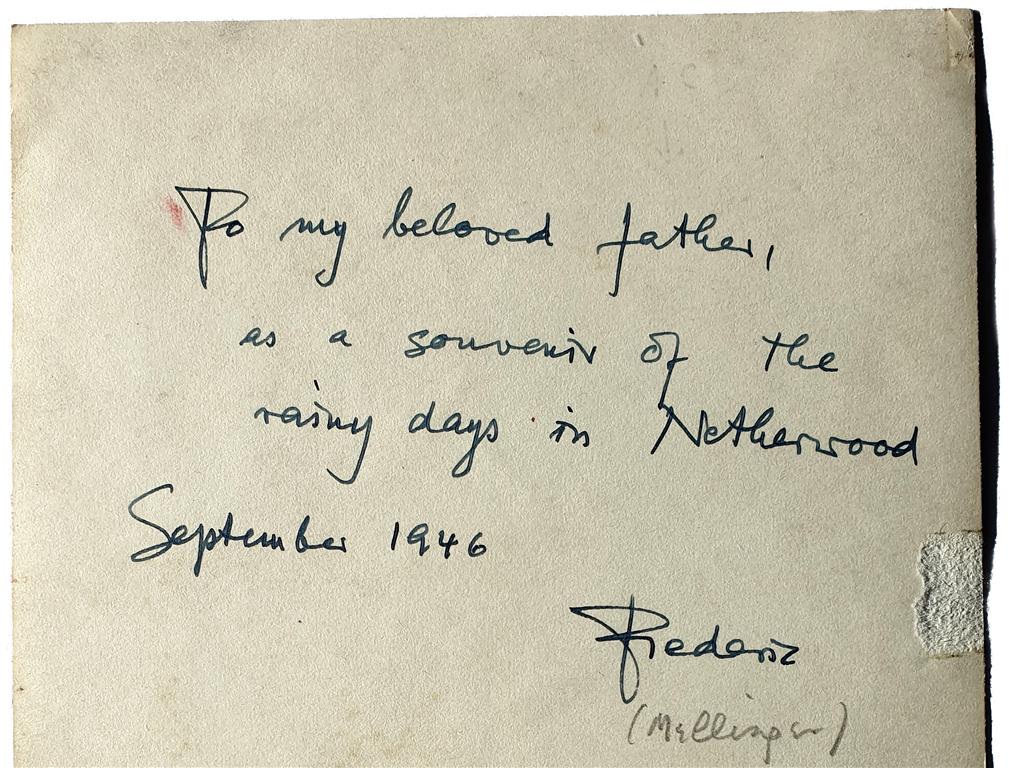
Gabriel Montenegro y Vargas (1907–1969) was a Mexican–American physician and esotericist who moved through the Thelemic world with deliberate detachment. Though closely connected to figures like Karl Germer, Jane Wolfe, and Helen Parsons Smith, he never formally joined the O.T.O. During the 'Caliphate' succession crisis, he challenged Grady Louis McMurtry’s claims and declined Hermann Joseph Metzger’s offer of leadership after visiting his Swiss stronghold in Stein. For a brief time, he became entangled in the convoluted politics surrounding Walter Englert’s Frankfurt-based Illuminaten-Orden. He left behind a final request: that all his documents be destroyed. Fortunately, not everyone obeyed. Henry Birven. Henri Clemens Birven, born in 1883 in Aachen, earned a doctorate in philosophy in 1913 and later became an electrical engineering lecturer in Berlin after surviving Russian captivity during World War I. His esoteric pursuits, influenced by Eliphas Lévi, led him to found 'Hain der Isis' in 1927, publishing works by Aleister Crowley and others. While initially collaborative, Birven criticized Crowley and Theodor Reuss as frauds, leading to strained relationships. Birven and associates delved into esoteric myths, including Anna Sprengel’s alleged rôle in the Golden Dawn. By the 1930s, conflicts with Crowley and Heinrich Tränker diminished Birven’s influence, and he was accused of aiding the Gestapo against Karl Germer. In the 1950s, he opposed Crowley’s legacy, labeling his works immoral and drug–influenced. Birven died in 1969. Martha Küntzel. Friedrich Lekve. — Dreamland Thelem Chassidim. Küntzel and Lekve were key figures in the evolution of Aleister Crowley’s Thelema in 20th–century Europe. Küntzel, originally aligned with Theosophy, became a fervent Thelemite after meeting Crowley in 1925, but her uncritical admiration for Adolf Hitler estranged her from Crowley and the broader movement. Her translations of Thelemic texts, particularly Liber AL, were criticized for their naivety, and her later belief that Hitler embodied Thelemic principles tarnished her legacy. Lekve, by contrast, sought to synthesize Thelema with Hasidic mysticism, coining the term "Thelem Chassidim" and creating his own esoteric order. While devoted to Crowley, Lekve diverged from orthodoxy, focusing on personal mystical experiences and Qabalistic practices. His civic contributions as mayor of Hildesheim highlight his ability to balance spiritual pursuits with practical leadership. Both figures struggled with financial and organizational challenges, facing criticism from other Thelemites like Eugen Grosche and Karl Germer. Küntzel’s work was overshadowed by her political entanglements, while Lekve’s innovations remained peripheral to the mainstream Thelemic movement. Their legacies reflect the tension between adapting esotericism to contemporary contexts and maintaining doctrinal cohesion. Together, they illustrate the complexities of Thelema’s expansion in an era of social and political upheaval. Friedrich Lekves „Thelemische Exercitien Klasse D6“, Die Schwarze und die Weisse Messe, stellen eine pseudo-liturgische Messe dar, die christliche Hochmess-Elemente, jüdisch-mystische Begriffe und thelemische Formeln zu einem synkretistischen Ritualtext verschmilzt. Zentrale Figur ist ein „Fürstpriester“, der als Repräsentant eines eigens konstruierten „ELOHIM THERION“ auftritt und ein reales Tieropfer vollzieht – ein Bruch mit Crowleys Praxis wie mit der Symbolik von Nuit. Die Messe missversteht thelemische Prinzipien wie Nuit, Hadit und Ra-Hoor-Khuit als trinitarische Gottheiten und ersetzt Crowleys subversive Ritualsprache durch affirmativ-christliche Sentimentalität. Insgesamt erscheint Lekves Messe weniger als thelemisches Ritual denn als ästhetisch überfrachtetes Regressionsphänomen im Gewand einer sakralen Inszenierung. C.H. Petersen — Abramelin in the Abbey of Thelema. Carl Heinz Petersen, born January 14, 1912, in Bendestorf near Hamburg, established an Abbey Thelema in Hamburg and maintained ties with European Thelemites through Karl Germer and Gerald Yorke. He was regarded by Germer as a promising figure within the A∴A∴ and visited Yorke in London in 1952, as well as H.J. Metzger's Abbey of Thelema in the village of Stein, located in the canton of Appenzell, Switzerland, in 1953. Petersen’s translations, including Crowley’s Gnostic Mass and Liber AL vel Legis, were published through both Metzger and Eugen Grosche, leading to disputes over rights and accusations of theft by Metzger. His relationships with key figures like Friedrich Mellinger and Friedrich Lekve remained ambiguous, contributing to ongoing tensions within the O.T.O. hierarchy. After his cousin and sexual–magical partner Frau Pingwill committed suicide in 1956, Petersen died on April 4, 1957, with rumors suggesting complications from the Abramelin operations. Metzger later claimed control over Petersen’s legacy, asserting himself as a central figure in the Thelemic community.
Carl William Hansen — Denmark. Carl William Hansen (Ben Kadosh), born on October 11, 1872, in Copenhagen, was a key figure in early 20th–century esotericism, blending multiple traditions under his leadership. Initiated into the Order of the Martinists in 1898 and rising to Danish Delegate by 1917, he received various charters in 1921 from Theodor Reuss, including those for the O.T.O., Memphis–Misraim, and Hermetic Brotherhood of Light. Hansen founded and dissolved several esoteric lodges, often facing challenges such as irregular masonic practices and internal disputes, before resigning from larger orders in 1931. After his death in 1936, his successor, Grunddal Sjallung, continued his work, establishing a distinct, non–Crowleyan O.T.O. branch and later founding the Sovereign Saint John of Jerusalem Order, which focused on humanitarian efforts. Sjallung’s successors, including Johannsen and Pelle Bull, maintained and evolved Hansen’s legacy, often interacting with other esoteric groups but facing challenges in gaining broader recognition.
The New Illuminati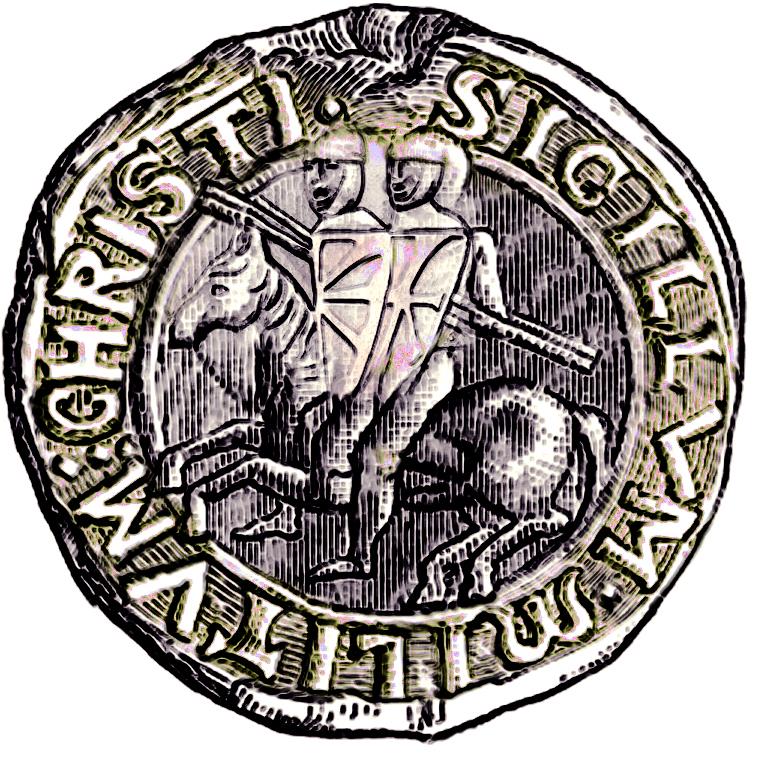
Illuminati and Templars — From Leopold Engel to Walter Englert, a 18° of the Fraternitas Saturni. The term Illuminati refers to several historical secret societies that purportedly sought to promote enlightenment and knowledge. Today, the term is often used to refer to various alleged modern–day secret societies or conspiracies. Around the turn of the century, Reuss and Leopold Engel attempted to revive the Order of Illuminati (OI), originally founded by Adam Weishaupt in the eighteenth century. However, their efforts were largely unsuccessful. Despite this, several groups affiliated with Engel persisted through both World Wars and eventually came under the presidency of Metzger in 1963. Metzger viewed the OI as a structure that could be utilized in his consolidation of various orders, including the Ordo Templi Orientis and the Fraternitas Rosicruciana Antiqua. He swiftly incorporated the Ecclesia Gnostica Catholica into the upper echelons of his OI. Paul Ruediger Audehm: Co–founder of the New Illuminati in Frankfurt. Audehm emerges as a central yet paradoxical figure in the labyrinthine developments surrounding Walter Englert and the Frankfurt–based Illuminati Order (I.O.). Introduced by Englert in 1964 to the Swiss O.T.O. in Stein, a village in the canton of Appenzell, Audehm’s trajectory reflects the broader conflicts and ideological fissures of the time. Although ostensibly subordinate to Englert as a "Chancellor" within the Freiherr Adolf von Knigge Lodge, Audehm’s dissatisfaction with Metzger’s leadership — and eventually with Englert’s provincial worldview — marks him as a catalyst for disruption. His ironic admission, "We have none; we’ll create one," regarding the I.O.'s gradation system, underscores his pragmatic, if chaotic, approach to occult hierarchy. By 1967, Audehm critiques Metzger’s inflated titles and alleged moral shortcomings, cementing his rôle as a whistleblower and disrupter within the order. His eventual split from Englert further emphasizes his inability to reconcile with the narrow constraints of the Frankfurt group, leaving behind a legacy of unorthodox reinvention and fragmentation. Audehm’s participation is both a reflection of the I.O.’s ambitions and a sharp critique of its insular practices. H.J. Metzger vs W. Englert: Court Case. Walter Englert joined the Fraternitas Saturni in 1962. He was a druggist by trade and provided practical materials for the rituals. His rapid ascent within the F.S. hierarchy culminated in his attainment of the 18th degree in 1963. The death of F.S. leader Eugen Grosche (Gregorius) in 1964 marked a turning point for Englert and the F.S. Englert left the F.S. in the wake of Gregorius’s passing, seeking to establish new frameworks for esoteric work. In 1964, Metzger initiated Englert into the Ordo Illuminatorum, granting him the title of X° for Germany. Englert’s most prominent post–F.S. endeavor was the establishment of the Frankfurt Illuminatenorden. The legal battles between Metzger and Englert from 1971 to 1974 illustrate the interplay of personal ambition and institutional politics within esoteric movements. Central to the dispute was the use of the name “Illuminatenorden” and competing claims to legitimacy and authority within the esoteric community. Englert’s eventual legal victory, won on a technicality, allowed him to retain the title and naming rights of the Illuminatenorden. Karl Brodbeck: Der Illuminatenorden. Texts by Leopold Engel: Texts by Hermann Medinger:
The New Templars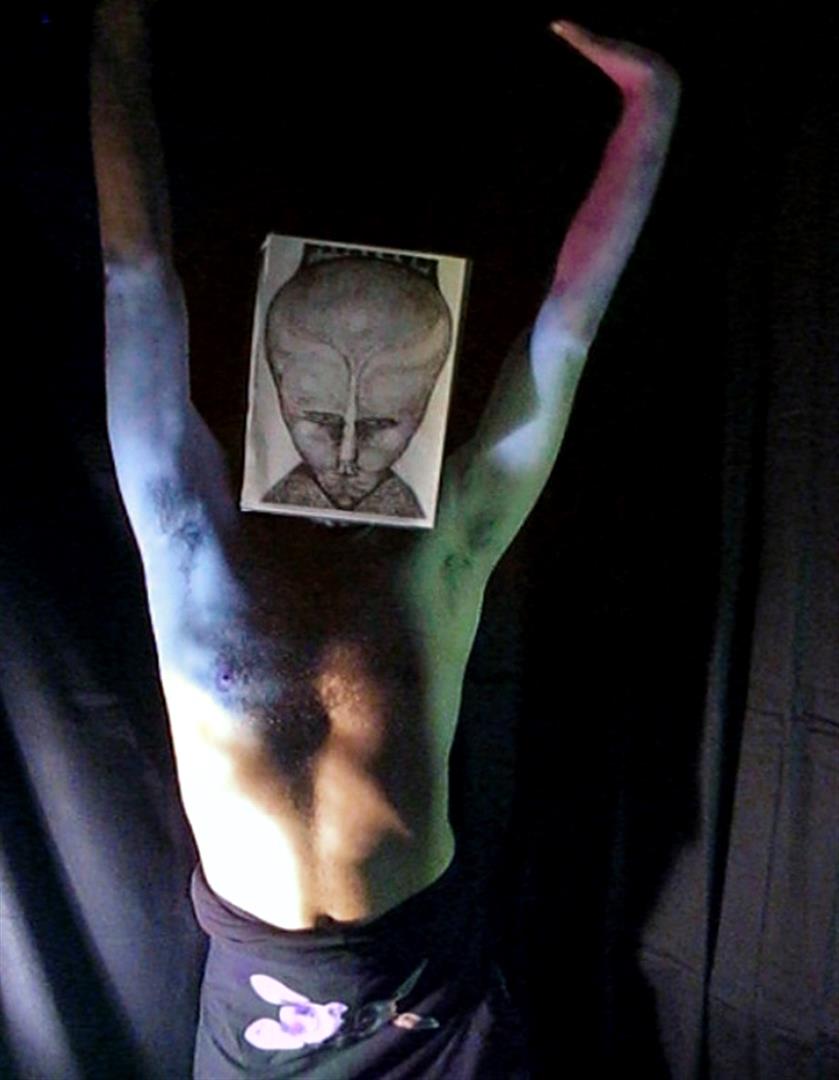
Material on and from the Typhonian O.T.O. — Keywords: Kenneth Grant, Shaitan–Aiwass, New Isis Lodge, Michael Staley, Starfire, LAM, Maat and the New Aeon, Maggie Ingalls, Nema, Linda Falorio. Kenneth Grant, who was Crowley's secretary, has rejected the Masonic structure of the Crowley–O.T.O. Crowley spoke highly of Grant, stating in his diary in March 1946 that "there must be a trained man to take care of the English O.T.O." in case he were to die or go to the United States. Unlike other versions of the O.T.O., the Typhonian Order does not have group rituals or ceremonies of initiation at any stage of the degree structure. Instead, initiation is based on the individual's direct magical and mystical workings. As a result, all initiations are effectively self–initiations. Documents: Karl Germer to Kenneth Grant. Eugen Grosches Eindeutschung von Kenneth Grants O.T.O.–Manifest von 1955. Kenneth Grant and the Plan 93 From Outer Space. Grant's Typhonian Order expanded Crowleyan Thelema by integrating esotericism, Lovecraftian mythos, and an emphasis on contact with extra–dimensional beings like Lam. Lam, depicted as an egg–like figure, became central to meditative and magical practices, representing both an entity and a state of gnosis. Grant’s innovations included dream–control and sex–magic techniques, such as eroto–comatose lucidity, drawing from earlier occult traditions but sparking controversy for their rigorous and sometimes exclusionary application. His reimagining of the Holy Guardian Angel (HGA) as a bridge between terrestrial and transcendent realities exemplifies his effort to merge esoteric, psychological, and metaphysical models. Grant’s eclectic approach incorporated influences like Advaita philosophy, the Aeon of Ma'at, and extraterrestrial gnosis, modernizing and globalizing occultism. Conflicts with the 'Caliphate' O.T.O. underscored factional tensions within Thelemic circles, where questions of legitimacy and authority often overshadowed spiritual practice. His work challenged traditional boundaries, positioning occultism as a multidimensional and experimental discipline. Ultimately, Grant’s contributions remain both innovative and divisive, raising critical questions about the rôle of personal interpretation in advancing esoteric traditions.
Behind the T.O.T.O. After being initiated by Crowley and later endorsed as a potential leader, he was expelled in 1955 by Germer, Crowley’s successor in the US. Despite this, Grant pursued his own interpretation of Thelema, establishing the New Isis Lodge in 1955. Grant maintained correspondence and relationships with several key figures in the occult community, including Hermann Metzger, Eugen Grosche and Gerald Gardner, though these were often contentious. His authority and leadership claims were supported by some, including John Symonds, and contested by others, such as Germer. History of a Hoax. Aleister Crowley appointing Kenneth Grant as his successor as Outer Head of the Order of the Templi Orientis in 1947? 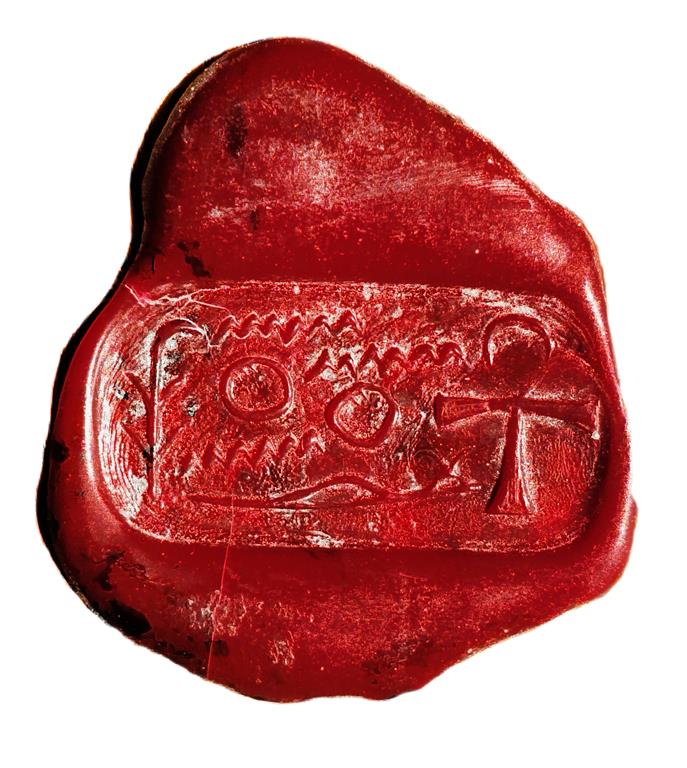
The Solar Lodge of the O.T.O., a controversial offshoot of Crowley's organization, operated in the 1960s with a peculiar mix of mysticism, communal living, and scandal. Led by Jean Brayton, it began as an attempt to revive O.T.O. practices but soon gained infamy through the 'Boy in the Box' scandal, where child abuse charges revealed authoritarian control and troubling moral lapses. Meanwhile, a potentially imagined connection to Charles Manson and tabloid sensationalism further tarnished its reputation, highlighting a zeitgeist steeped in countercultural experimentation gone awry. The Lodge's internal dysfunctions underscored the perils of unchecked charisma. Ironically, its notoriety catalyzed the emergence of the 'Caliphate' O.T.O., which distanced itself from Brayton's group while grappling with its own legitimacy as a successor.
Background of the Emergence of the New American O.T.O., the 'Caliphate'. The evolution of the American O.T.O. reflects a confluence of ideological, organizational, and personal influences, with various figures and movements contributing to its formation. The establishment of the 'Caliphate' underscores the factional nature of its development. External influences, such as the Swiss O.T.O. and the Solar Lodge, reflect the broader interplay of competing interpretations and authorities. Key individuals shaped this evolving landscape, from Reuss and Crowley to later figures such as Karl Germer, Phyllis Seckler, Grady Louis McMurtry, and William Breeze. Others, including Kenneth Grant, Marcelo Ramos Motta, and John Symonds, left their mark through their writings and rival claims. The rôle of European counterparts further illustrates the transnational and often contested nature of the O.T.O.’s historical development. Four letters from Gerald Yorke. Keywords: Charles S. Jones, Grady Louis McMurtry, H. Spencer Lewis, Heinrich Traenker, Hermann Joseph Metzger, Jerry Kaye, John Symonds, Karl Germer, Kenneth Anger, Kenneth Grant, Thoth Tarot Teck. About Jack Parsons in Nikolas and Zeena Schreck: Demons of the Flesh. Jack Parsons’ involvement with the O.T.O. Agape Lodge exemplifies the challenges inherent in left–hand path sex–magical groups, particularly regarding power struggles, interpersonal conflicts, and the tension between individual liberation and organizational hierarchy. Initially recognized by Crowley and other Lodge members as a promising successor, Parsons’ scientific acumen and deep commitment to Thelemic magic distinguished him, yet his independent streak clashed with the rigid structures of the O.T.O. His personal life, including his complex relationships with Wilfred Smith and his wife’s sister, intertwined with his magical pursuits, reflecting both his radical sexual philosophy and his vulnerability to exploitation. Crowley’s disapproval of the Lodge’s increasingly scandalous reputation, culminating in Parsons’ resignation and later return, underscores the broader issue of authority and legitimacy within esoteric orders. Ultimately, Parsons' devotion to Babalon led him beyond the confines of the O.T.O., embodying the trajectory of the left–hand path magician who, through personal transgression, emerges as a self–sovereign figure rather than a disciple. In 1946, Crowley referred to his student Grady McMurtry as 'Caliph' in a handful of letters sent from England to California. This designation, derived from the contemporary postal abbreviation for California ("Calif"), was not employed in any official O.T.O. context, nor does it appear in the writings of either Reuss or Crowley himself. More than two decades after Crowley’s death, McMurtry reinterpreted this title as conferring upon him the rôle of Outer Head of the Order (OHO) and Patriarch of Crowley’s ecclesiastical body. However, his resulting 'Caliphate' O.T.O. group did not inherit any legitimate ecclesiastical or organizational succession within the O.T.O. framework. In 1987, following McMurtry’s death, the group revised its constitution. Under the leadership of William Breeze, the 'Caliphate' has pursued institutionalization, securing legal recognition by registering and incorporating both the U.S. Grand Lodge and O.T.O. International as tax–exempt nonprofit religious entities in the United States. Several articles address the entity commonly referred to as the ‘Caliphate’, an organization established in 1977 that operates either as a formal institution or a private association, as well as its interpretation and implementation of the concept of “apostolic succession.” Although the ‘Caliphate’ has increasingly presented itself — particularly as it has expanded globally and secured certain legal victories — as the sole and authentic “O.T.O.”, this website consistently employs the term ‘Caliphate’ to underscore the complexity of its appropriation of the name O.T.O. William Breeze, McMurtry’s successor, quietly buried the original construct — the once–trumpeted ‘Caliphate’ — out of sight in the bureaucratic undergrowth of the organization’s bylaws, where it survives only as Section 3.10, “Removal of Acting O.H.O. or Caliph.” Consecration In Transit. How, why, and where was the 'Caliphate' Ecclesia Gnostica Catholica constructed — not inherited? In the backseat of a car, as William Heidrick described it: a pragmatic act performed en route to a notary. Not a rite of transmission, but a bureaucratic sleight of hand — sacral authority improvised to meet tax–exempt requirements. Grady McMurtry, facing collapse and solitude, later confessed to having activated the ‘Caliphate’ in “an afternoon of despair,” armed only with Crowley’s ambiguous paperwork. The article traces the key mechanisms by which legal recognition was secured — not through apostolic lineage, but via incorporation documents and strategic improvisation. A textbook case of how modern esotericism manufactures legitimacy through administrative ritual and retrospective meaning. 
[AI–generated image] The email exchange in 1996 between William Heidrick (Grand Treasurer General of the 'Caliphate' O.T.O.), Tyagi Nagasiva, and Peter-Robert Koenig, provides an in–depth discourse on the legitimacy of the 'Caliphate', the nature of its initiatory and ecclesiastical authority, and the claims of succession from Crowley. The discussion focuses on several key issues, including the withdrawal of the preview of initiation rites, the various iterations of the O.T.O. constitution, and the ecclesiastical legitimacy of the E.G.C. within the 'Caliphate' structure. Notably, Koenig challenges Heidrick’s assertions on the transmission of authority, particularly regarding McMurtry's rôle and the historical accuracy of the supposed Crowleyan lineage. The correspondence also delves into the controversial 'Caliphate letters', the nature of the title 'Caliph', and whether Crowley intended it as a legitimate succession mechanism or merely as a pun. Ultimately, the debate underscores the broader conflict between different O.T.O. factions, revealing the extent to which competing narratives of authority and legitimacy shape contemporary Thelemic organizations. 
[AI–generated image] In an email exchange in 1996, Peter-R. Koenig and David Scriven, U.S. Grand Master of the 'Caliphate', debate the legitimacy of McMurtry’s authority, with critics arguing his leadership was self–declared and inconsistent with earlier O.T.O. structures. Allegations of manipulation by figures like Seckler and Smith further complicate the validity of his succession. The rôle of IX° members in elections remains contentious, particularly as some who were barred from voting later helped elect Breeze. Broader questions about Crowley’s own succession cast doubt on all subsequent leadership claims, while McMurtry’s health and contradictory documents add further uncertainty. The controversy highlights the instability of O.T.O. leadership transitions, where personal alliances and shifting narratives often outweigh clear historical continuity. All we want is a 'Caliph': 'Minutes of the Special Ninth Degree 'Caliphate' Election' Held September 20/21, 1985. The 'Caliphate' era of the O.T.O. reveals a tangled web of bureaucratic ambition and occult pretensions, epitomized by Grady McMurtry's and William Breeze's commercialization of the Order. The 1985 election of Breeze as 'Caliph', held in a Holiday Inn conference room, marked the transformation of this O.T.O. into a corporate–style entity marketed to Thelemites, with contested degrees and legal maneuvering taking center stage. The "provisional IX°s", ostensibly a stabilizing measure, were elevated upon McMurtry's death, exposing the political opportunism beneath the Order's spiritual façade. Breeze’s reforms, from ritual innovations to ceremonial franchising, have been criticized for reducing Crowley’s vision to what can be called the McDonaldisation of Occulture. The fragmented legacy of rival factions, disputed authority, and court battles underscores the dissonance between this O.T.O.'s claims of sacred continuity and its mundane operations. 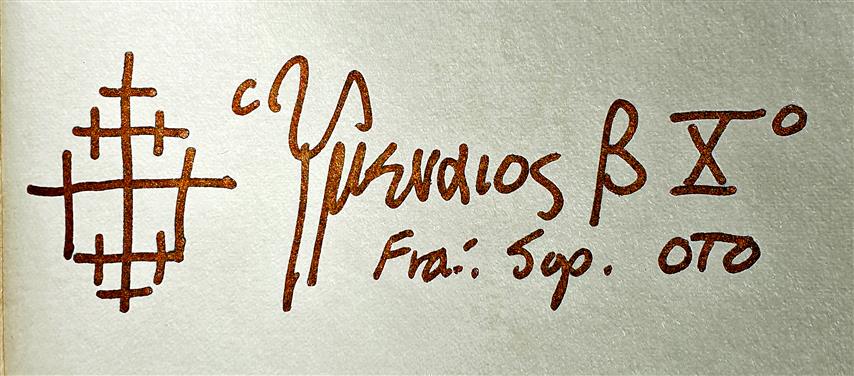
Some Spicy Smacks in Russia. The post–Soviet sociopolitical landscape — marked by spiritual disorientation and exploitation by new religious movements — provided fertile ground for groups like the O.T.O. to emerge. However, the O.T.O.’s impact remained minimal compared to larger spiritual phenomena and charismatic movements in Russia during the 1990s. The contemporary political environment under Putin further limits transparency and necessitates protecting members’ identities, obstructing deeper exploration of this topic. Christian Bouchet, a controversial figure whose political entanglements blurred lines between occultism and far–right nationalism, indirectly contributed to the O.T.O.’s local emergence in Russia. His initiatives, however, alienated him from various factions, including the 'Caliphate' O.T.O. The Russian O.T.O. was plagued by fragmentation and leadership disputes, which deepened skepticism about its authenticity. "Ljuben je zakon" or "ljubav pod voljom"? — The O.T.O. in ex–'Yugoslavia'. An example of member activities. The Ordo Templi Orientis in the former Yugoslavia illustrates the complex interplay between esoteric traditions and regional socio–political dynamics. Initially introduced by figures like Zivorad Mihajlovic–Slavinski, who explored Thelemic ideas as early as the 1970s, and later through the 'Caliphate' faction in 1982, the movement experienced a period of significant activity. Groups like the Abrahadabra Camp and later the Abrahadabra Lodge engaged in ritual practices, including the Gnostic Mass and initiations, and contributed to the translation and dissemination of Crowley’s works. However, internal disputes over leadership, financial misconduct, and allegations of abuse created fractures within these groups. The Balkan conflicts of the 1990s further disrupted their activities, forcing members into exile or limiting their operations. Despite these challenges, individuals like Mihajlovic–Slavinski continued to innovate, blending Thelemic principles with broader esoteric traditions. Today, the O.T.O.'s presence in the region remains fragmented but has left a lasting imprint on local esoteric culture. This history highlights both the potential for spiritual exploration and the practical difficulties of sustaining such movements in unstable environments. Moosebump. The Canadian 'Caliphate' O.T.O. began with promise but quickly descended into chaos, embodying the pitfalls of esoteric collectivism. From a 1973 bookstore–turned–teahouse in Montréal to the rise of the Phoenix Lodge in the 1980s, its history is marked by fleeting successes and mounting disarray. Leadership under William Breeze initially signaled hope but soon faltered amid expulsions, scandals, and logistical instability. Physical spaces like the Café Thélème became temporary sanctuaries, but their transience mirrored the group’s lack of cohesion. Public controversies eroded the 'Caliphate’s reputation and footing in Canada. Internal power struggles, particularly involving figures like Robert Deumié and Alan Stewart, alienated members and fractured the organization. By the 1990s, the once–promising movement had devolved into a scattered network of disillusioned practitioners and inactive groups. Ultimately, the Canadian 'Caliphate' stands as a cautionary tale of ambition undermined by ego, infighting, and the inability to sustain its lofty Thelemic ideals. 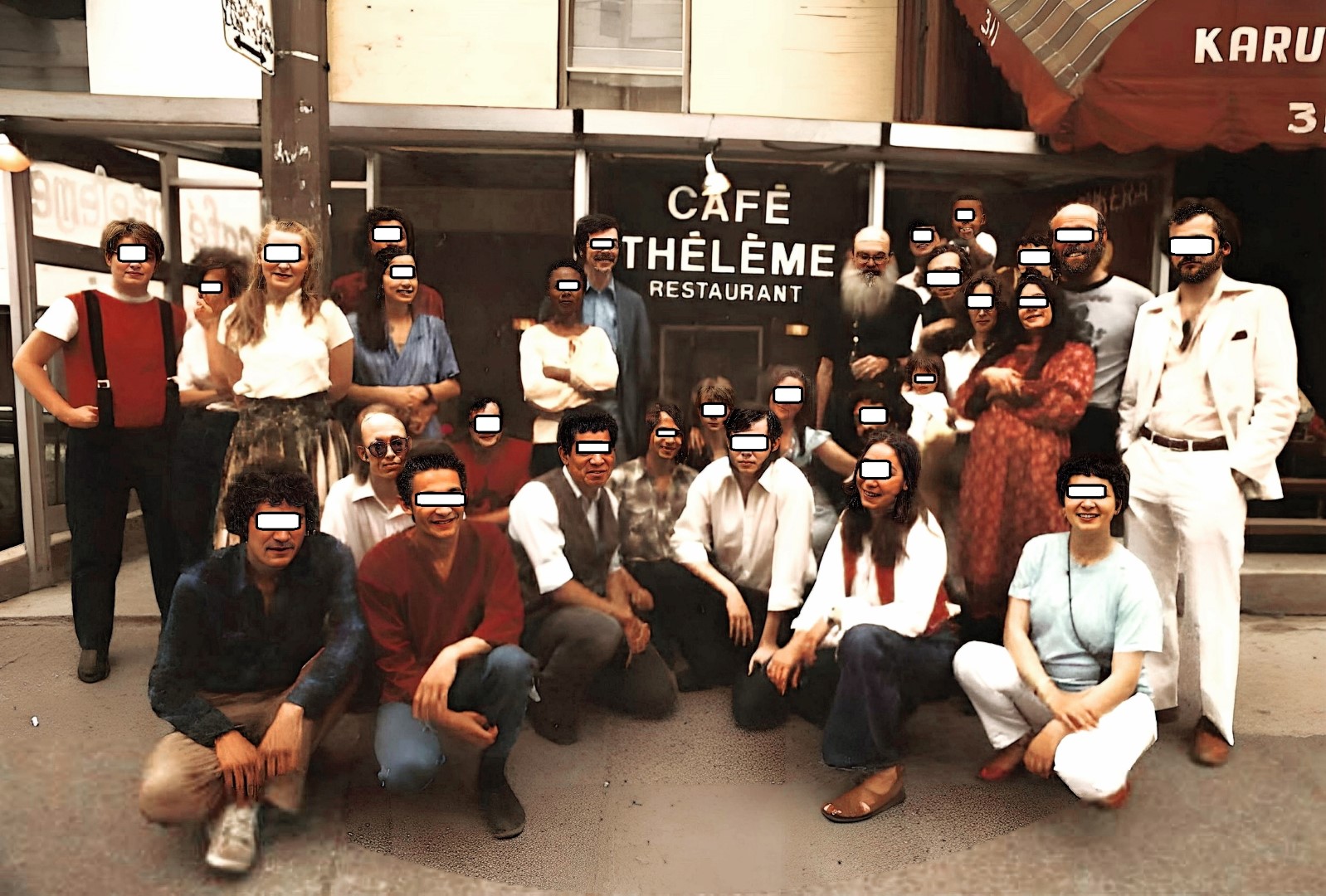
In Canada: With face uncovered: William Breeze, Grady Louis McMurtry The O.T.O.–Foundation: Censorship and Inquisition in England. The 'Caliphate' O.T.O. (COTO) "Inquisition" of 1996 was a farcical spectacle of bureaucratic zealotry, with anonymous accusations, no due process, and a hapless "Grand Inquisitor General". David and Irene Fraenkl–Rietti skillfully outmaneuvered the process, turning their expulsion into a strategic victory by founding the Ordo Templi Orientis Foundation (OTOF). The proceedings were less justice and more medieval witch–hunt, riddled with hearsay and personal vendettas. The Riettis emerged as Machiavellian tacticians, exploiting COTO’s dysfunction to enhance their influence and legitimacy in the occult community. 
Oscar Schlag’s multifaceted career bridged psychoanalysis, parapsychology, and esotericism, blending scientific inquiry with mysticism. Trained under graphologist Max Pulver and psychoanalyst Oskar Pfister, he interacted with figures like Carl Gustav Jung and Albert Schrenck–Notzing, gaining notoriety for his paranormal experiments, though their scientific validity remains debated. Fleeing Nazi Germany, Schlag dramatically renounced his German citizenship. A critic of formalized occult groups like the O.T.O., Schlag avoided allegiance while engaging with figures such as Karl Germer, Jane Wolfe, Phyllis Seckler, Marcelo Ramos Motta and Hermann Joseph Metzger, Friedrich Lekve, Friedrich Mellinger, Eugen Grosche, Heinrich Birven, Eduard Munninger ... You name them — he knew them personally. His Hermetische Gesellschaft embodied his vision of independent spiritual inquiry but faced criticism for its exclusivity. Schlag’s extensive esoteric library and contributions to graphology, including exposing the Golden Dawn’s foundational forgeries, highlight his intellectual rigor. Despite his scholarly achievements, Schlag’s life was marked by controversy, distrust, and conflicting narratives from contemporaries, reflecting his enigmatic and polarizing legacy in the realms of psychology and the occult. Oscar R. Schlag: self–styled last grey eminence. 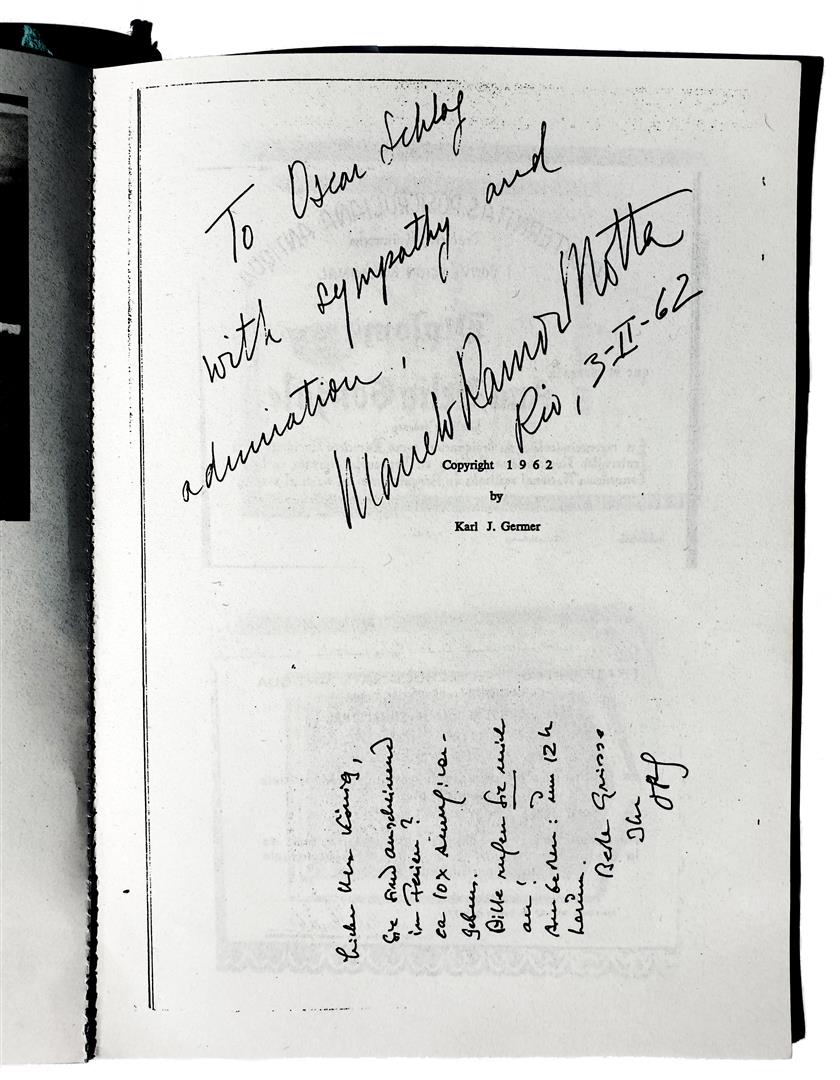
Dedication from Marcelo Ramos Motta to Oscar Schlag. + Schlag's short letter to P.R. Koenig. [From: 'Ein Leben Für Die Rose'] 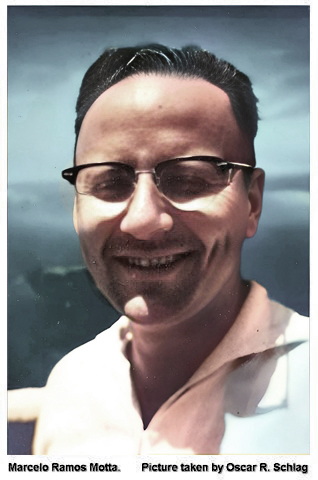
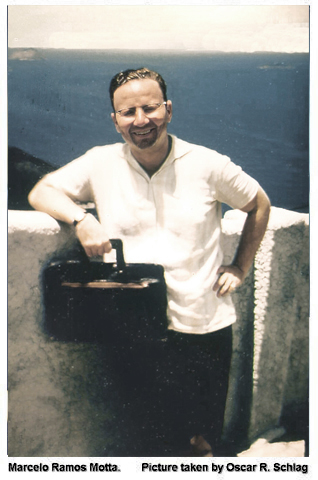
After Karl Germer passed away in 1962, a number of individuals sought to assume sole leadership of Germer's Crowley–O.T.O. According to Germer's will, the ultimate decision rested with his widow and Friedrich Mellinger. Sascha Germer initially favored Brazilian Marcelo Ramos Motta (1931–1987) of the F.R.A., but eventually determined that Swiss national H.J. Metzger had been her husband's preferred candidate. Subsequently, the competing claims of Grady Louis McMurty and Motta for leadership of the O.T.O. were resolved through legal proceedings. H.J. Metzger's existence was not mentioned at all by all parties in court. On the one hand, it was a discussion in America; on the other hand, everyone was aware that Metzger was the only valid candidate for leadership of the O.T.O. So why complicate things? Uma O.T.O. no Brasil. Motta played a crucial rôle in shaping Thelemic groups in Brazil, navigating a complex landscape of esoteric orders, legal battles, and factional disputes. His involvement with the O.T.O., the A∴A∴, and various other organizations led to numerous schisms, some fueled by personal and ideological conflicts. Motta's early association with the F.R.A. influenced his later establishment of the Sociedade Novo Aeon and other Thelemic groups, particularly in response to the military dictatorship in Brazil. Motta’s disputes with figures such as Euclydes Lacerda de Almeida and Kenneth Grant underscore the instability of O.T.O. leadership claims and the divergent ideological interpretations of Thelema. The legal conflicts with Grady Louis McMurtry over succession within the O.T.O. ultimately led to Motta’s estrangement from the dominant American O.T.O. lineage. His death in 1987 triggered further disputes over his estate and legacy, with figures like Claudia Canuto de Menezes, William Robert Barden, and Daniel Ben Stone engaging in bitter conflicts. Allegations of grave desecration and financial improprieties further complicated the posthumous struggle for control over Motta's intellectual and organizational heritage. Former associates such as David L. Bersson and Ray Eales continued Thelemic activities, though often distancing themselves from official O.T.O. claims. Meanwhile, Lacerda formally renounced all O.T.O. affiliations in 1996, emphasizing the fractious and evolving nature of Thelemic organizations. The sheer volume of documents produced by figures involved in these disputes underscores the complexity and contentiousness of Thelemic history in Brazil. Euclydes Lacerda de Almeida — Marcelo Ramos Motta — Kenneth Grant: Documentos 1966–1997. Euclydes Lacerda de Almeida: Marcelo Ramos Motta — Um Enigma. Motta was a pivotal figure in the introduction of Thelema to Brazil, serving as a member of the A∴A∴ and attempting to establish the O.T.O. in the country. Despite his dedication to Thelemic teachings, his later years were marked by increasing personal and organizational conflicts. Motta's decision to centralize all leadership rôles within the A∴A∴ caused tension and alienation among students, leading to schisms and a decline in his influence. His transformation into an authoritarian and irascible leader alienated disciples, attracting followers with fanatic tendencies rather than genuine initiates. Speculations about his erratic behavior include psychological struggles or a premature undertaking of the "Oath of the Abyss", which demands immense spiritual maturity. While his efforts expanded Thelemic teachings, his controversies left a complex legacy, with factions continuing to debate his impact on Thelema in Brazil. Ultimately, Motta remains a controversial figure, both revered for his dedication and criticized for his later actions. Euclydes Lacerda de Almeida: Emails to P.R. Koenig. Almeida's emails chronicle his affiliations with various factions, including his discipleship under Motta, his interactions with Grant, and his eventual disillusionment with the multiple claimants to O.T.O. authority. He critiques the 'Caliphate' and expresses frustration over the commercialization and bureaucratization of Thelema, which he views as a departure from its initiatory purpose. Over time, he grows increasingly skeptical of all O.T.O. branches, perceiving them as driven by power struggles rather than spiritual integrity. His later letters suggest a complete break with the O.T.O., as he declares himself independent and dismisses the legitimacy of any existing leadership. Ultimately, his writings reflect a broader concern that Thelema’s ideals have been diluted by institutionalized authority and internal rivalries. Marcelo A.C. Santos: A Verdadeira História do "Califado" no Brasil. Santos' article presents a critical account of the 'Caliphate' O.T.O. in Brazil, exposing internal conflicts, historical manipulations, and power struggles. The text argues that the organization's leadership prioritized personal ambition over the pursuit of Thelemic principles, leading to factionalism and betrayals. The author traces his involvement from initial curiosity to eventual disillusionment, revealing discrepancies between the 'Caliphate’s' professed legitimacy and its actual practices. The narrative highlights the rôle of figures like Euclydes Lacerda de Almeida, whose authority was initially recognized but later dismissed when he distanced himself from the 'Caliphate'. Internal disputes, such as those involving Carlos Raposo and Marisol Seabra, illustrate the cycle of ambition and treachery that undermined the organization's cohesion. The text underscores how secrecy, deception, and a lack of substantive teachings led to widespread dissatisfaction among members. Santos ultimately portrays the Brazilian 'Caliphate' as a vehicle for personal aggrandizement rather than an authentic spiritual order. His departure, prompted by ideological and ethical disillusionment, reflects broader concerns about the organization's legitimacy. The work concludes that the 'Caliphate' operates more as a hierarchical power structure than as a true Thelemic fraternity, reinforcing the notion that its leadership is driven by vanity and control rather than genuine esoteric pursuit.
Marcelo Ramos Motta: Ritual de Iniciação do Grau I O.T.O. Marcelo R. Motta: Carta A Um Maçon. Bibliographic Note and Addendum to "Letter to a Brazilian Mason by Marcelo Ramos Motta". Marcelo Ramos Motta to Karl Germer, July 2, 1954. Marcelo Ramos Motta about Paulo Coelho and others. Marcelo Ramos Motta: The Development of a Secret Society in America in the Years 1957–2000. Claudia Canuto de Menezes: Conheci Marcelo Ramos Motta nos idos anos 70. Background information by one Goat of Mendes and others. This correspondence documents, with remarkable depth and complexity, the fragmented landscape of Thelemic succession claims in the 1990s — particularly within the orbit of Marcelo Ramos Motta, his circle of disciples, and the competing O.T.O. structures (most notably the 'Caliphate,' HOOR, SOTO, and TOTO). The exchange repeatedly reflects upon itself, oscillating between high-stakes institutional politics and a grotesque sense of theatricality. What is at stake is not merely organizational structure, but personal vanity, prophetic ambition, escalation, and irony. The correspondence repeatedly turns back upon itself, offering a reflexive commentary on its own absurdities. Among its recurring themes are structural fragmentation and personal feuds, shifting terminologies and ideological skirmishes, as well as the ever-performative politics of symbols, membership, and exclusion. 
Palace of Secretes — Anal Intercourse and the O.T.O. — the XIth degree. The focus of this article is on the XI° of the O.T.O., which is also called the Palace of Secrets. The article offers a historical perspective on the XI°, tracing its origins and evolution over time. This historical account features Aleister Crowley, Victor B. Neuburg, William C. Conway, Roland Merritt Shreves, Cecil Frederic Russell (and his Choronzon Club, which remains active to this day), and Louis T. Culling. Additionally, William Wallace Webb, who cultivated his Ordo Argenteum and the QBL Alchemist Church, deserves mention. Michael Paul Bertiaux contributed an AIDS table in the context of the XI°. Notable names in the history of the XI° are also discussed, including Marc–Antoine Lullyanov, Llee Heflin (who contributed to the development of the current Crowley–Tarot–set), Patrick King (with his Rites of Shiraz and Mitylene), James Graeb, and William Breeze. Furthermore, the article mentions the evolving perspectives of the 'Caliphate' towards the XI° over time. Lastly, Marcelo Ramos Motta's and Hermann Joseph Metzger's distinctive viewpoints on these matters are also touched upon. Patrick King — Herald of the 'Caliph' and early XI° of the 'Caliphate'. King, born in 1955, was deeply involved in martial arts and occult studies from a young age, excelling in Kenpo Karate before immersing himself in Thelema and the O.T.O. His introduction to Grady McMurtry’s O.T.O. came through the Kaaba Clerk House in San Francisco, where he was quickly recognized for his scholarship and leadership, particularly in the Salt Lake City occult scene. He co–founded the "Church of the 4 Sided Triangle", a group that blended intellectual engagement with strategic legal maneuvering, before becoming a key figure in the American O.T.O., where his XI° status made him a controversial presence. King’s later years were marked by a falling out with the organization, leading to self–imposed exile in Prague, where he lived in poverty with his lover and magical partner, Laura Deerfield. His death in 1997, following a police beating, underscores the tragic trajectory of his life — one shaped by intellectual rigor, spiritual ambition, and eventual alienation from the order he had helped shape. Documents: William C. Conway: A con artist rumoured to be a XI°. Conway exemplifies the archetypal con artist who blurred the boundaries between fraud and mysticism, using grandiose titles and fictitious organizations to maintain his persona. His trajectory from early fraudulent ventures, such as the “Good Roads Commission” and the “Optimist Society”, to esoteric and religious enterprises suggests a calculated evolution in his schemes, adapting to new audiences and cultural trends. His alleged involvement with the XI° O.T.O. and his attempts to merge Mormon fundamentalism with occult traditions illustrate his penchant for constructing elaborate spiritual and mystical identities. The proliferation of his self–styled orders and lodges — ranging from the Restored Apostolic Catholic Church to the Ancient Order of Atlantean Adepts — underscores his method of legitimizing himself through sheer volume of invented affiliations. Ultimately, Conway’s legacy is one of elaborate deception, where the line between self–delusion and calculated manipulation remains provocatively unclear. The New Gnostics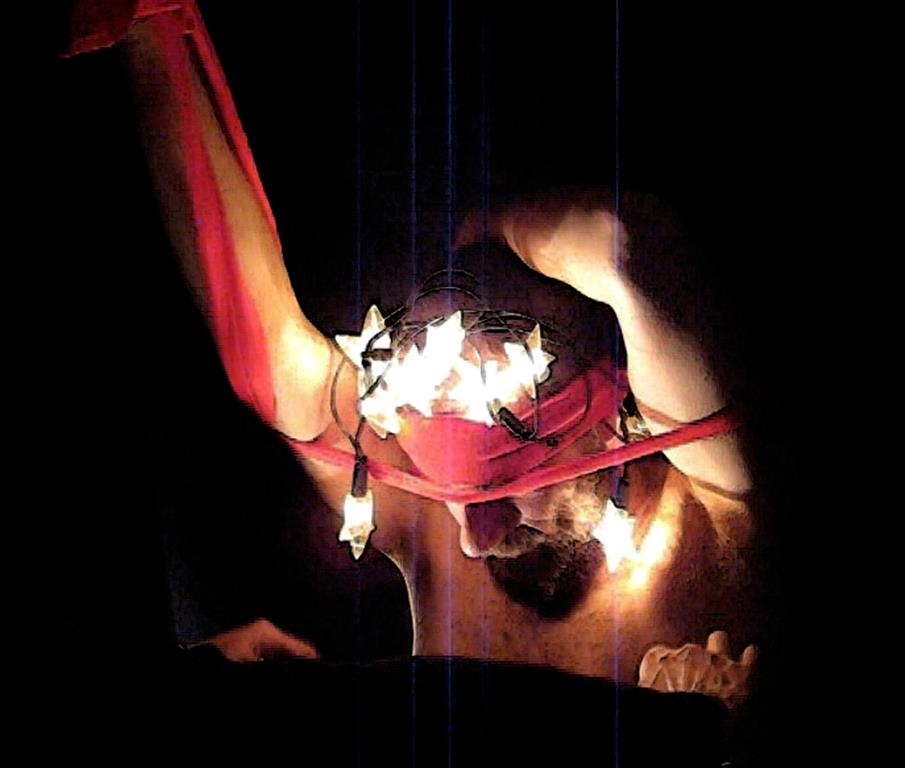

Lignée malabare: René Vilatte, Jules Doinel, Theodor Reuss, E.C.H. Peithmann, Arnoldo Krumm–Heller, Herbert Fritsche, Hermann Joseph Metzger. The French Gnostic Churches, established in 1890, have experienced numerous divisions over their history. Although they aimed to follow the traditional path of apostolic succession, figures like Theodor Reuss and Aleister Crowley were never properly consecrated within canonical frameworks. In 1920, Reuss and Jean Bricaud attempted to promote Crowley’s Gnostic Mass as the official religion for Freemasons, but this initiative was short–lived. Crowley’s claim to leadership of the O.T.O. was later used in 1944 to appoint William Bernard Crow, an English Theosophist, as head of Crowley’s Gnostic Church and Memphis–Misraim. However, the position of "Outer Head of the Order" (OHO), central to the O.T.O.’s constitution, remained separate from the leadership of any specific church. The history of the Wandering Bishops (Episcopi Vagantes) highlights their strategic fusion of mystical practices, legal maneuvers, and cultural adaptation to assert identity and institutional relevance. These bishops, lacking canonical legitimacy and traditional apostolic succession, exemplify the broader theological and organizational challenges faced by the Ecclesia Gnostica Catholica (EGC) and related movements. Their improvisational approach to spiritual lineage reflects the fluidity of authority within the O.T.O. and its affiliated entities. A key critique lies in the reinterpretation of apostolic succession after Vatican II, which reframed ecclesiastical legitimacy as a collective rather than individual authority. This shift undermines the claims of Gnostic bishops to traditional succession and exposes the O.T.O.'s reliance on apostolic lineage as a pragmatic strategy to assert authority and protect intellectual property, emphasizing institutional survival over purely spiritual motivations. Stranded Bishops — An exploration and historical account of Gnostic Churches and their Wandering Bishops. The text underscores the necessity of critically engaging with historical claims regarding the rôles of secret societies in religion, particularly in the context of Significant E.G.C. Sequences, the development of Creeds, and the contributions of figures such as E.C.H. Peithmann and Ernst Tristan Kurtzahn. It also examines the influence of Herbert Fritsche and H.J. Metzger's Ordo Templi Orientis and delves into the activities of the Jean–Maines and Michael Paul Bertiaux. The discussion highlights the contested narratives surrounding Stranded O.T.O. Bishops and modern Gnostics in both domestic and ritual settings. Furthermore, it critically evaluates the Great Gnostic Catholic Church Scandal within the 'Caliphate' and the ecclesiastical legacy of William Bernard Crow, considering the biases and agendas inherent in documenting these complex intersections of esoteric traditions and religious institutions.
Some documents are available (you can also follow this link). Siehe auch die deutsche Seite Ecclesia Gnostica Catholica, die auf das gleichnamige Buch verweist. Dieses rekonstruiert durch Faksimiles und historische Dokumente die Entwicklung gnostischer Strömungen innerhalb des O.T.O.–Phänomens. Neben der Analyse der gnostischen Messe und des Einflusses französischer gnostischer Kirchen auf Reuss und Crowley wird die institutionelle Transformation des O.T.O., insbesondere unter McMurtry, kritisch beleuchtet, wobei eine zunehmende Kommerzialisierung und Abkehr von Crowleys ursprünglichem Konzept festgestellt wird. Die Legitimität apostolischer Sukzessionen innerhalb des 'caliphatischen' O.T.O. wird ebenso hinterfragt wie die Fragmentierung des O.T.O.–Phänomens und die Rolle konkurrierender gnostischer und esoterischer Gruppen. Das Buch dient dabei nicht nur der historischen Einordnung, sondern auch der kritischen Reflexion über moderne Adaptionen und Umdeutungen dieser Traditionen. Ernst Tristan Kurtzahn, Mitglied von Reuss' O.T.O.: Die Gnostiker und die Unsichtbare Kirche [1925].
Aleister Crowley appointing W.B. Crow Patriarch of the thelemic Gnostic Catholic Church. William Bernard Crow: OHO of the O.T.O., Grand Administrator General of Memphis and Mizraim and Patriarch of the Gnostic Catholic Church: The Ancient and Universal Rite of Cosmic Architecture. In 1944, Crowley corresponded with independent Catholic bishops, including Hugh George de Willmott Newman, who suggested granting William Bernard Crow documentary authority to link the Gnostic Catholic Mass with the Memphis–Misraim Rite, thereby attracting financial supporters unsuitable for the O.T.O. Crowley found Crow charming and intelligent, appointing him "Sovereign Patriarch of the Gnostic Catholic Church and Vicar of Salomon" in August 1944, but later dismissed his grandiose claims, including the establishment of multiple universities, as delusional. After August 1944, Crow consecrated only twice: on September 3, 1944, he consecrated Henry George Brook, who later exchanged consecrations with several other bishops in May 1945. On August 16, 1948, Crow had himself declared Grand Hierophant of the Memphis–Misraim Rite, expanding his Ancient and Universal Rite of Cosmic Architecture to include the 33°, 90°, 97°, and XII° O.T.O., aligning with Crowley’s proposed 12–degree O.T.O. system, which William Breeze later incorporated into his 'Caliphate'. On April 11, 1972, Crow consecrated Kermit William Poling, Patriarch of the Orthodox Catholic Church of America. He passed away on June 28, 1976, and soon after, his esoteric legacy was taken up in Australia by Gregory Tillett, who became Deputy Grand Master of the Order of the Holy Wisdom in 1979. Stephan A. Hoeller: "Position Paper Concerning the Thelemite or Crowleyan Gnostic Churches". Hoeller’s essay examines the distinctions between classical Gnosticism, represented by the Ecclesia Gnostica, and modern revivalist movements associated with Crowley and the O.T.O. He contextualizes the Gnostic revival of the 1960s and 1970s, noting confusion caused by groups adopting the term “Gnostic” while lacking connections to classical scripture and sacraments. Hoeller critiques the O.T.O.’s claims of apostolic succession as invalid, arguing they fail to meet ecclesiastical standards of continuity and intent. Crowley’s "Gnostic Catholic Mass" (Liber XV) is dismissed as a magical ritual disconnected from both classical Gnostic and Catholic traditions, with Hoeller clarifying that one Mass no Church doth make. While acknowledging Gnosticism’s pluralism, he argues that indiscriminate use of the term risks diluting its coherence and misleading the public. Hoeller critiques the Thelemic movement’s rejection of the Christian mythos central to Gnosticism, emphasizing the incompatibility of Thelemic and Gnostic traditions. Ultimately, he advocates for clarity and discernment to preserve Gnostic integrity and urges the Ecclesia Gnostica to uphold its classical traditions amidst modern esoteric trends. William Wallace Webb. Frater Damon. Born on May 11, 1919, in Seattle, Washington, Webb joined the Navy in 1941, serving as a forward observer during World War II. After leaving the Navy in 1945, he began a mystical life in 1950, becoming an astrologer and painter. In 1963, he co–founded the Philosophic Gnostic Hermetic Society (PHGS) in Joshua Tree, later establishing the QBL Alchemist Church, which drew on Masonic and Rosicrucian traditions. Webb engaged with figures like Meade Layne to explore esoteric codes and teachings and maintained leadership rôles in the Qabalistic Alchemist Church and the Ordo Argenteum Astrum. Despite hosting many Thelemites, he criticized Helen Parsons–Smith and was honored by Kenneth Grant as an Honorary VII° in 1973. Webb continued his spiritual and esoteric activities until his death on October 15, 1997. 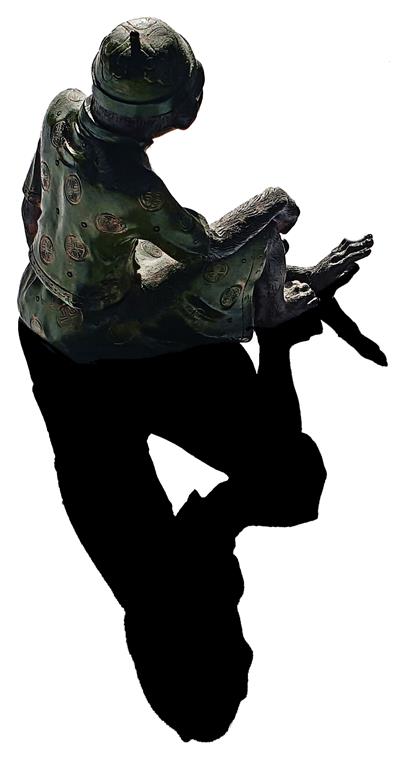

The Ordo Templi Orientis Antiqua (O.T.O.A.) is a syncretic esoteric order blending Gnosticism, Voodoo, and sexual magic, claiming origins in Haiti through Lucien–François Jean–Maine. Although Jean–Maine is said to have been consecrated as a Gnostic bishop and associated with figures such as Papus, no historical records support these assertions, and his rôle within Western esoteric traditions remains disputed. Purportedly founded in 1921, the O.T.O.A. diverged from Crowley’s and Reuss‘ O.T.O. variations by developing a system of 16 grades that integrated Voodoo practices, Afro–Caribbean spiritual elements, and later absorbed multiple Gnostic successions, a Memphis–Misraim lineage, episcopal consecrations, and an Eleventh Degree. In the mid–20th century, Michael Paul Bertiaux emerged as the order’s ideological and spiritual successor. A former Theosophist associated with Henry Smith’s spiritualist movement, Bertiaux was trained in both Voodoo and Western occultism and established the Monastery of the Seven Rays, which expanded the O.T.O.A. into a transnational network. Under his influence, the order fused Afro–Caribbean magical traditions with Gnostic Christianity and Enochian magic while affiliating with groups such as the Fraternitas Lucis Hermetica and the Ecclesia Gnostica Spiritualis. During this period, the Haitian magical order La Couleuvre Noire became closely tied to the O.T.O.A., reinforcing its syncretic nature. Operating entirely on a magical level, the O.T.O.A. places a strong emphasis on magic, particularly sexual magic, which remains central to its practices. Its influence extended beyond its own circles, with Kenneth Grant drawing inspiration from Bertiaux's teachings. By the late 20th century, the O.T.O.A. had distanced itself from Thelema, embracing an increasingly Afro–Caribbean and Gnostic orientation while influencing esoteric movements in the United States and Europe. History of the O.T.O.A.: Inflation of Gnosis — Ordo Templi Orientis Antiqua, Michael Bertiaux, Manuel Lamparter, La Couleuvre Noire, Monastery of the Seven Rays, Choronzon Club. How William Breeze lost an Apostolic Succession. In 1989, the 'Caliphate' published its claim to apostolic succession. First, two competing genealogical lines were presented, both straining credulity with their reliance on unverified or outright fantastical consecrations. The first lineage, rooted in figures like Aleister Crowley and William Breeze, hinges on tenuous assertions, including a supposed postal consecration by Crowley (the so–called 'Caliphate' letters) — a claim refuted by Crowley’s own disdain for apostolic tradition. The second lineage is a web of obscure consecrations involving figures such as Michael Bertiaux and William Wallace Webb, whose legitimacy falters under scrutiny. Webb himself dismisses the claims of his own bishopric as legalistic formalities rather than genuine spiritual transmissions. Critical interventions in the 1990s led to a shift in the O.T.O.'s stance, effectively discarding apostolic succession as a meaningful tenet. This volte–face, prompted by the exposure of inconsistencies, underscores the organization’s pragmatic opportunism rather than spiritual integrity. Breeze’s defensive reaction — both dismissive and vitriolic — betrays the fragility of these claims. The ensuing intellectual gymnastics, such as equating leadership positions with ecclesiastical legitimacy, reveal a desperate attempt to salvage credibility. My Own O.T.O.A. Selling out O.T.O. groups in Italy. The text delves into the complex and fragmented landscape of esoteric and occult organizations in Italy, particularly those linked to the O.T.O. and its various splinter groups. It highlights the influence of figures such as Roberto Negrini and Nevio Viola, demonstrating how internal disputes, power struggles, and ideological divergences led to a proliferation of competing factions. The interactions between these groups involve elements of esotericism, legal conflicts, and, in some cases, political extremism, reflecting the volatile and often performative nature of such organizations. Furthermore, the involvement of figures like Paolo Fogagnolo, with his blend of esoteric and leftist revolutionary politics, adds another layer of ideological complexity to the milieu. Ultimately, the text underscores the unstable and fractious character of the Italian occult scene, where claims of legitimacy, authority, and succession are frequently contested. 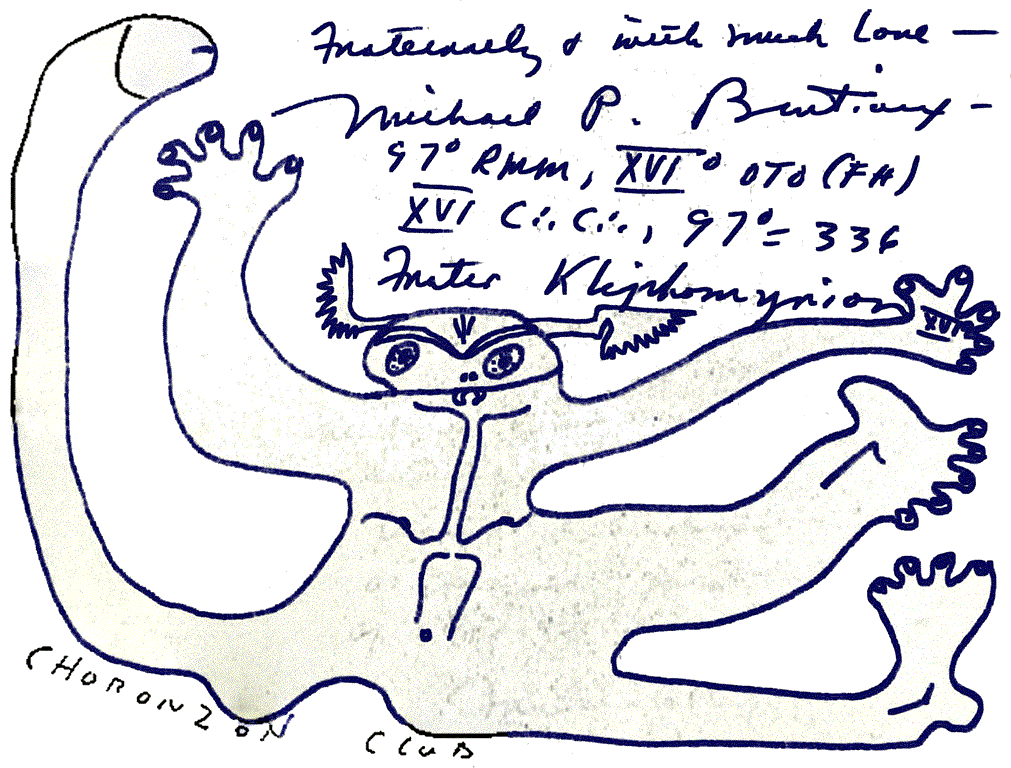
|

David Bowie and the Occult [Version 2024].
These articles delve into Bowie's spiritual inclinations and their profound influence on his music, performances, and lifestyle. His fascination with both Western and Eastern religious traditions, alongside his engagement with occult practices, shaped his ever–evolving artistic expression. Through masks, transformations, and symbolic gestures, he wove these esoteric themes into his work, crafting lyrics and a public persona that serve as a case study in the shifting dynamics of contemporary belief systems. Bowie’s work unfolds as a labyrinth of cultural references woven together like an exquisite corpse, where meaning remains fluid, shifting, and often elusive. In this sea of intertextuality, words dissolve into flickering islands of in/significance, and creativity itself oscillates between revelation and an unsettling void. Keywords: Golden Dawn, science fiction, Friedrich Nietzsche’s Übermensch, homo superior, flirtation with Nazism, Aleister Crowley, from Kether to Malkuth, Arthur E. Waite, Dion Fortune, Andy Warhol, William S. Burroughs, art brut, the first human who sold his persona to the stock market, Angie Bowie. Steele Savage: David Bowie — Outside, Aleister Crowley, And the Holy Grail.
Bowie's 1995 concept album '1. Outside' reinterprets the Hermetic Grail Quest, drawing connections to his earlier work. The investigation into the murder of Baby Grace Blue alludes to the death of Love in occult philosophy, while the Philosopher's Stone symbolizes divine grace and the Holy Guardian Angel. Bowie deliberately links the murder to the archetype of the Dying God–Man and associates the suspects with contemporary societal malaise. Baby Grace’s mother is connected to mirrors and nature, while the diamond–encrusted umbilical cord represents the regenerated self. The album functions as a form of art therapy, confronting the darkest elements of the unconscious and underscoring the necessity of facing them in the quest for the Grail. Bowie's song "I Can't Give Everything Away" suggests that the doctrine of crossing the Abyss is accessible only to those who have already reached a higher state of being, while the Blackstar symbolizes his realization of karma. |
Encores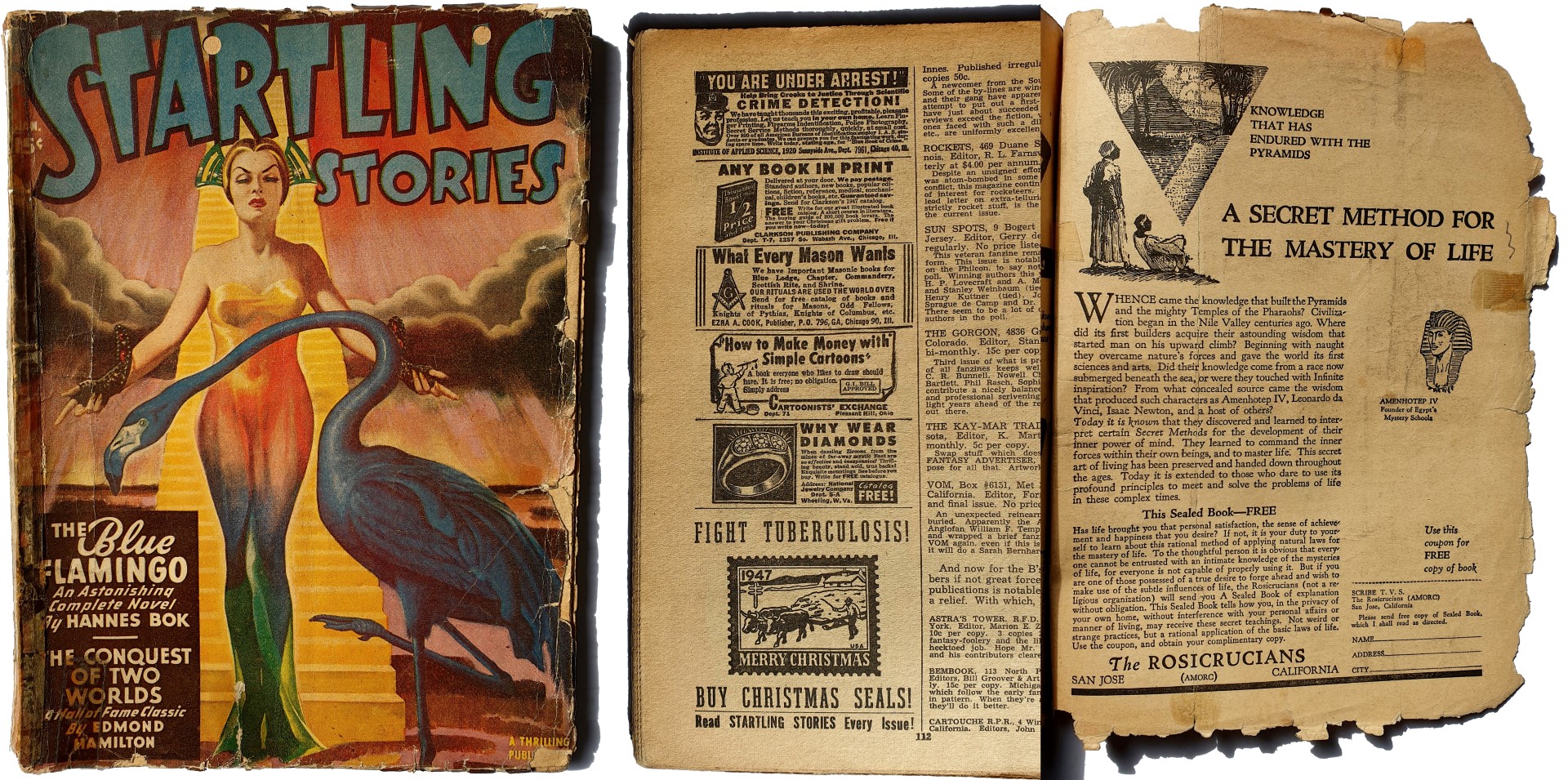
"What Every Mason Wants" 'Startling Stories", January 1948. |
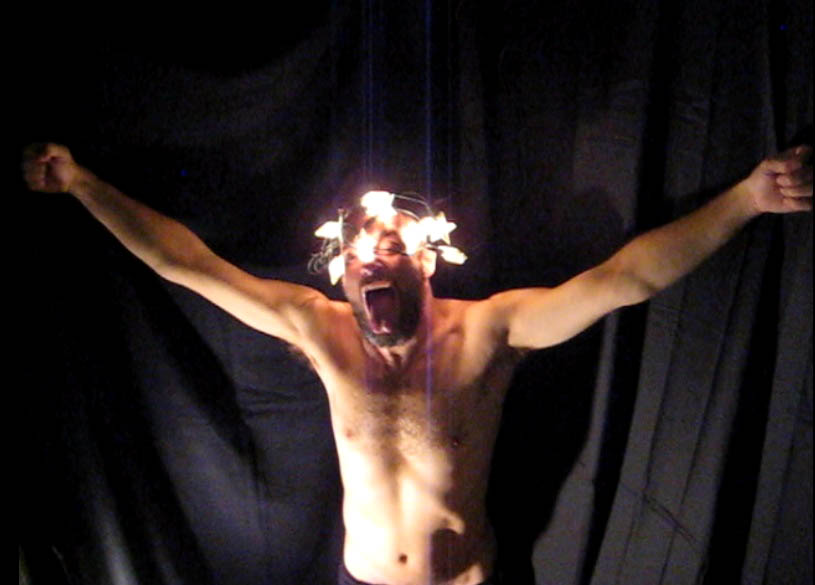
|
Books OnlineDer Kleine Theodor Reuss Reader (featuring statutes, the 'Oriflamme', rituals, and writings on sex magic) — presented in the original German version. 1993. Das O.T.O.–Phänomen (a comprehensive history of the O.T.O. groups). 1994.
Ein Leben für die Rose (This text provides a biography of Arnoldo Krumm–Heller, an examination of the sex magic practices of Reuss, Crowley, and Krumm–Heller, and an analysis of the belief system of the Fraternitas Saturni). 1995. 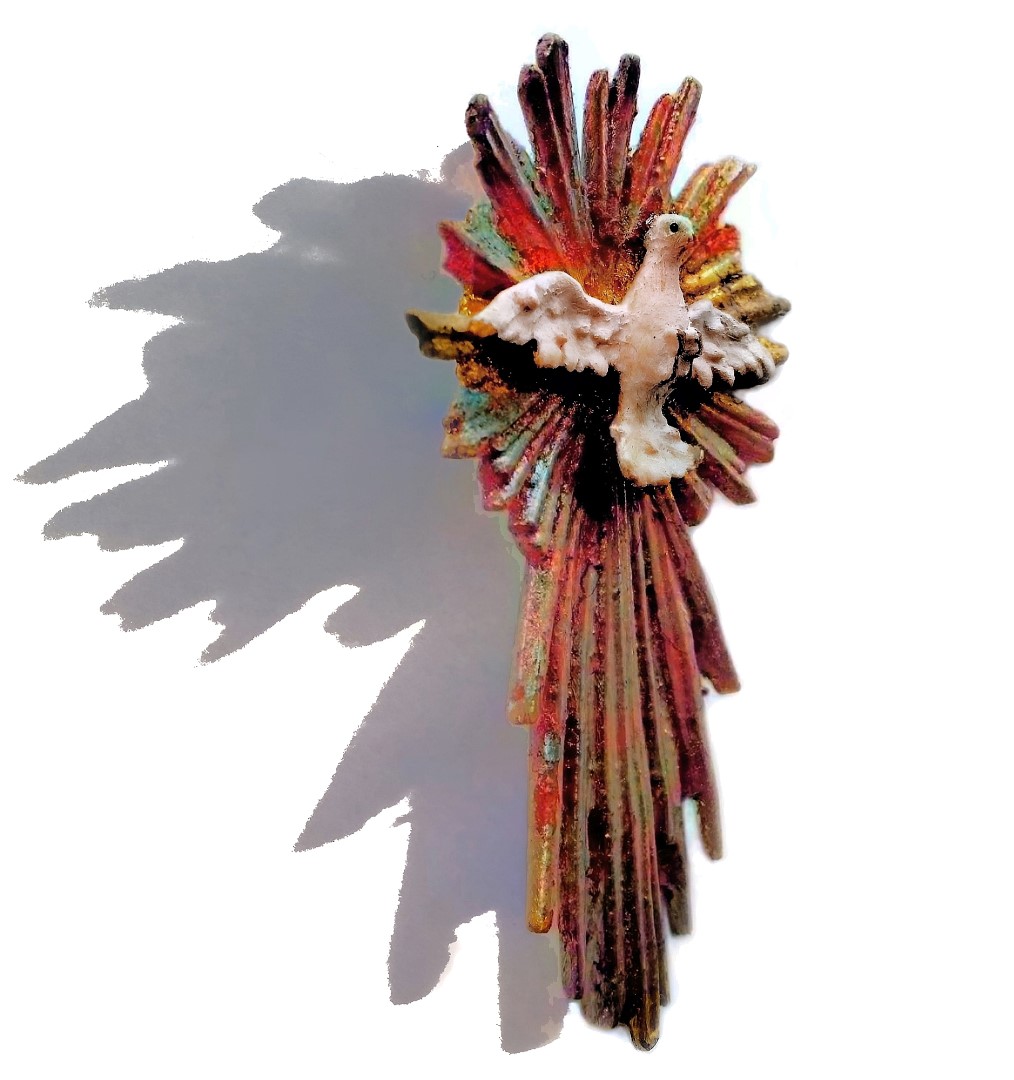
ABRAMELIN & Co. 1995. (This work investigates the concept of Holy Guardian Angels, other UFO phenomena, and their connections to Thelema and the Argenteum Astrum (Silver Star), as embodied by Aleister Crowley. The text also explores Crowley's practices related to sex magic, including coprophagy and algolagnia). Selected sections of this book have been translated into English: Part One of Smoke Gets In Your Aiwass. Angels, as divine messengers, predate Christianity and can be traced back to ancient Ugaritic, Assyro–Babylonian, and Old Testament traditions, where they functioned within a celestial hierarchy. The Abramelin text, a 14th–century mystical work, details an esoteric system of invoking a Holy Guardian Angel (HGA) to achieve divine communion and mastery over demons, a concept later integrated into Aleister Crowley’s Thelemic system, particularly in the O.T.O. and A∴A∴. The text’s ambiguous nature places it within both Roman Catholic and Jewish mystical traditions, though Catholic dogma typically rejects non–Christocentric angelic interactions as demonic. The comparison of angelic and demonic encounters with modern UFO experiences suggests a broader framework of altered consciousness phenomena, though the study refrains from equating these outright, instead highlighting shared thematic elements. Part Two: More on The chajoth, the ‘living creations’ or ‘flying things’. Ezekiel’s visions of angelic beings, including the chajoth and Archons, illustrate an early hierarchical conception of celestial courts, where magical seals grant access while warding off malevolent forces. Jewish mysticism, particularly the Qabalah, conceptualizes the Holy Guardian Angel as an astral counterpart, whose conjuration entails both enlightenment and peril. Crowley’s adaptation of the Abramelin text influenced his magical system, yet his failed operations at Boleskine highlight the dangers of uncontrolled esoteric practices. The Adonists, a sex–magical group briefly allied with the Fraternitas Saturni, represent another strand of occultism that, like Crowley’s Thelema, sought mystical transcendence through ritualized engagement with angelic and demonic forces. Die vollständige Version (mit einem dritten Teil), ist jedoch nur auf deutsch erhältlich: Abramelin & Co.: Karl Germers Erfahrungen mit seinem Heiligen Schutzengel (HGA) zeigen eine Verschmelzung von spiritueller Identität und okkulten Praktiken, die traditionelle Geschlechtszuschreibungen auflösen. Der HGA wird dabei nicht nur als göttlicher Vermittler, sondern auch als Projektionsfläche homoerotischer und geschlechtsübergreifender Rollen interpretiert. Crowley beschreibt diese Vereinigung als ekstatisch, jedoch unfruchtbar, und sieht im Ritual die Annahme einer weiblichen Rolle als Voraussetzung. Germers Haft in Nazi–Deutschland wird zur Initiation, in der er durch Meditation und Rekonstruktion heiliger Texte einen transzendenten Kontakt erfährt, der seine Identität transformiert. Marcelo Ramos Motta erweitert diese Konzepte und interpretiert den HGA als Verkörperung des Kundalini–Prinzips, dessen Aktivierung zum spirituellen Erwachen führt. Motta postuliert, dass die Verbindung mit dem HGA einen Prozess der Selbstvergöttlichung in Gang setzt, wobei spirituelle Hierarchien und magische Rituale als Vehikel dienen. Der Text verknüpft diese Ideen mit modernen Interpretationen, in denen der HGA als Schnittstelle zwischen irdischem Bewusstsein und kosmischer Intelligenz fungiert, was durch Science–Fiction–Metaphern und außerirdische Symbole gestützt wird. Kenneth Grants Weiterentwicklungen führen zu visionären Konzepten des Übermenschlichen, die Sexualmagie und außerzeitliche Realitäten kombinieren, während andere zeitgenössische Strömungen den HGA als Spiegel von DNA–Mutation und Bewusstseinserweiterung deuten. Schließlich reflektiert die Analyse, wie diese Vorstellungen die Grenzen zwischen psychologischem Archetyp und metaphysischer Realität verwischen und den HGA als zentrales Symbol der Selbsttranszendenz etablieren. 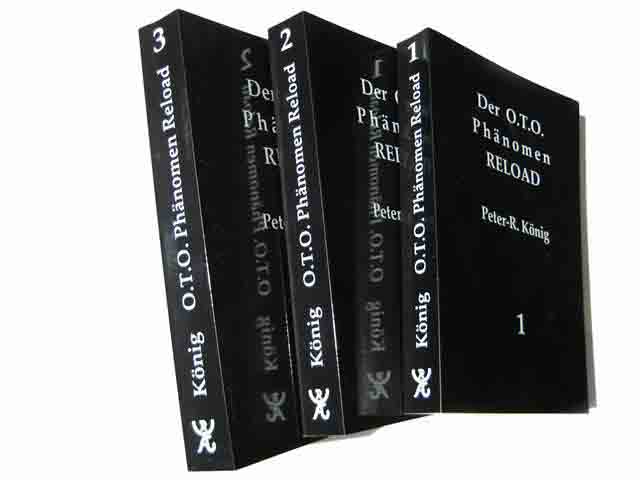
Print: Der O.T.O. Phänomen RELOAD. books about the O.T.O. Phenomenon: A.R.W. Manfred Ach Gunta–Stölzl–Str. 9 D – 80807 München Deutschland / Germany Online ordering via email The majority of these books are no longer available for purchase. 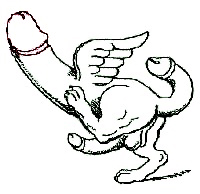
See them Scattered On The Floor while Browsing Through The Rituals |
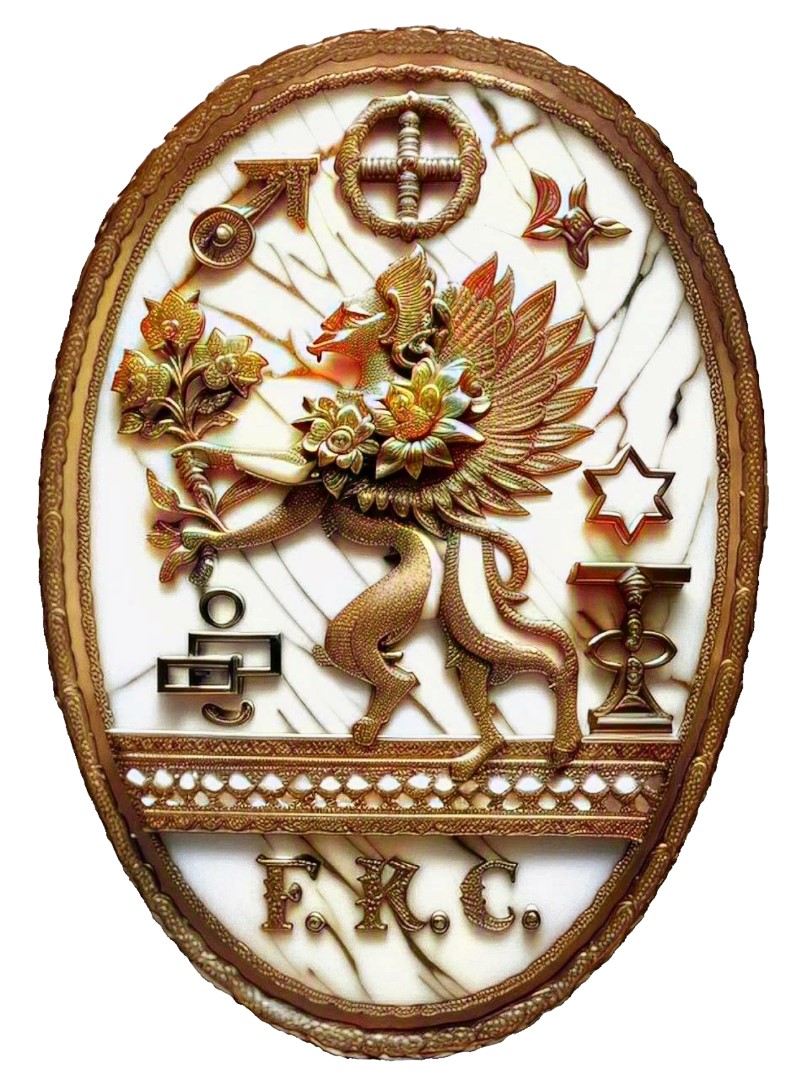
DataThis website houses approximately 900 webpages, incorporating articles, translations, comments, and diverse contributions, each containing numerous documents, photos, and similar visual enhancements. Some images are coloured or conjured up by AI — duly labeled. The current introductory page provides access to only a restricted subset of these resources. Therefore, it is advisable to follow the hypertext links within individual pages for more comprehensive exploration. This labyrinthian character reflects the complexity of the investigated subject, as well as the nature of the research involved. 
As of November 2025 These days, debates on the internet often resemble a collective downhill race. Participants vie with each other to rush towards the abyss on their ideologically primed steep slopes. The crash seems inevitable, and the end near — however, the specific end in question varies depending on the faction. Is it the domain of the self–righteous and know–it–alls, those voices that express opinions on absolutely everything and prefer to preach their truths in the form of slogans? And how was the internet perceived and used in its early days? Use of the Internet — A questionnaire for occultists of April/March 1997. 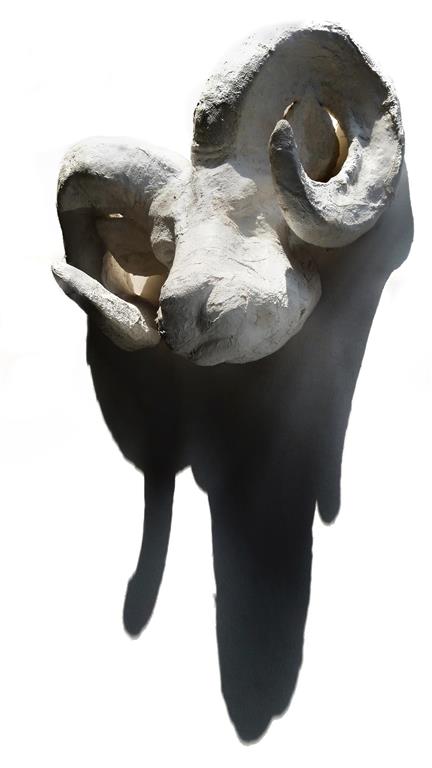

This section presents a curated selection of emails I have received since beginning my research on the O.T.O. Phenomenon in 1985. This compilation includes correspondence from 1996 to 2000, alongside comparable accounts. These emails offer valuable insights into the motivations behind individuals' decisions to join — or abstain from joining — the O.T.O. By examining these perspectives, the collection contributes to a broader understanding of the organization and its appeal across different individuals. Ultimately, this selection illuminates the diverse and often complex factors that influence one's engagement with the O.T.O. 

Paper correspondence, 1985–1996. 
Archive of documents, manuscripts, and internal records, 2000. 

Archive of documents, manuscripts, and internal records, 2024. |
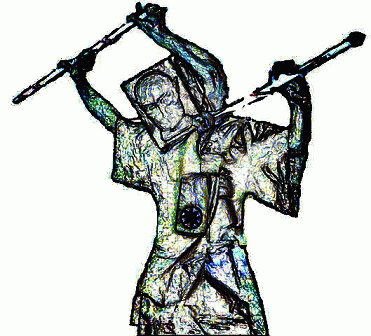
Le Phénomène Ordo Templi Orientis. Exposé en français. |
Navigation
MP3 / YouTube recordings: The voices of prominent figures such as Marcelo Ramos Motta, Oscar Schlag, W.W. Webb, Michael P. Bertiaux, Annemarie Aeschbach (the female successor to OHO H.J. Metzger in Switzerland), and a grandson of Carl Kellner who offers personal recollections of his grandfather are presented. Photographs and Documents: A compilation of photographs and documents highlighted through the Bing search engine, showcasing notable figures such as Carl Kellner, Theodor Reuss, Arnoldo Krumm–Heller, Marcelo R. Motta, and Oscar Schlag, alongside charters, letters, manuscripts, and other archival materials. What's New? A comprehensive list of new content, revisions, and corrections, updated regularly since March 2000. 
My intent is to piece together parts of the O.T.O. phenomenon like a puzzle. If you have any annotations, corrections, suggestions, or complaints, please do not hesitate to contact me: mail. Rechtlicher Hinweis. © Peter–Robert Koenig on–line since April 1996.
Avoid the fate of Gregor Samsa — regular visits to this
site will keep unsightly metamorphoses at bay.
|
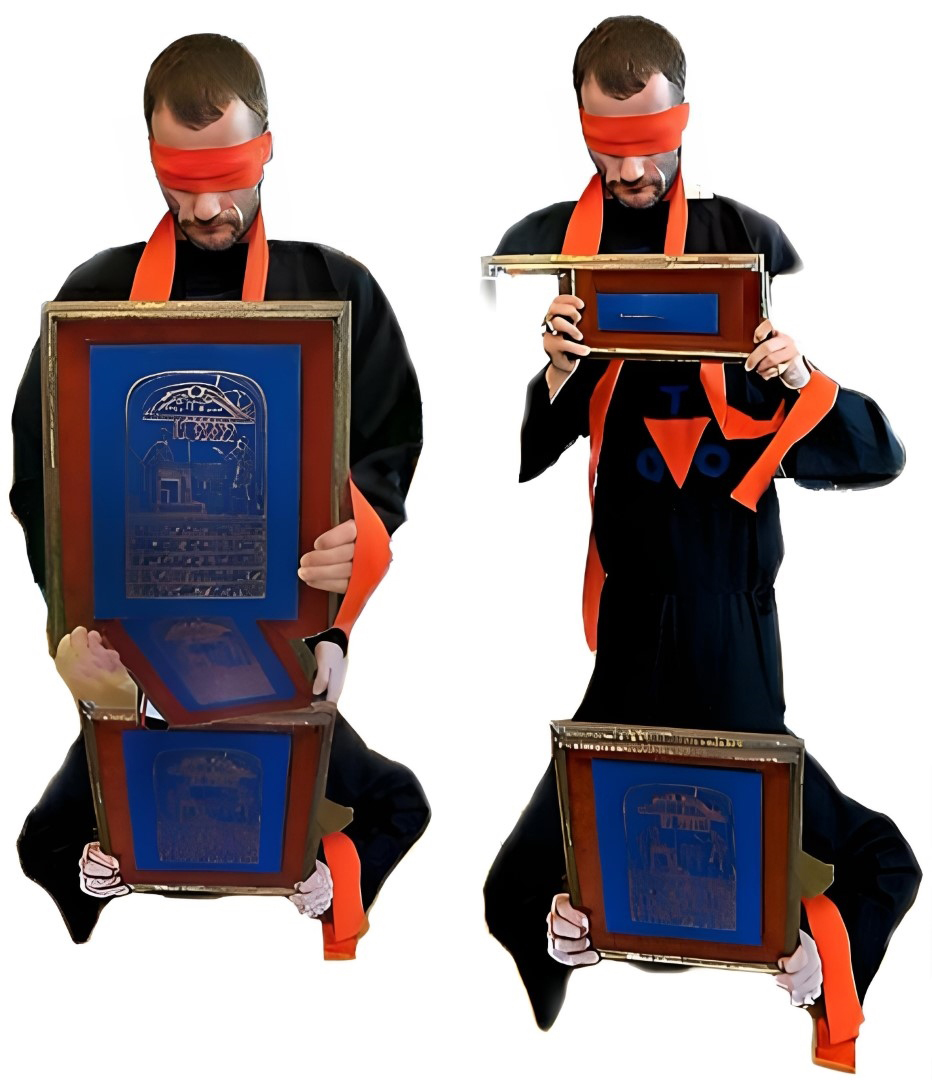
|
|
|
|